Shows
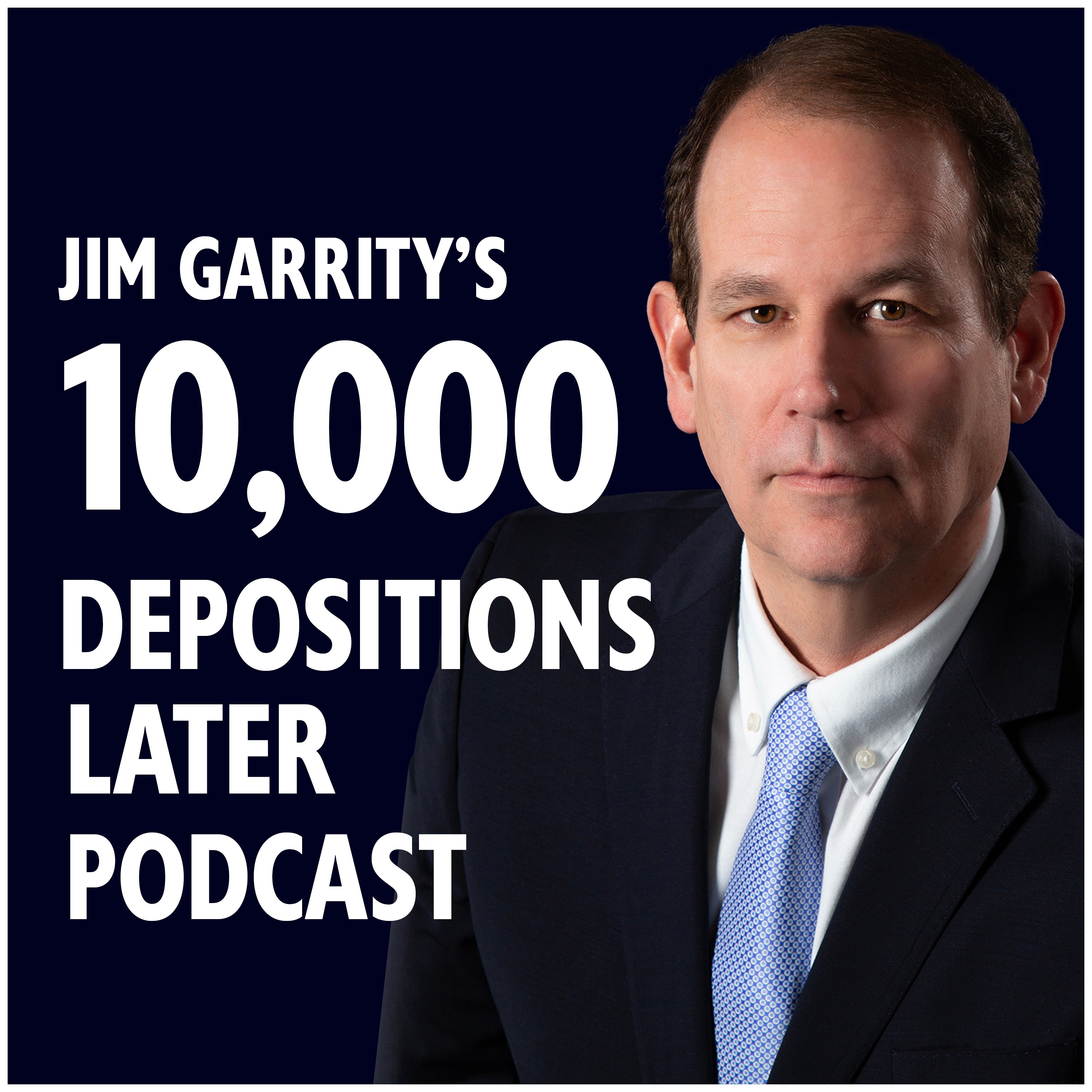
10,000 Depositions Later PodcastEpisode 164 - In-Person Depositions Are Making a ComebackThey're baaaaack! In-person depositions, that is. In this episode, Jim Garrity discusses two brand-new court rulings that reflect a growing trend among judges to enforce noticed in-person depositions of parties and key witnesses. It's a subtle but striking shift away from remote depositions, which took root during the COVID pandemic. Jim discusses the rulings in detail, as well as an interesting observation by an Illinois federal judge about the behavioral psychology that favors face-to-face confrontations. Finally, Jim offers practical guidance on arguments to make for and against remote depositions in your cases, including the two most powerful arguments to...
2025-11-1115 min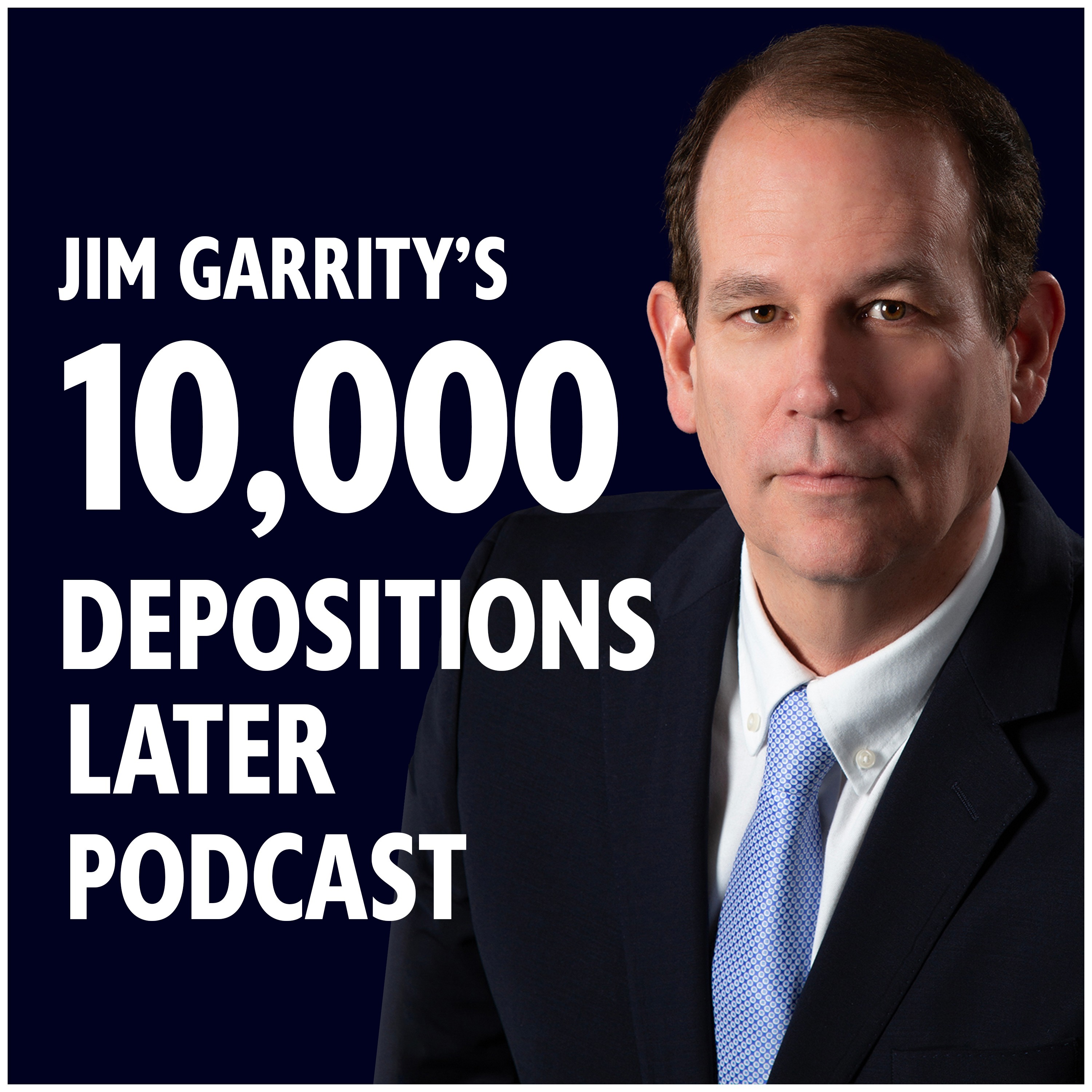
10,000 Depositions Later PodcastEpisode 161: Unfinished Testimony - Can You Use That Partial Transcript?Today, Jim Garrity examines a critical issue in trial practice: whether an incomplete deposition—cut short when the deponent becomes unavailable—can be admitted at trial, particularly when the opposing party had no opportunity for cross-examination. Drawing on a new Sixth Circuit Court of Appeals decision and Rule 32 of the Federal Rules of Civil Procedure, Jim explores the court’s decision, the key factors trial lawyers should argue for or against exclusion, and the balancing test that should be used when essential testimony hangs in the balance. Discover practical strategies for both offering and opposing use of incomplete deposition transc...
2025-09-1116 min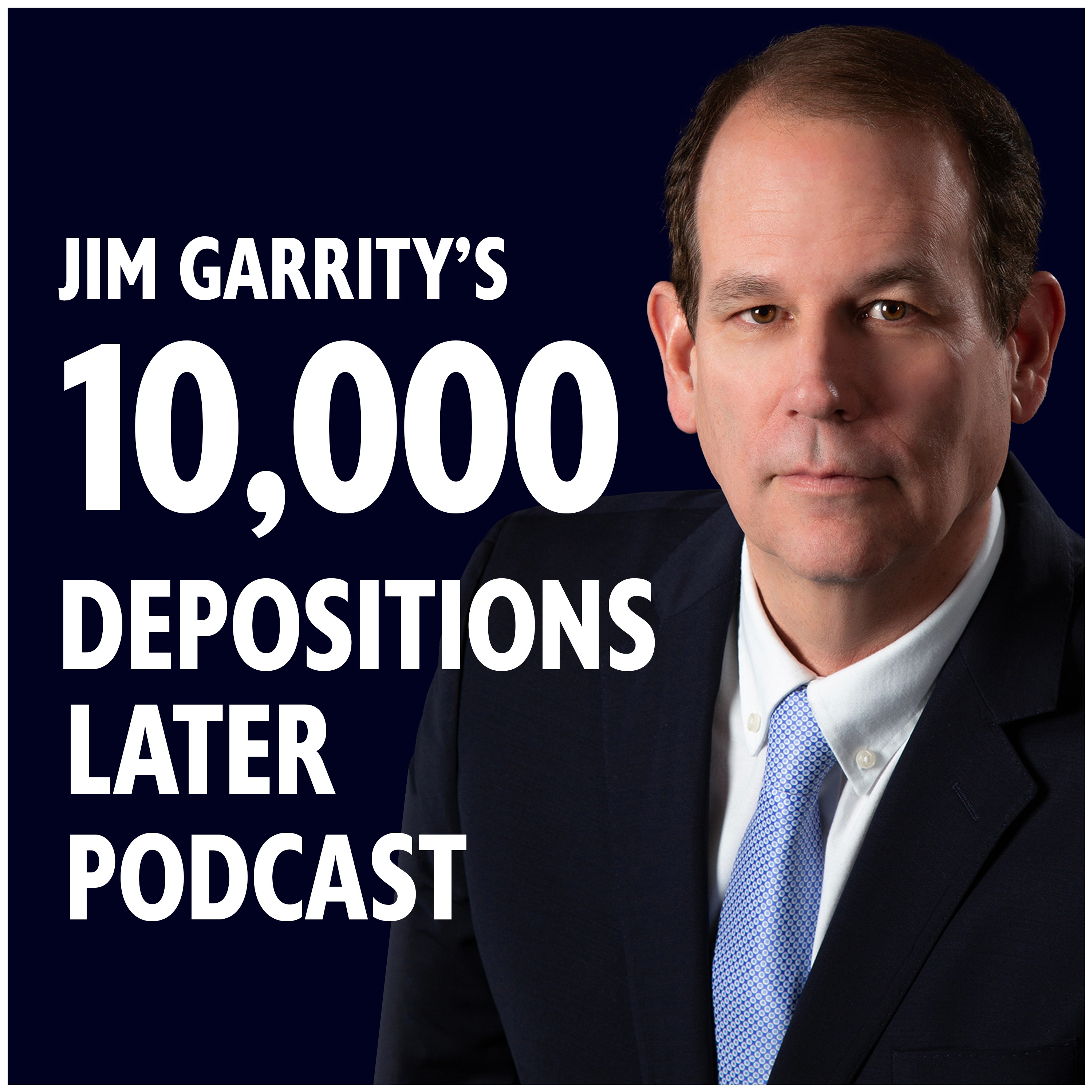
10,000 Depositions Later PodcastEpisode 158 - Using Videotaped Deposition Clips in Openings and ClosingsIn this episode, Jim Garrity argues for more frequent videotaping of depositions, especially those of parties and witnesses likely to be unavailable at trial. The reason? Unlike live witnesses - who are generally called once in trial - videotaped testimony can be played two or more times. This technique utilizes one of the most effective tools of persuasion ever invented, repetition, borrowed straight from Madison Avenue, where repetition is everything. Clips played during the trial, during closing, and sometimes in opening by consent or court order, allow you to essentially present the same witness and testimony multiple times. This...
2025-07-0313 min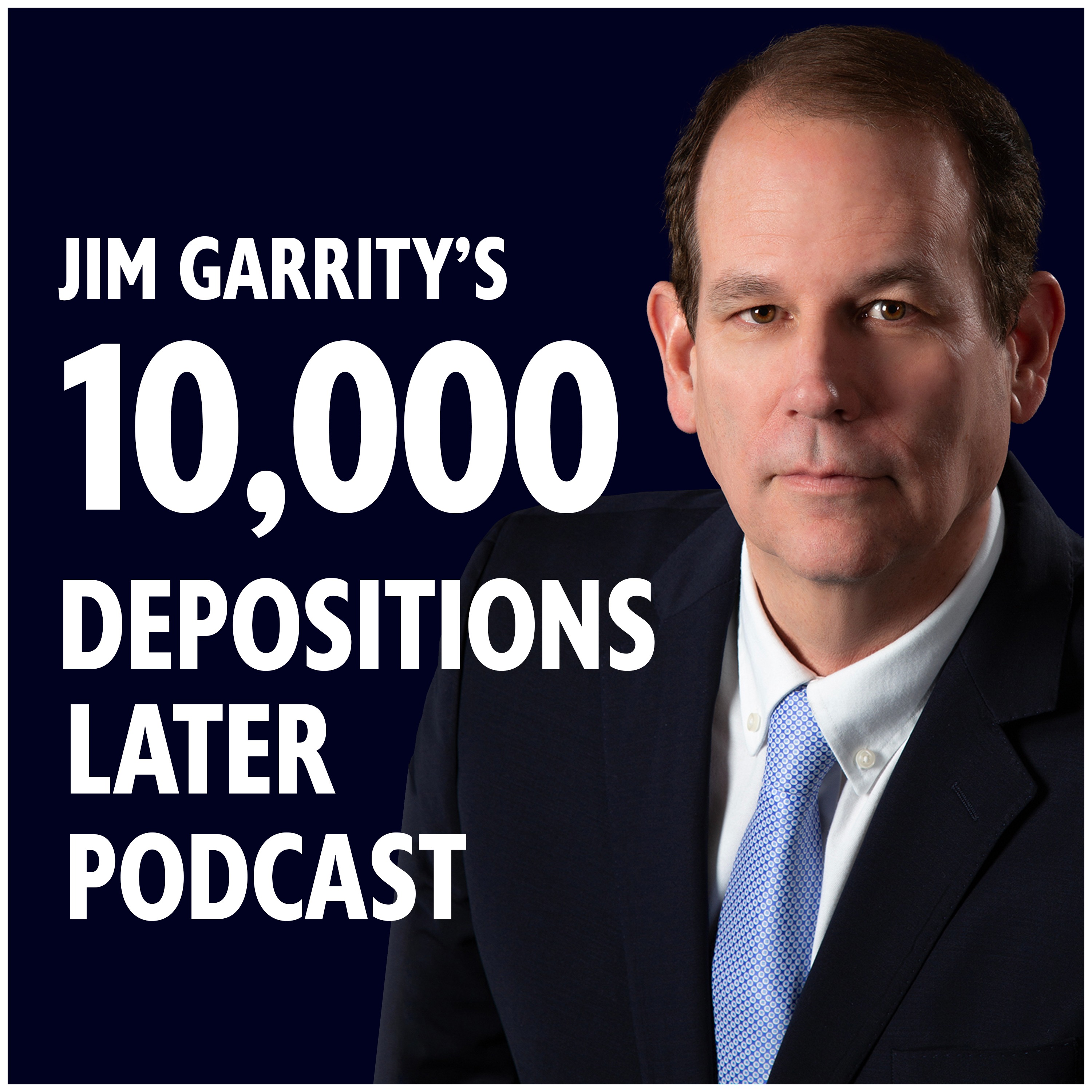
10,000 Depositions Later PodcastEpisode 156 -Leveraging Device Demonstrations In Depositions: Lessons From The Uber LitigationTraditionally, litigators seeking to understand an individual's or organization's devices - specifically, how they store, access, manage, and delete information - have either asked a deponent to testify from memory or arranged for a costly forensic inspection instead. In this episode, Jim spotlights a fantastic middle ground: requiring a deponent (individual or 30(b)(6) rep) to bring their devices to the deposition and demonstrate their functions and programs or apps during a videotaped examination. This technique was just approved by a federal judge in a pending class action against the ride-sharing company Uber. It's one all litigators should be using...
2025-05-2417 min
10,000 Depositions Later PodcastEpisode 151 - Lessons from the Front Lines: Using Deposition Transcripts From One Case as Affidavits in OthersIn this episode, Jim Garrity spotlights a new ruling on a little-known but powerful tool: the use of depositions as affidavits. As Garrity discusses, a deposition does not need to meet the requirements of trial-oriented Fed. R. Civ. P. 32 (which requires a showing that the party against whom the deposition is offered had notice and a chance to examine the deposition) when it is offered in proceedings that allow testimony by affidavit, such as at summary judgment.SHOW NOTESSurety v. Co. v. Dwight A. Herald, et al., Case No. 1:23-cv-00086-GNS-HBB, 2025 W...
2025-03-0410 min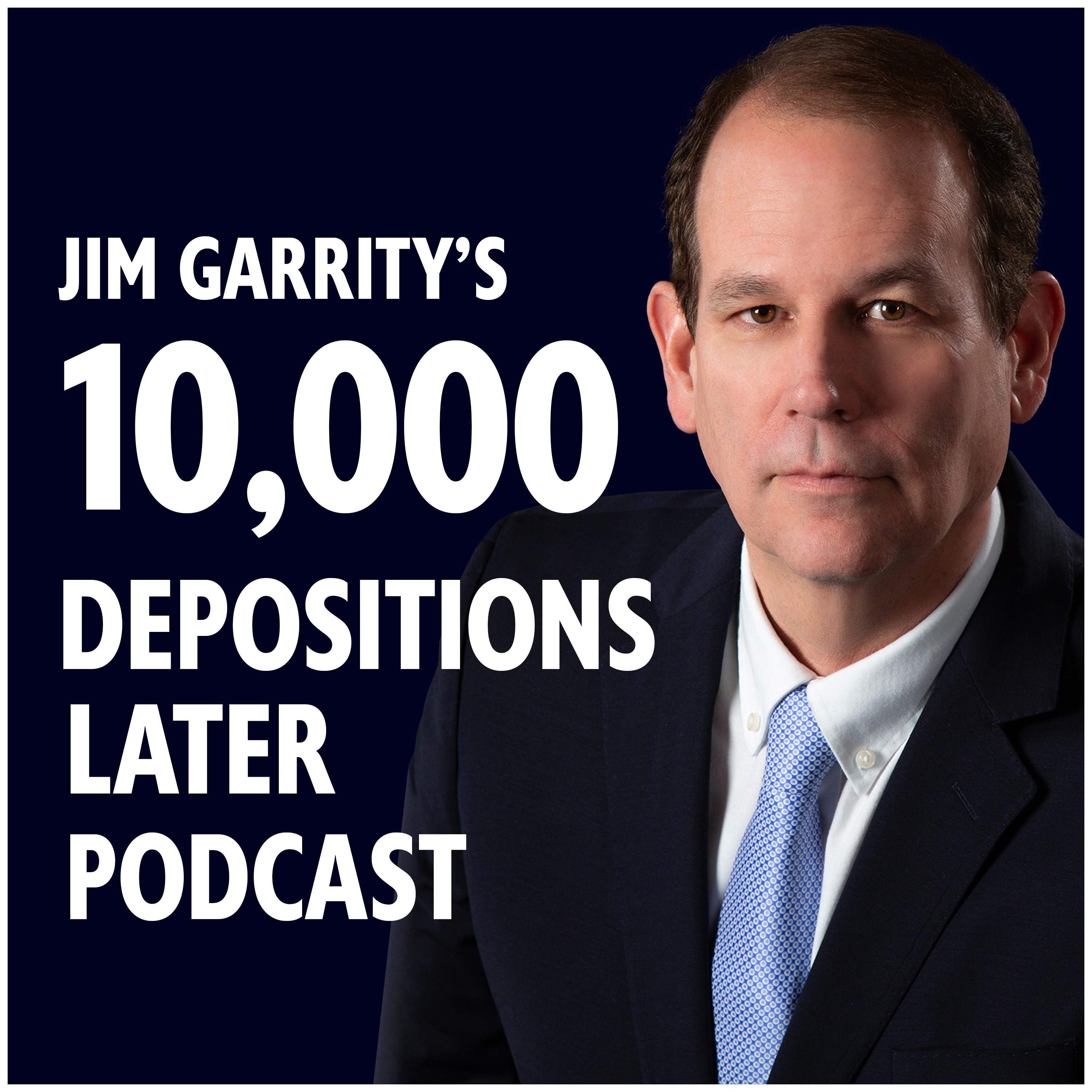
10,000 Depositions Later PodcastEpisode 148 - Revisiting the Problem of Examiners Who Interrupt Your Deponents' AnswersToday Jim Garrity revisits the headaches caused by examining lawyers who frequently interrupt your deponents' answers. To combat this problem, Garrity offers you a six-pronged strategy for stopping this practice and/or creating a strong record that will allow your deponents to later add materially to their interrupted testimony, whether by errata sheet, affidavit, or live testimony. Courts are far more likely to allow that where you've used Garrity's strategies. (By the way, if you have a moment, would you send our production team a small "thank you" by leaving us a five-star rating wherever you listen to our...
2025-01-0416 min
10,000 Depositions Later PodcastEpisode 144 - Narrative Objections Aren’t Necessarily “Speaking Objections” or CoachingToday Jim Garrity tackles the topic of narrative objections, which are objections that go beyond a simple "Form!" or "Objection!" and provide a concise explanation of the grounds for the objection. Some litigators see anything beyond a single word as a speaking objection or as coaching, but that's not so. Jim untangles the spaghetti in this episode.(By the way, there are a total of 12 cases and rules listed in the show notes. If you don't see them all, click through to our podcast page, and you'll find them there. Some hosting sites truncate show notes to...
2024-11-0621 min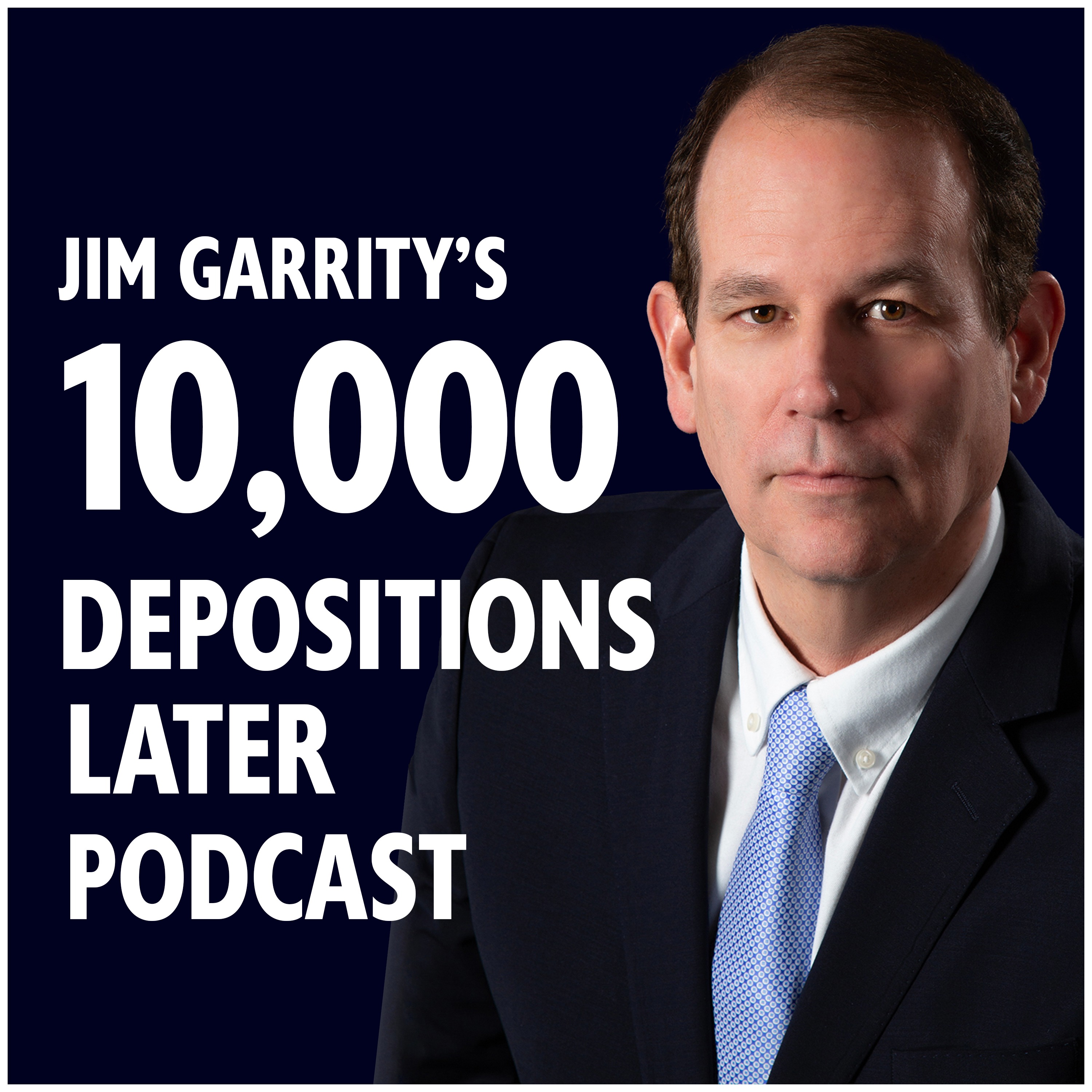
10,000 Depositions Later PodcastEpisode 142 - Deposition Protocol StipulationsIn this episode, Jim Garrity discusses deposition protocol stipulations, which are agreements between the parties that establish the framework for noticing and conducting depositions. They're common in class-action and multi-district cases, but they're useful - and underutilized - in ordinary litigation as well. They can also be used to create internal deposition guidelines for law firms and legal organizations. Jim lists about three dozen common provisions in such agreements and offers practice tips on proposing and implementing them. Have a listen!SHOW NOTESStipulation and Order Governing Protocol for Fact Depositions and Rule 30(b)(6)/PMQ...
2024-07-1717 min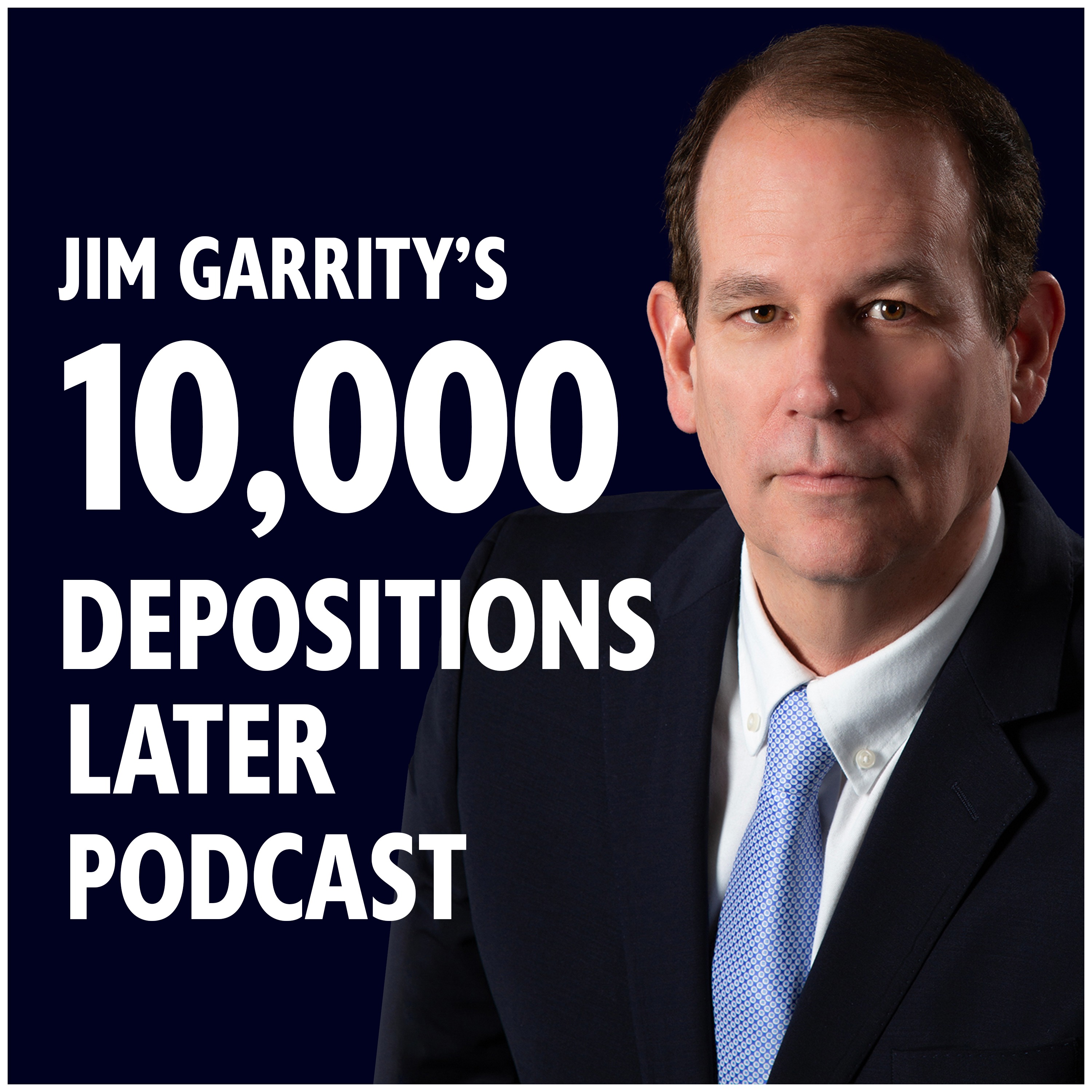
10,000 Depositions Later PodcastEpisode 122 - Lessons from the Front Lines: The Overuse of An Underused 30(b)(6) Technique Leads to Severe SanctionsIn this episode, Jim Garrity talks about a new federal appellate decision that affirmed severe sanctions against a party whose lone designated 30(b)(6) representative largely read from lengthy, lawyer-scripted statements, and who was often unable to answer questions without regurgitating the prewritten information. The “scripts” ran hundreds of pages, and the witness sometimes read from them for as much as 45 minutes at a time. Memory aids or notes are an acceptable testimonial aid for 30(b)(6) witnesses – who are often called on to testify about matters for which they have no personal knowledge – but Garrity says there’s a better way to prepa...
2023-06-2217 min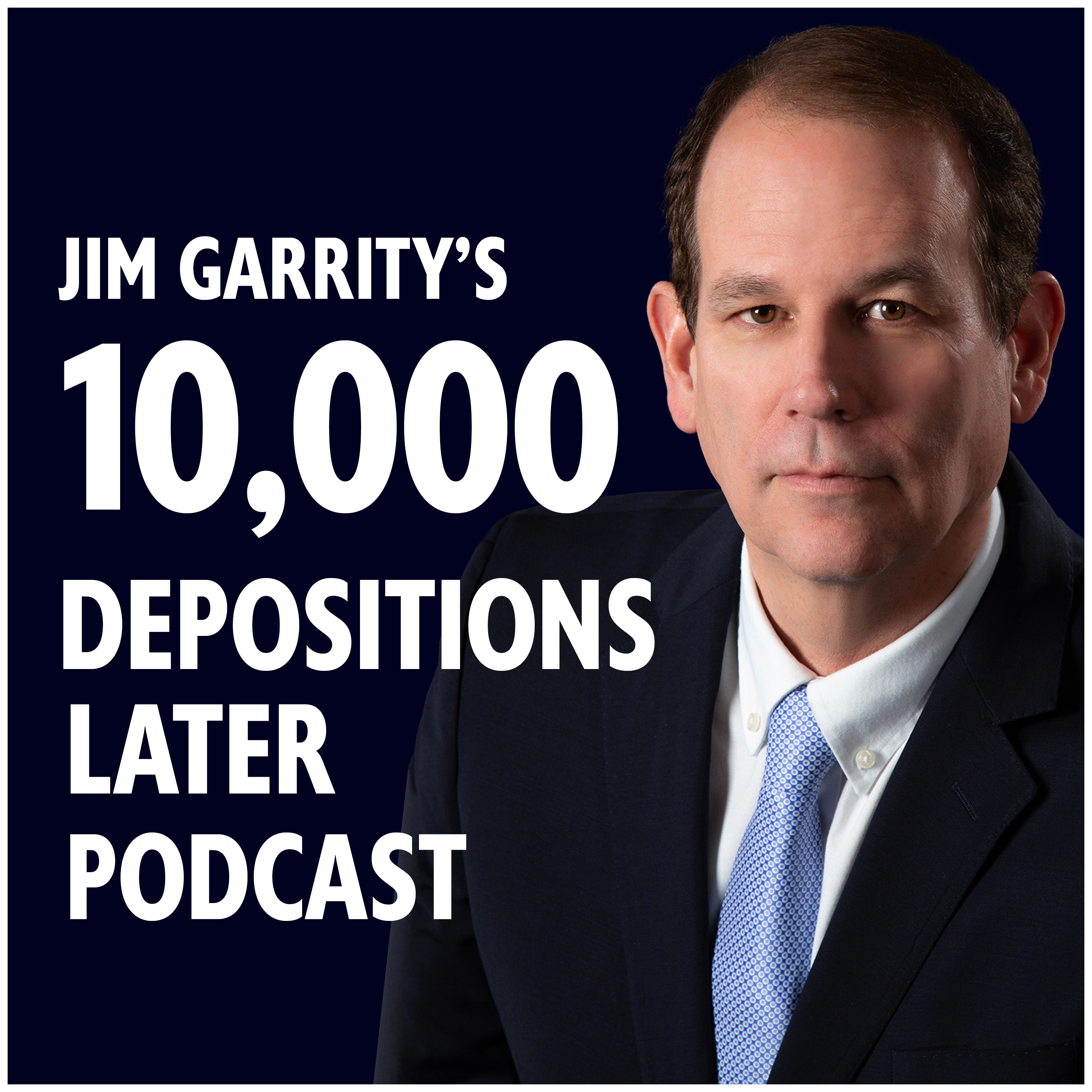
10,000 Depositions Later PodcastEpisode 119 -Lessons from the Front Lines: The (Very) Fine Line Between Reserving the Right to Read – And Waiving ItIn this episode, Jim Garrity discusses a brand new court ruling where a judge held that requests to review a transcript before it's finalized must be made before the deposition is completed, failing which the request is untimely, even if made immediately after the deposition concludes. The order says defense counsel claimed to make the "read request" after the reporter announced "We're off the record" but while the reporter and all counsel were still logged in on a Zoom link. Even so, the court said, that's too late. Garrity talks about the significance of the ruling, and offers practice...
2023-04-3013 min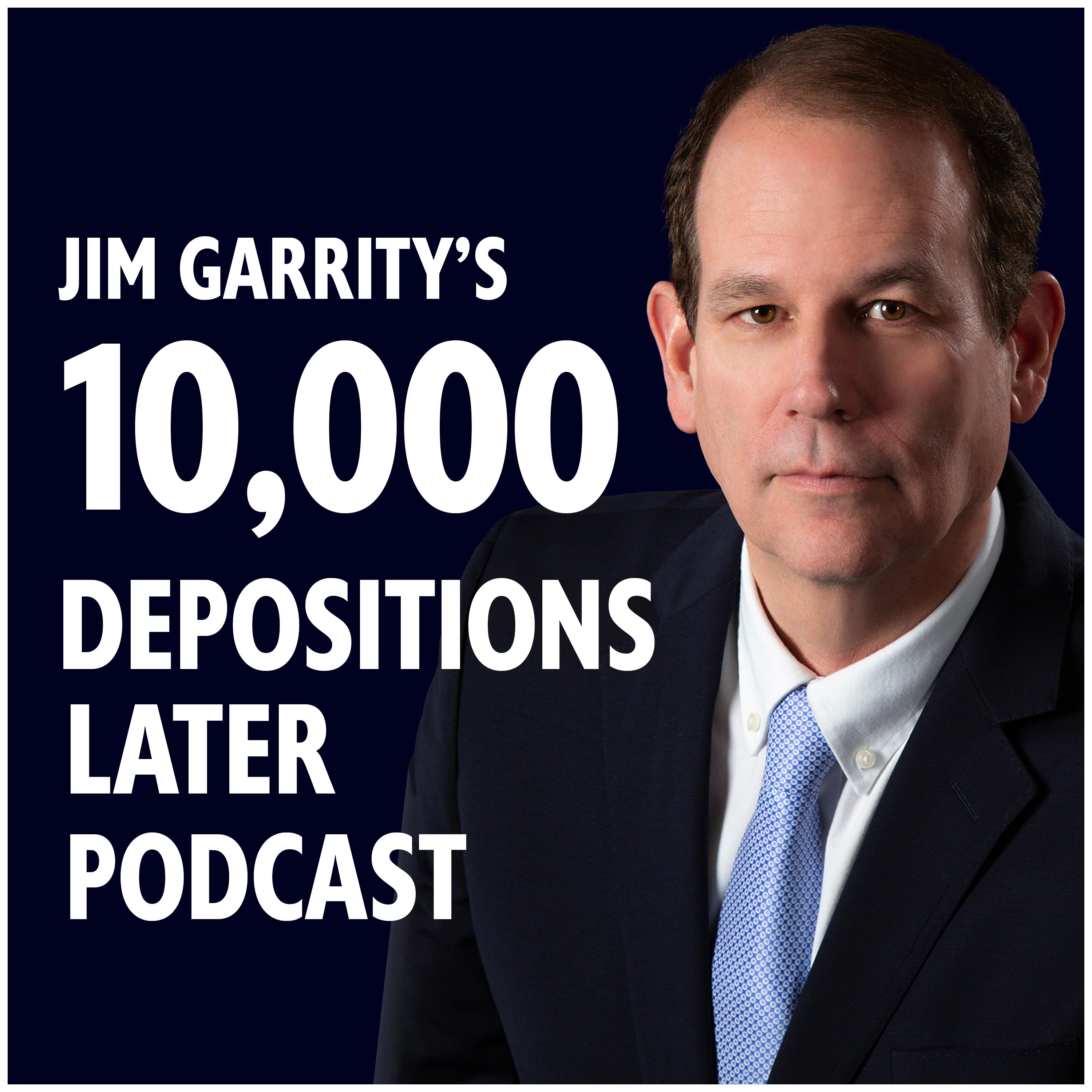
10,000 Depositions Later PodcastEpisode 118 -The (Relatively) Low Bar for Limiting the Non-Judicial Use of Deposition Transcripts & RecordingsIn this episode, Jim Garrity discusses the “good cause” standard for seeking a protective order limiting the use of deposition transcripts and recordings beyond the pending case. Some judges continue to misapply the applicable standard for such protective orders. Garrity talks about one such ruling, just issued, that once again applied an outdated and legally erroneous standard. Given the ease with which deposition transcripts and recordings can be instantly posted online - and in light of the fact that many parties and foes do exactly that - Garrity argues that you should actively and routinely consider the use of a prot...
2023-04-2217 min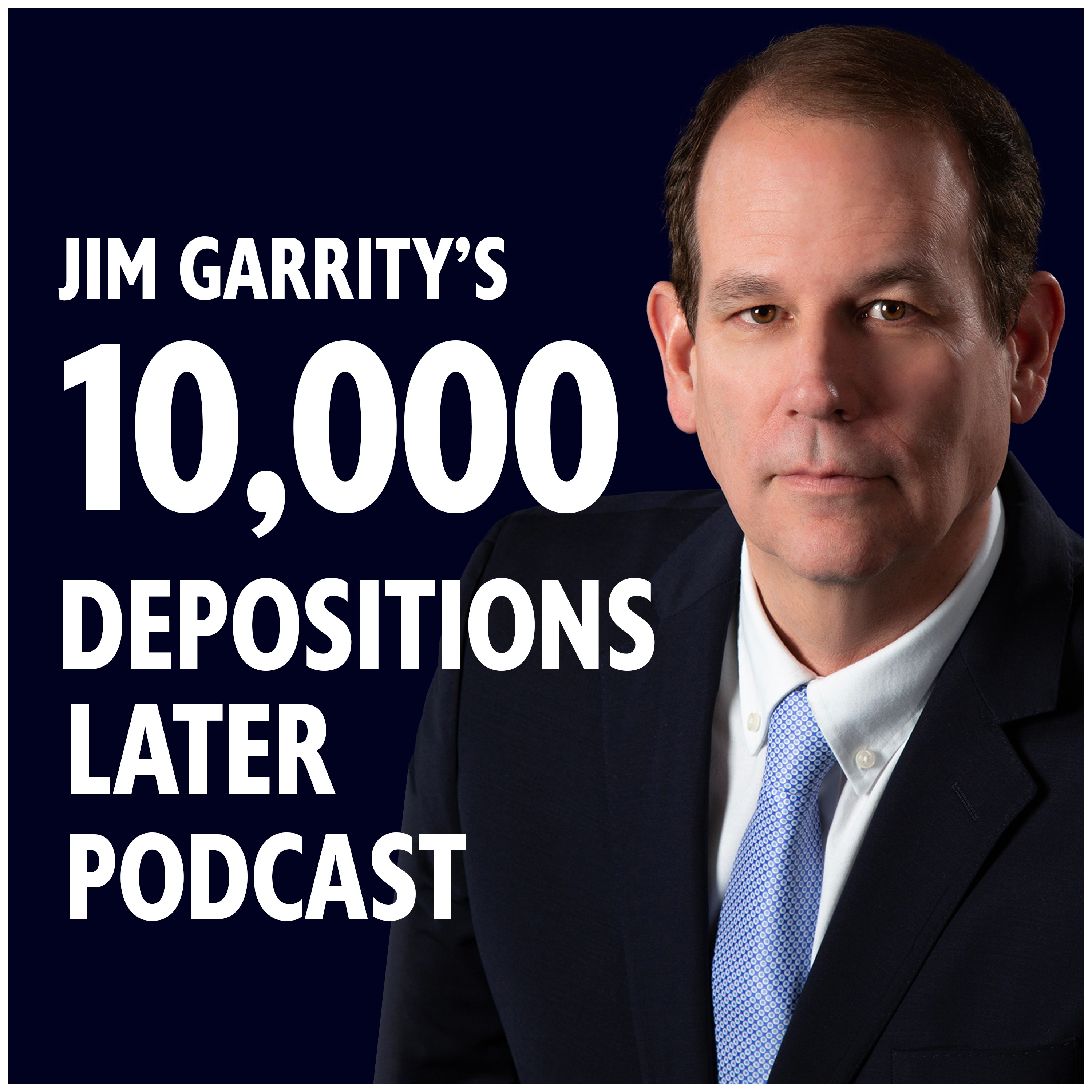
10,000 Depositions Later PodcastEpisode 117 - Asked and Answered: How Many Times is Too Many?In this episode, Jim Garrity tackles the frequent problem of repetitive questions in depositions, and answers the questions "How many of the same questions is too many? What factors should I consider in deciding whether the repetition has transitioned into harassment? And at that point, what do I do?" As always, Jim offers practice tips, identifies the legal grounds for "asked and answered" objections and for instructing deponents not to answer repetitious questions. And don't forget the show notes, full of great cases to illustrate the point.SHOW NOTESSiefert, et al. v. Hamilton County...
2023-04-1228 min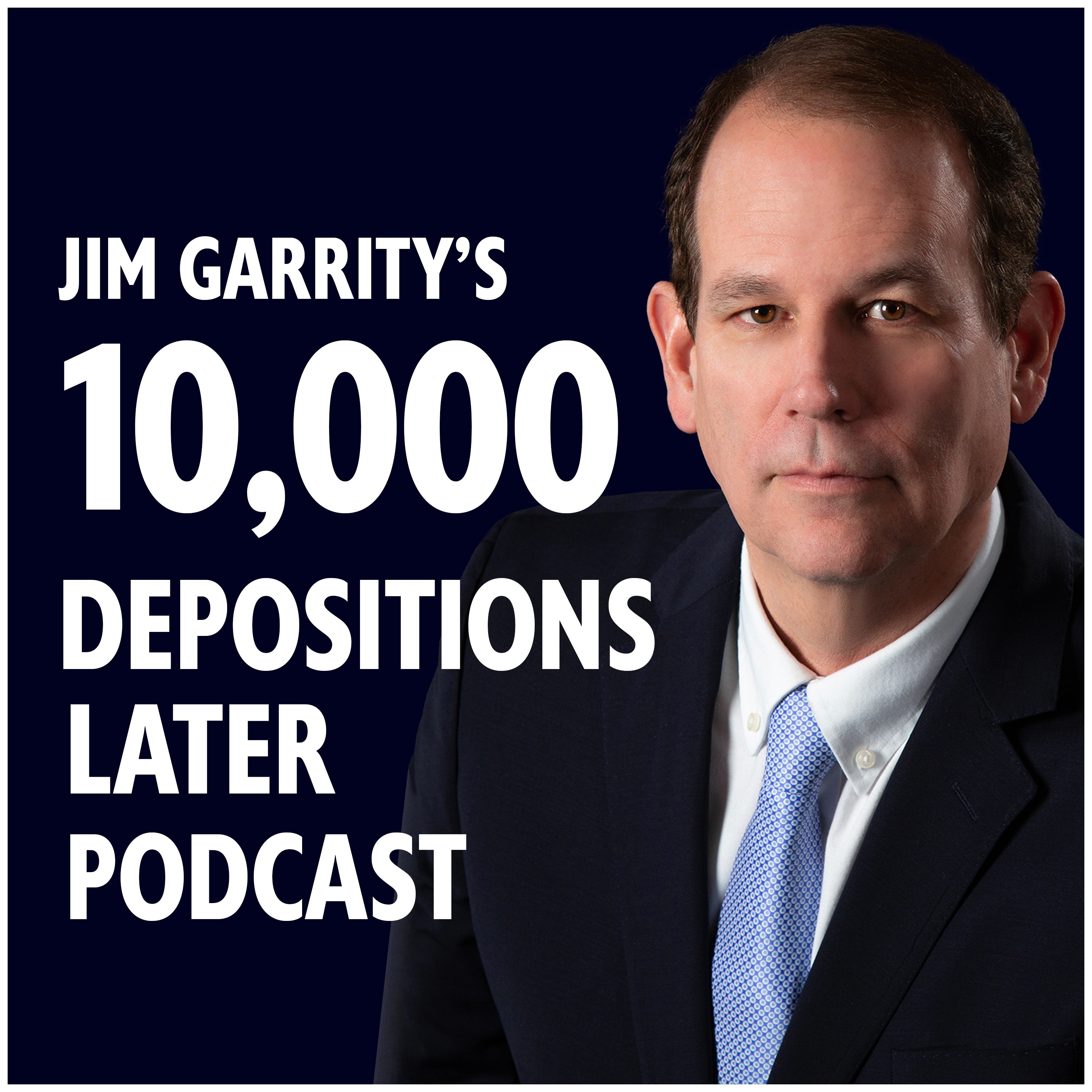
10,000 Depositions Later PodcastEpisode 115 - Announcing Our 4th Edition Book Giveaway ($5,000 total value!)In this episode, Jim Garrity and the publisher announce a $5,000 book giveaway - of the newly-release 4th edition of 10,000 Depositions Later - exclusively for our podcast listeners. Garrity explains how to score your free copy of the $70 book in this short episode.
2023-03-0908 min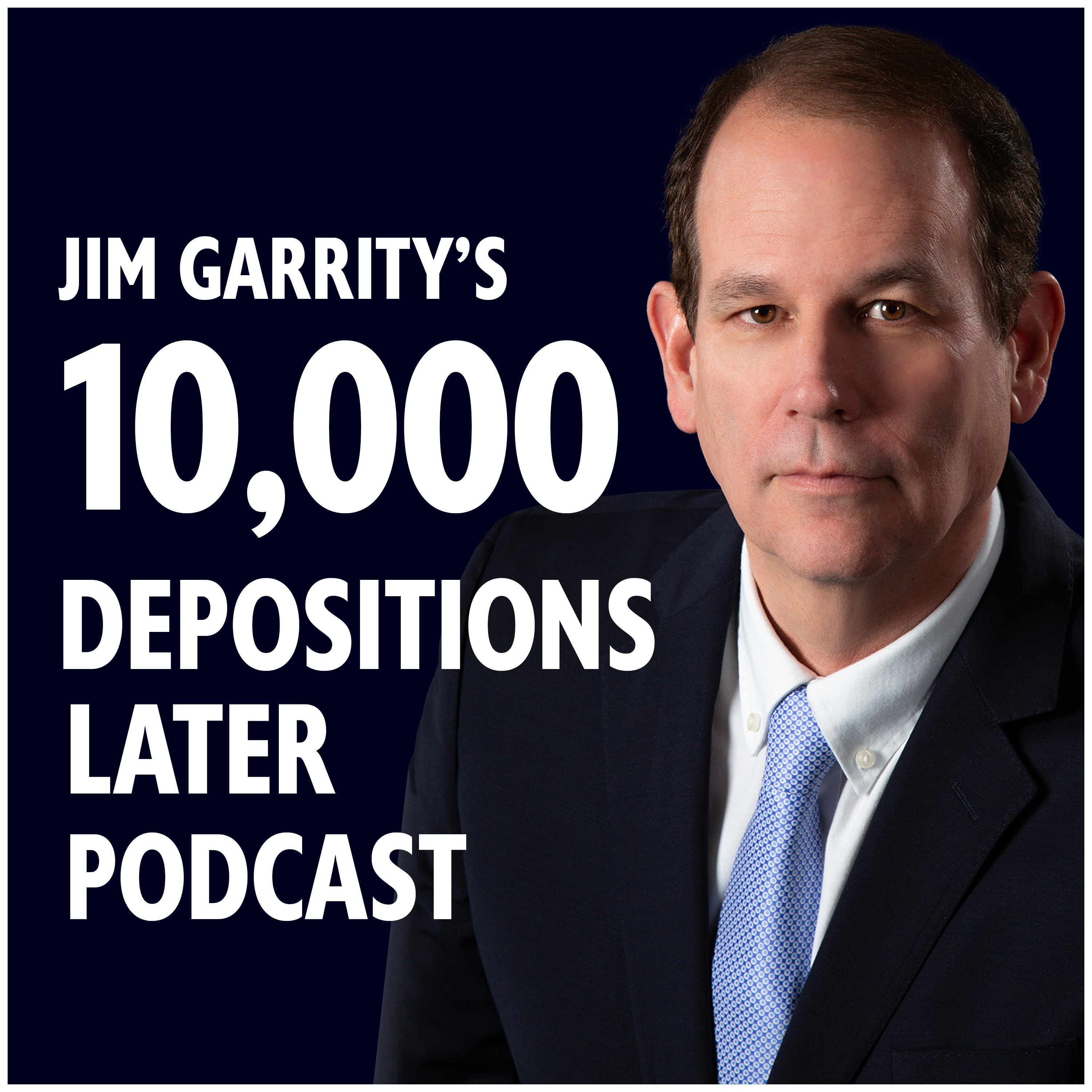
10,000 Depositions Later PodcastEpisode 113 - Instant Privilege Loss in DepositionsIn this episode, Jim Garrity addresses the risk of instant privilege loss - attorney-client, work-product, or any other privilege - in depositions, absent immediate objection and an instruction not to answer (and an immediate demand for return of privileged documents, if applicable). He discusses a decision where a court found that a plaintiff waived the attorney-client privilege by answering just three questions over two minutes, because there had been no objection or instruction not to answer by the plaintiff's counsel.By the way, have you checked out the 4th edition of Jim Garrity's blockbuster practice handbook on...
2023-02-2216 min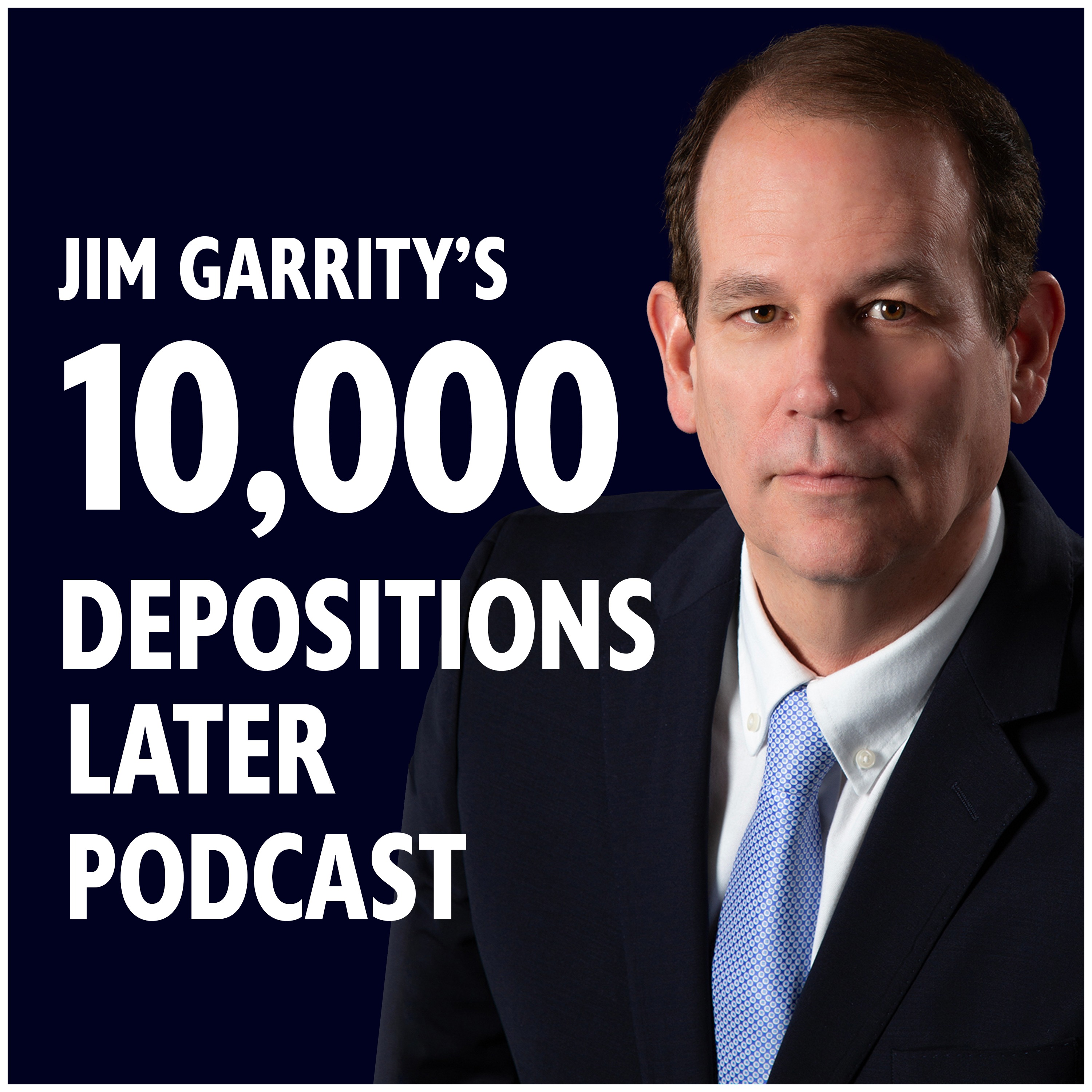
10,000 Depositions Later PodcastEpisode 112 -Lessons From The Front Lines: Plaintiffs Fined $100,000 For Arranging Surreptitious Recording of Remote Live Depo FeedHow often are lawyers, deponents, and other participants surreptitiously recording depositions, including conversations during breaks that are meant to be private or privileged? Jim Garrity reports on this troubling conduct and surmises that it happens a lot more than many realize. As always, Garrity offers practice tips at the end of the episode, and our research on the topic appears in the show notes below. Thanks for listening!SHOW NOTESDefendant’s Second Motion for Terminating Sanctions (filed Sept. 29, 2020), Plaintiffs’ Opposition to Defendant’s Second Motion for Terminating Sanctions (Redacted) (filed Jan. 28, 2021), and Findings of Fact...
2023-02-1624 min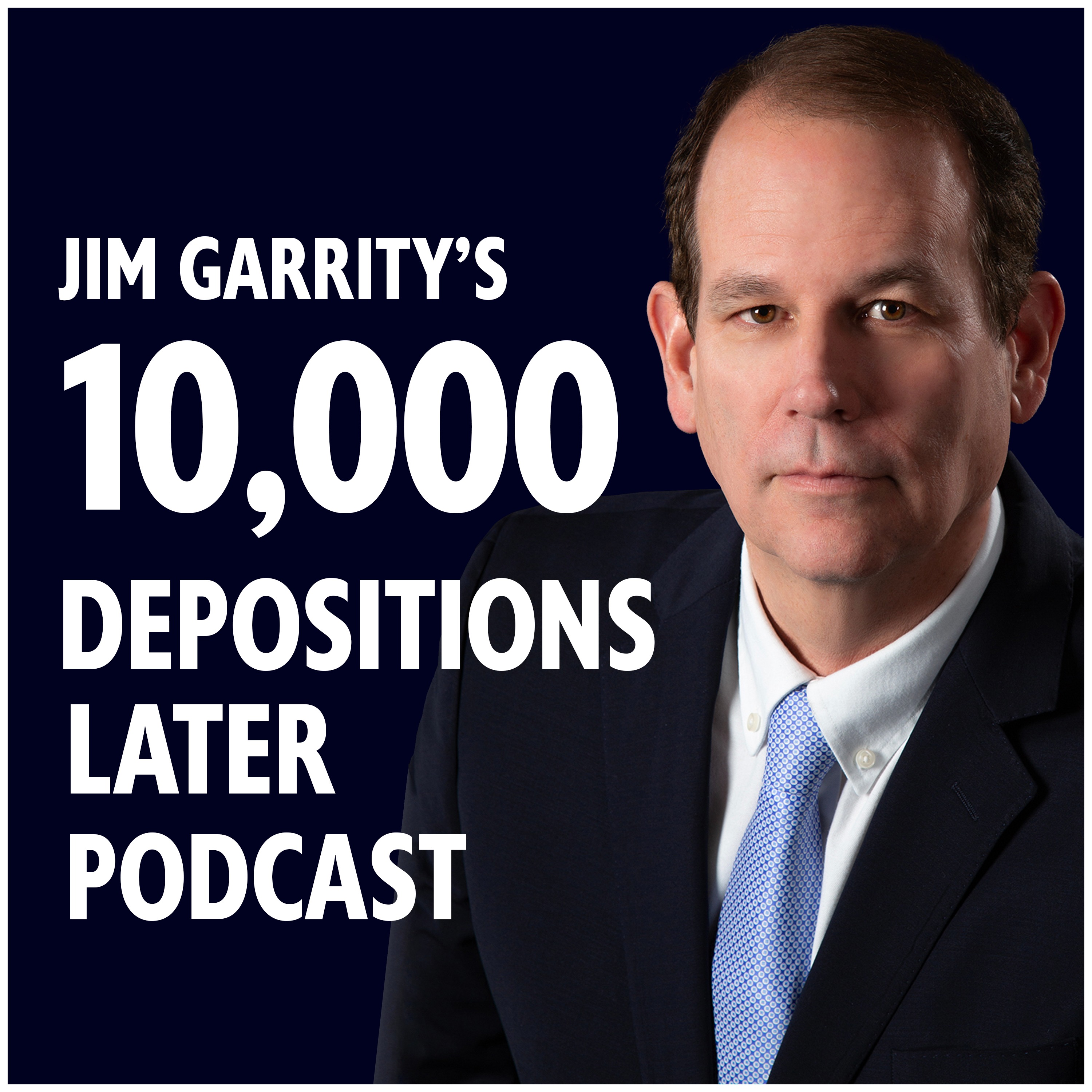
10,000 Depositions Later PodcastEpisode 111 -Lessons From The Front Lines: Another Reason To Choose Your 30(b)(6) Designees CarefullyIn this episode, Jim Garrity discusses a new summary judgment ruling against a company based in part on testimony by its 30(b)(6) designee that was outside the scope of the designee's topics. The ruling highlights the risk of choosing designees who possess personal knowledge well beyond the topics about which they will testify. Garrity offers practice tips for litigators on both sides of this issue - for those who select, prepare, and defend 30(b)(6) designees, and for those who schedule and depose them. The citation for the ruling appears in the show notes below. Thanks for listening!...
2022-12-3119 min
10,000 Depositions Later PodcastEpisode 110 - "Are You Calling Them A Liar?"In this episode Jim Garrity tackles the propriety of a question often heard in depositions when the deponent has just contradicted the testimony of another witness: "Are you calling them a liar?" Is this objectionable? If so, what's the objection? If it's objectionable and you don't object, is it per se reversible error? Is there a better way to ask the question? So many questions, so little time. But Jim answers them all and more, in just 13 1/2 minutes. (And speaking of time, do you have time to leave a 5-star rating for our podcast wherever you listen to our...
2022-12-1613 min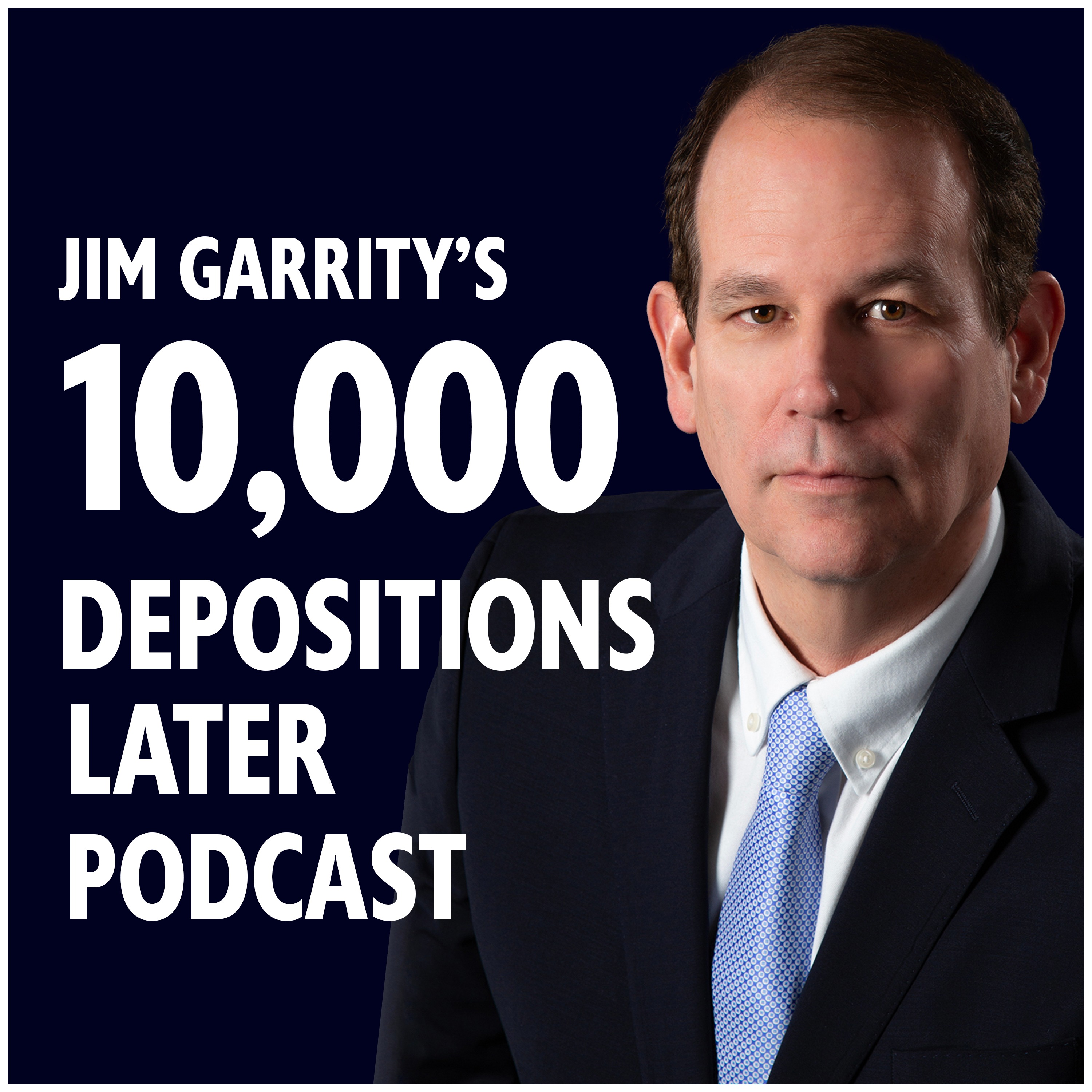
10,000 Depositions Later PodcastEpisode 108 - 32 Factors to Argue (For or Against) In Deposition Location DisputesIn this episode, Jim Garrity alerts you to a federal decision where the judge catalogued thirty-two factors that courts should consider in resolving disputes about where depositions should take place. It's an excellent decision to have in your arsenal. To this list, Garrity lists several more common location-related things to consider.SHOW NOTES:DeepGulf, Inc. v. Moszkowski, 330 F.R.D. 600 (N. D. Fla. Jan. 30, 2019) (listing 32 factors judges should consider when resolving disputes about where depositions should take place)
2022-10-3108 min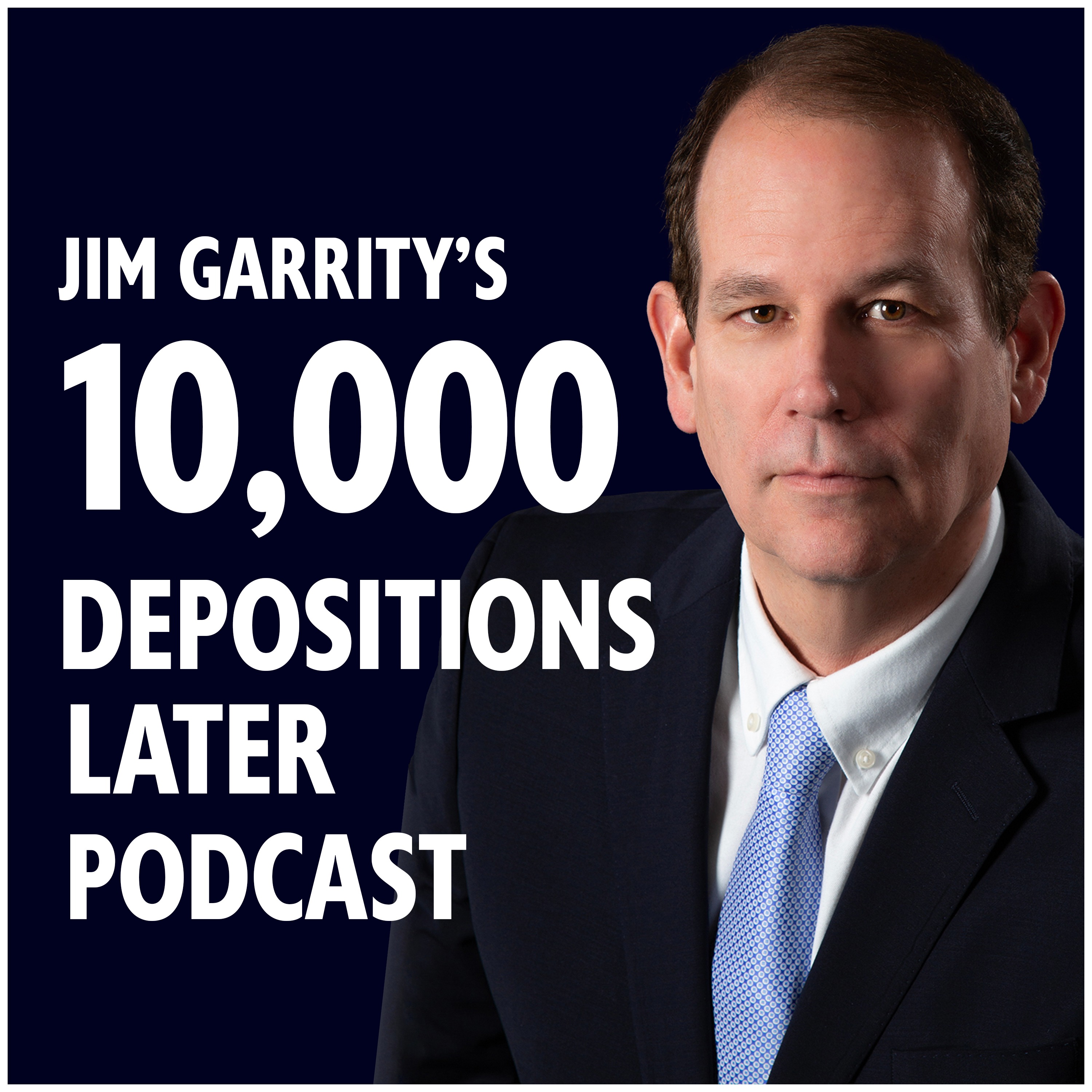
10,000 Depositions Later PodcastEpisode 106 -A Killer Option for Choosing Potent 30(b)(6) DesigneesIn this episode, Jim Garrity offers up a clever idea for turning your skills in choosing 30(b)(6) designees into a deposition superpower. On the flip side, Garrity shares ideas on how to use this same principle to gain compliance from organizations that resist and delay your efforts to set corporate representative depositions. As always, the research on which this episode is based appears in the show notes below. Last point: Do you have 60 seconds to leave us a 5-star review, wherever you get your podcast episodes? These episodes are ad-free, so the only way you can really say thanks i...
2022-10-1411 min
10,000 Depositions Later PodcastEpisode 104 - What to Do About Incomplete Answers Caused by Interrupting Examiners?In this episode, Jim Garrity addresses the problem caused by litigators who repeatedly interrupt your deponents’ answers, potentially resulting in a transcript full of half answers. It's a common and serious headache for defending lawyers, and you can only fix the problem one of two ways - either during the deposition, or through an errata sheet. Garrity explains the pluses and minuses of using an errata sheet to complete interrupted answers, and tells you what courts have to say about that approach. He then offers practical tips for addressing repeated interruptions during the deposition itself, and identifies four steps to fix...
2022-09-1921 min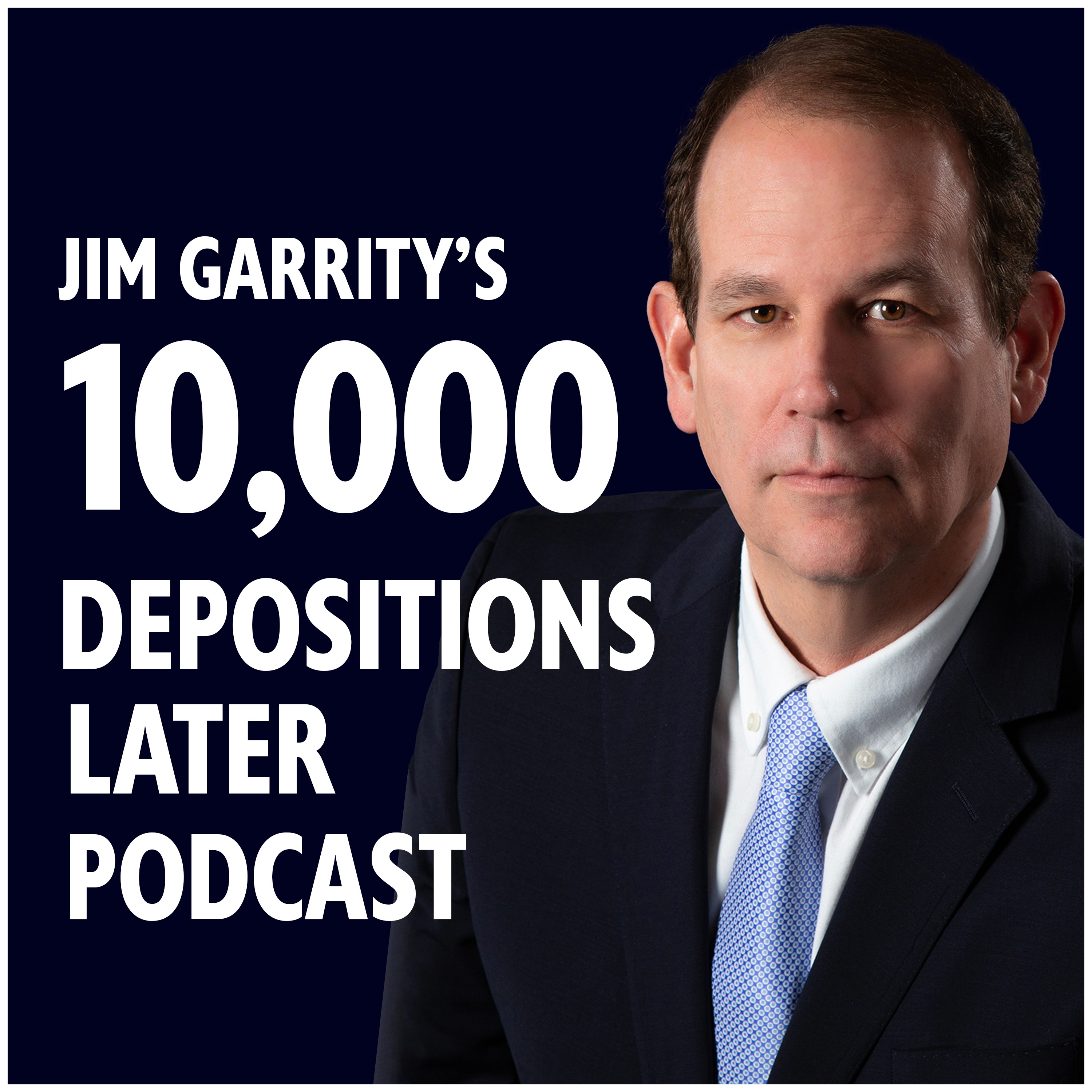
10,000 Depositions Later PodcastEpisode 103 -Lessons From The Front Lines: What Will 317 “Don’t Knows,” and 196 “Don’t Remembers,” Earn Your Client? (Hint: It Involves Jurors.) In this episode, Jim Garrity spotlights a 107-page ruling, issued just three days ago, that offers a sharp reminder about the consequences to deponents who claim memory failure and who then follow up, at summary judgment time, with affidavits or errata sheets containing fantastically-improved recollections of key details. Garrity also discusses another brand-new ruling, likewise issued three days ago, that makes the same point. As always, he offers practical tips and insights - here, to help you avoid the fate suffered by litigants in those cases, which was to have their post-deposition affidavits, errata sheets, and declarations stricken....
2022-09-0420 min
10,000 Depositions Later PodcastEpisode 102 - Lessons From The Front Lines: When Suspending Or Terminating A Deposition in Progress Due to Misconduct, Don’t Forget to Say ThisThere's definitely a right and a wrong way to terminate or suspend a deposition in progress on the grounds it is being conducted in bad faith, or in a manner that unreasonably annoys, embarrasses, or oppresses the deponent or party. In this episode, Jim Garrity spotlights a new court ruling imposing sanctions against a party who failed to do it correctly. As always, Garrity offers you practical guidance, here about exactly how to suspend or terminate a deposition and seek court relief in a way that complies with the governing rule.(While you're here, can we ask yo...
2022-08-2411 min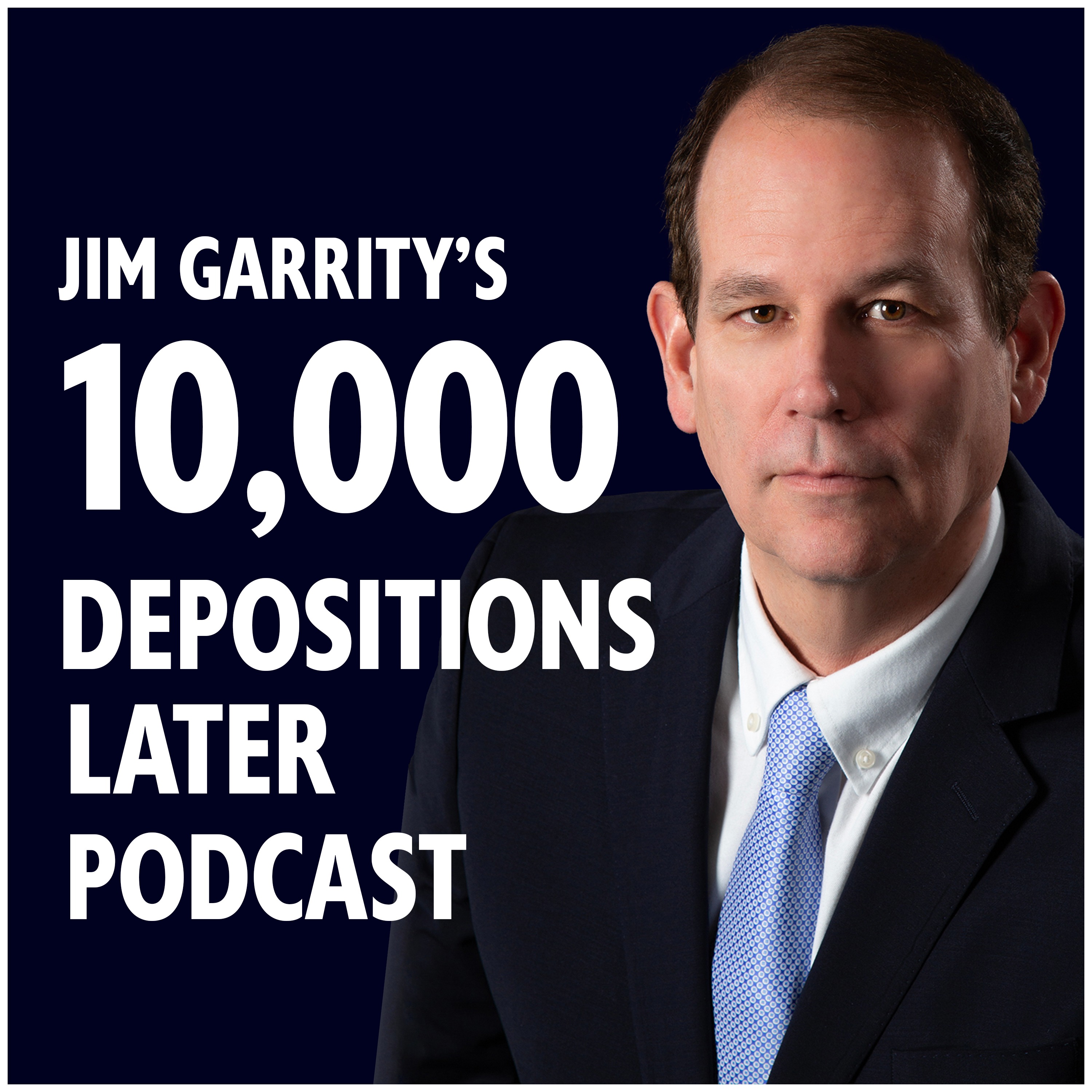
10,000 Depositions Later PodcastEpisode 98: "Have You Now Told Me Everything That Supports Your Claims/Defenses?"In this episode, Jim Garrity explains the pitfalls in defending against – or in asking - the common wrap-up question “Have you now told me everything that supports your claims?” (or defenses, as applicable). A deponent who is unprepared for this question is likely to foreclose any opportunity to add additional information. On the other hand, a lawyer who asks this question at the very end of a deposition may open a Pandora's box that cannot be closed. Garrity addresses the situation, as always, from both sides, and offers practice tips to avoid problems.Supporting cases in the show no...
2022-07-0811 min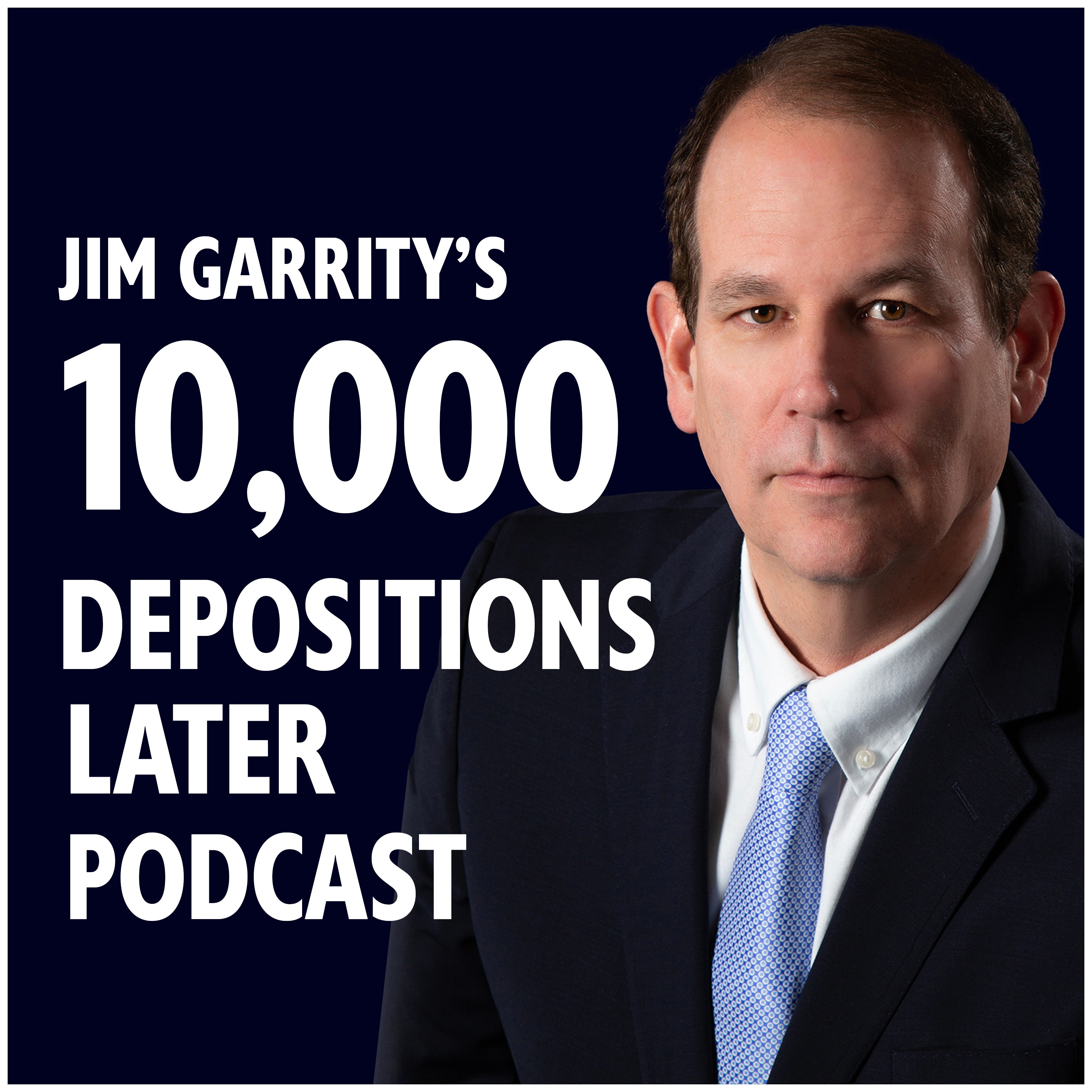
10,000 Depositions Later PodcastEpisode 97 - Using Designated-Representative Depos When You Can't Depose An Apex WitnessIn this episode, Jim Garrity discusses a question he got from a lawyer whose corporate opponent refused to make the CEO available for deposition under the "apex doctrine." Garrity explains the advice he gave, which was to immediately notice a designated-representative deposition under Fed. R. Civ. P. 30(b)(6). He also discusses the value of designated-representative depositions in arbitration, where - because of sharp restrictions on the number of depositions that can be taken - many witnesses will similarly be off-limits.
2022-07-0108 min
10,000 Depositions Later PodcastEpisode 96 - Lessons from The Front Lines: Hit with A Dispositive Motion Before You've Taken All Your Depositions? Do This (Immediately)In this episode, Jim Garrity highlights a June 17, 2022 court ruling where Fed. R. Civ. P. 56(d) was in play. This rule allows you to ask a court to defer ruling on a prematurely-filed summary judgment motion, in order to allow you more time to complete depositions for use in opposing the motion. Here, Garrity dives deep into the rule, and into the winning and losing ways to draft or oppose FRCP 56(d) motions. Our Lessons from the Front Lines episodes spotlight brand-new deposition-related court rulings from around the country. So it's important to bear in mind that the rulings...
2022-06-2327 min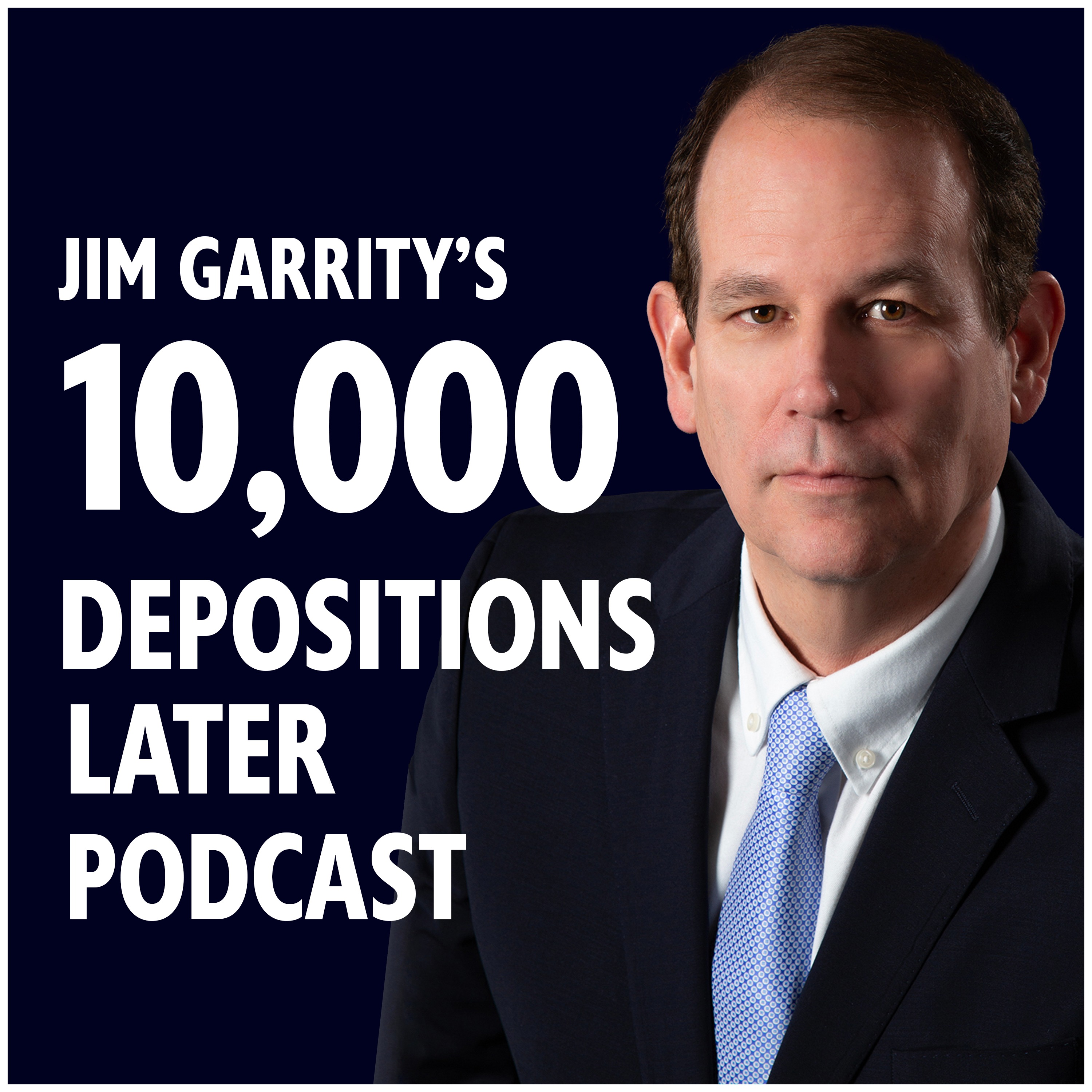
10,000 Depositions Later PodcastEpisode 95 - Handling Deponents With Severe Speech ImpedimentsIn this episode, Jim Garrity offers critical tips for preparing deponents who suffer from severe speech impediments. If left unaddressed, much of the deponent's testimony will be lost. It doesn't need to be that way, and Garrity offers a host of valuable practice tips to help litigators on both sides of this issue. This episode is based on the 13 reported court decisions in the show notes below. (And one more thing? Would you please go to our podcast, wherever you download it, and leave us a 5-star rating right now? That's a huge way to send us a thumbs-up...
2022-06-1718 min
10,000 Depositions Later PodcastEpisode 94 -What Five Things Should Litigators Be Doing More Of In Their Deposition Practice?In this episode, Jim Garrity discusses a brainstorming meeting he had with the podcast staff about show topics for the coming year. One member suggested he develop a "top five list" of things that litigators should be doing, but aren't. Bad idea! As Garrity explains in the episode, there is no single list of things all trial lawyers should do. Effective deposition plans are highly individualized. So one-size-fits-all checklists for litigators, applied mechanically, foster the very opposite of truly brilliant deposition practice. Garrity uses this episode instead to talk about five things that immediately came to mind, and that...
2022-06-0510 min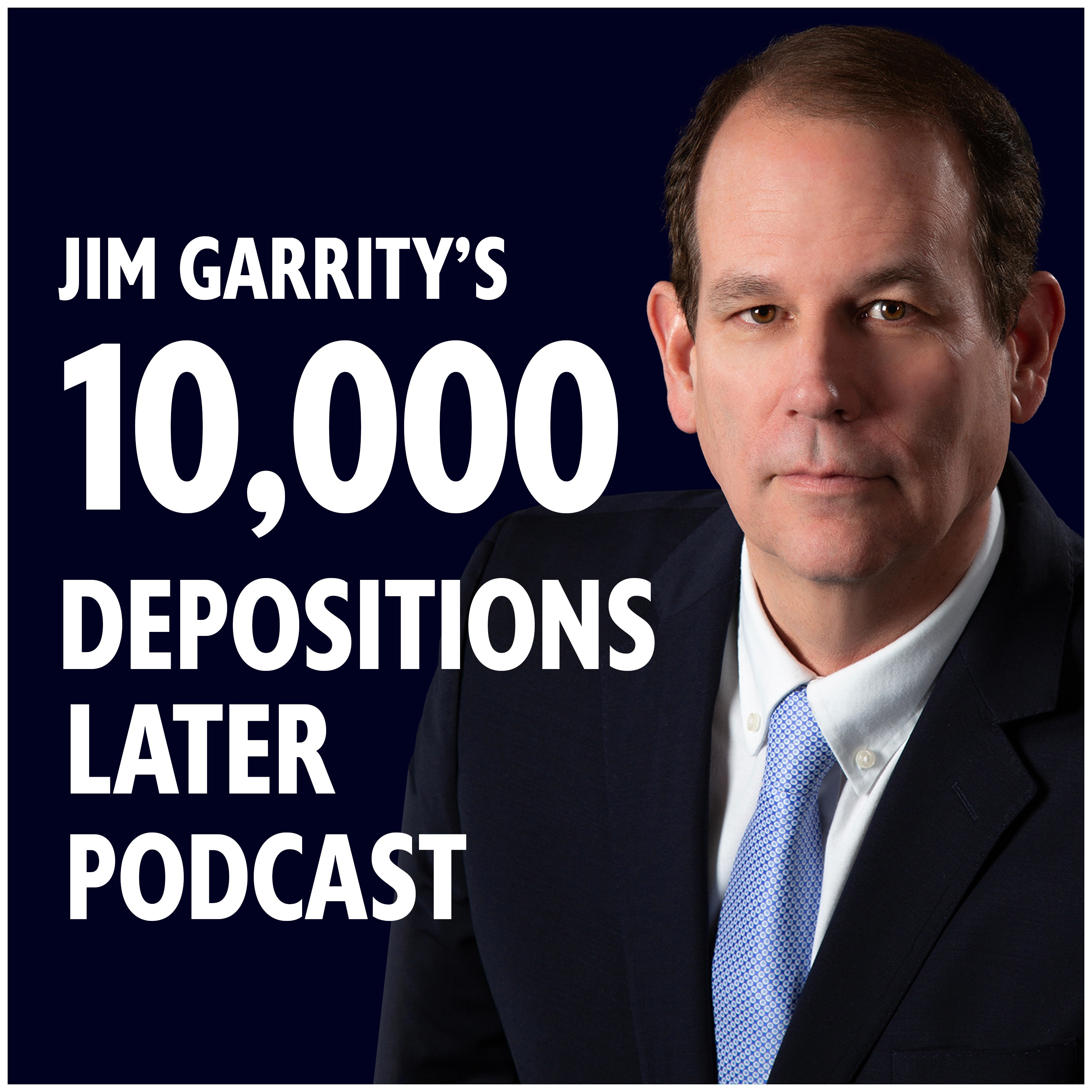
10,000 Depositions Later PodcastEpisode 92 - The Deponent is Taking Notes While Testifying. Can You Demand Them?In this episode, Jim Garrity ponder the issue whether you're immediately entitled to obtain notes taken by a deponent while testifying or, to go a step further, the notes of non-attorney witnesses observing the depositions of others. As always, Garrity offers practice tip for those seeking such notes and those opposing their production. Cases mentioned in the show are listed below.And one more thing? Would you consider leaving us a 5-star rating, a positive review, wherever you get your podcasts? Our production staff work their tails off, and seeing a new rating is a great way...
2022-05-2018 min
10,000 Depositions Later PodcastEpisode 90 - So What, Exactly is Impermissible "Coaching" During a Deposition?In this episode, Jim Garrity explains what constitutes improper coaching during depositions, and offers a wide range of examples. As always, cases mentioned in the episode appear below in the show notes. Thanks for listening! And if you haven't checked out the book on which this podcast is based, you can find it on Amazon and just about everywhere else. Look for 10,000 Depositions Later: The Premier Litigation Guide for Superior Deposition Practice. Now in its third edition at 450 pages, in both print and electronic formats.SHOW NOTESIn re Neurotin Antitrust Litigation, 2011 WL 253434, Case No. 02...
2022-04-2516 min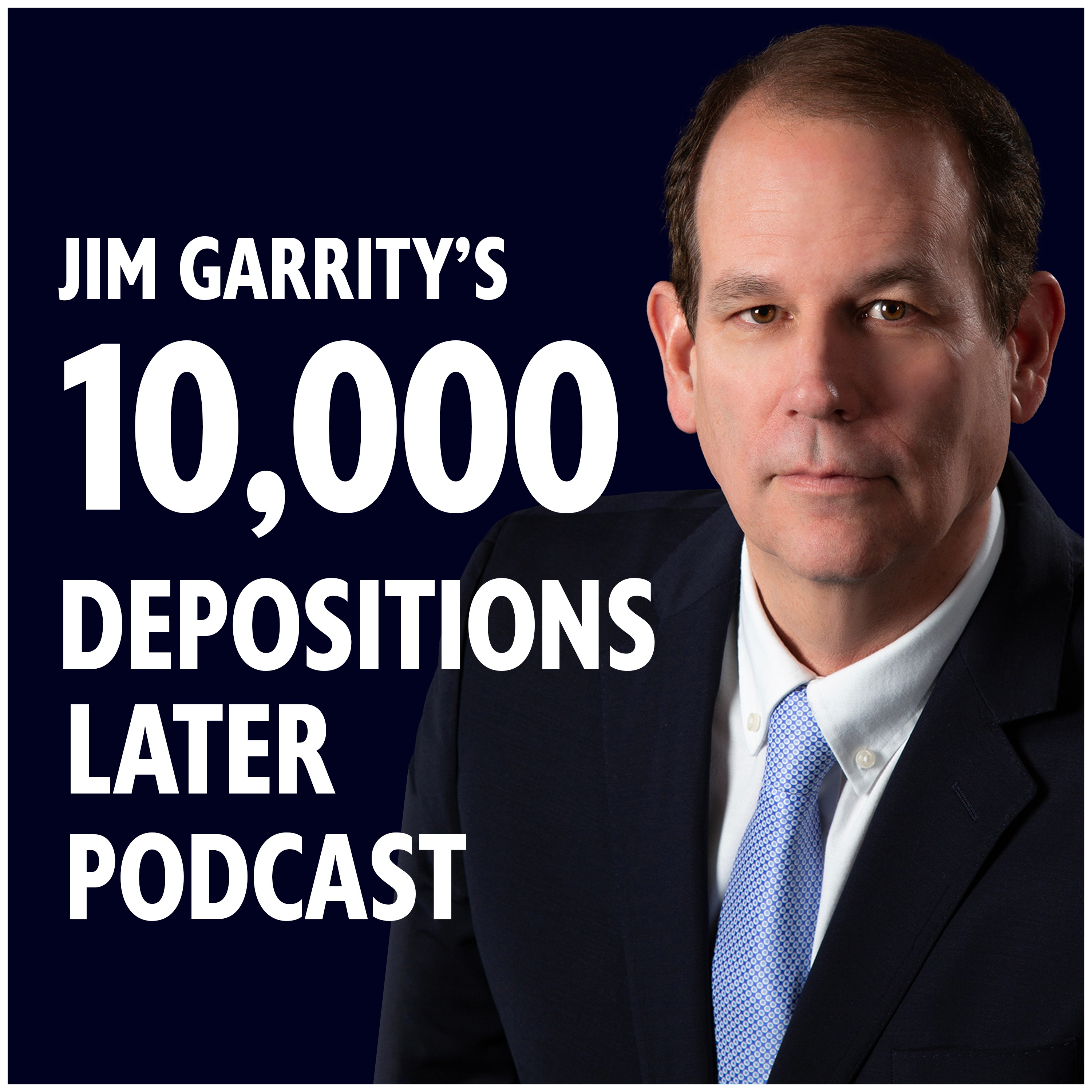
10,000 Depositions Later PodcastEpisode 90 - So What, Exactly, Constitutes "Coaching" During a Deposition?In this episode, Jim Garrity explains what constitutes improper coaching during depositions, and offers a wide range of examples. As always, cases mentioned in the episode appear below in the show notes. Thanks for listening! And if you haven't checked out the book on which this podcast is based, you can find it on Amazon and just about everywhere else. Look for 10,000 Depositions Later: The Premier Litigation Guide for Superior Deposition Practice. Now in its third edition at 450 pages, in both print and electronic formats.SHOW NOTESIn re Neurotin Antitrust Litigation, 2011 WL 253434, Case No. 02...
2022-04-2418 min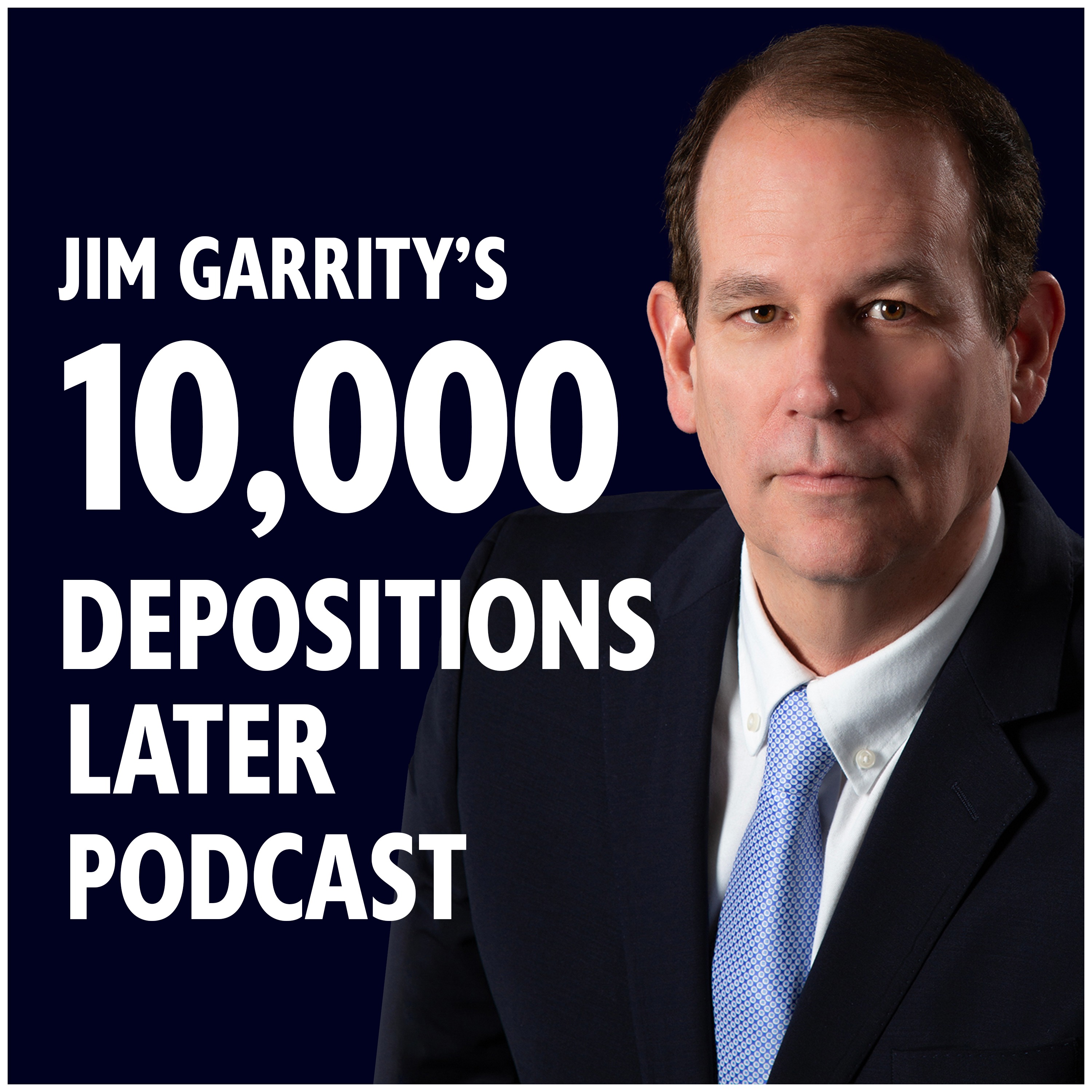
10,000 Depositions Later PodcastEpisode 89 -Lessons from the Front Lines: An Appellate Court’s Ominous Comment to Litigants Fighting Over a Transcript’s AccuracyIn this episode, Jim Garrity discusses an April 18, 2022, opinion from a federal appellate court, about a dispute between the parties over the accuracy of the stenographic transcript of the plaintiff's deposition. Despite the arguments made at the trial level about errors in the transcript, neither the parties nor the trial judges apparently obtained the audio of the deposition and made it a part of the record. That prompted the appellate court to vacate the summary judgment ruling and send the case back to the trial judge, with instructions for the court and parties to listen to the audio and...
2022-04-2218 min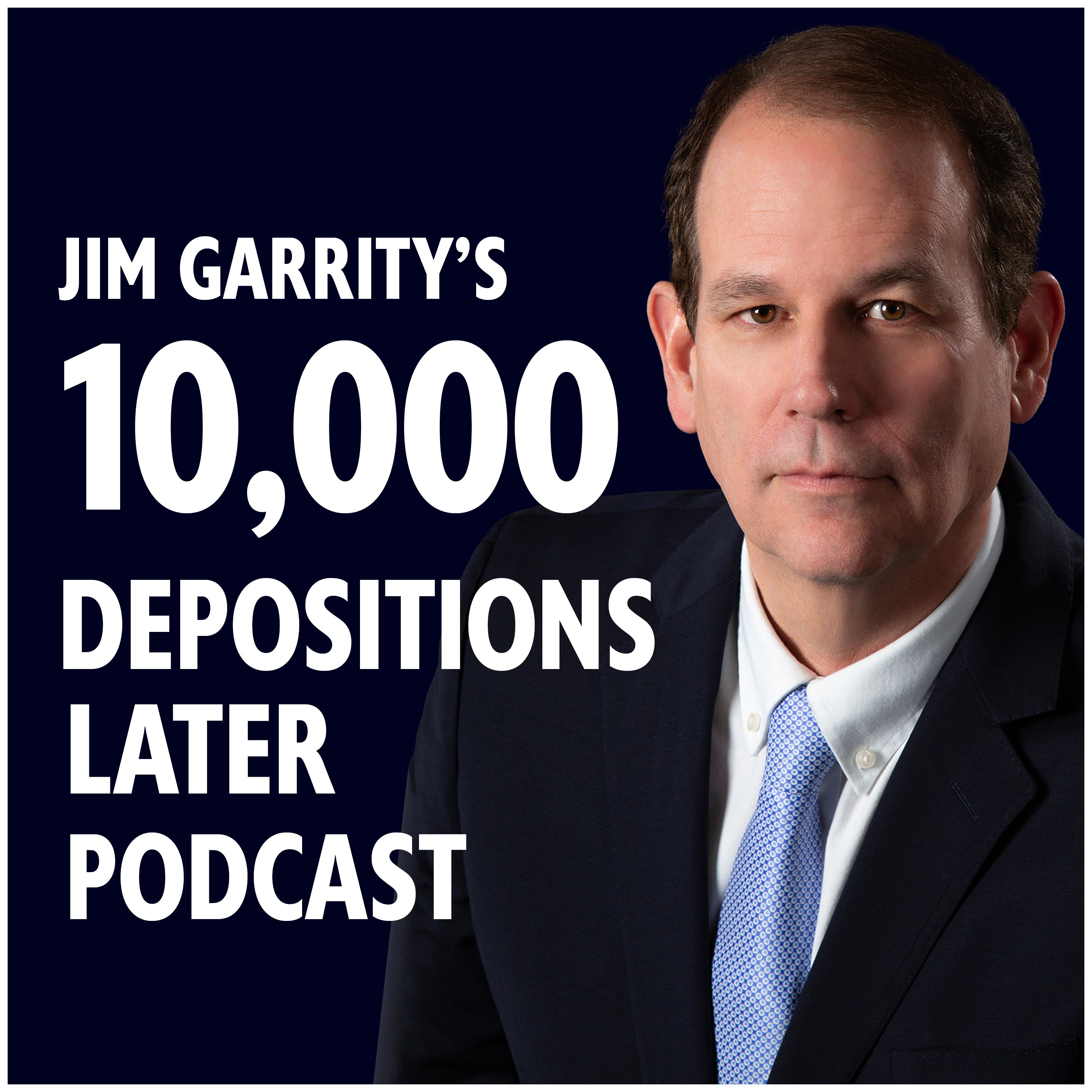
10,000 Depositions Later PodcastEpisode 88 -How to Avoid Being Taxed Costs for Videotaping When Your Opponent Also Arranged for a Stenographic TranscriptToday Jim Garrity offers up 14 different, caselaw-supported, arguments to protect your client from being taxed with an opponent's videographer costs following an adverse case outcome. Many lawyers take for granted that the taxation of videographer charges is just as inevitable as for stenographic transcripts. That just isn't so. Listen for more. And remember our show notes contain all the cases mentioned in the episode. Today there are 18 cases in the list. If you can't see them all, click through to our show's home page. Thanks for listening!SHOW NOTES:Hemingway Villa Condominium Owners Association, Inc...
2022-04-1022 min
10,000 Depositions Later PodcastEpisode 87: Next-Day Certified Transcripts, Rough in an Hour, No Extra Charge: A Conversation with Dean Whalen, Chief Legal Officer of Readback Active Reporting.Today, Jim Garrity interviews the chief legal officer of a company that offers commodity-priced transcripts with all the bells and whistles of the most expensive traditional court reporters. In the episode, the CLO, Dean Whalen, walks through the easy ABCs of using his company for reporting services. Here's a blurb from the company's website to give you a flavor for what you'll hear in the interview: "Active Reporting replaces all the annoying add-on fees with all the rich services litigators need to perform their best for a low, flat fee based on the duration of the proceeding. View the...
2022-04-0627 min
10,000 Depositions Later PodcastEpisode 85 - Can You Bluff Dishonest Deponents By Implying You Have Evidence that You Don't?In this episode, Jim Garrity tackles the question whether you can bluff a dishonest deponent - for the purpose of encouraging the witness to be truthful - by implying you have evidence that actually doesn't exist? This episode discusses a decision that confronted this precise question. A lawyer placed cassette tapes on a table in front of a deponent during the examination. The tapes were suggestively labeled to imply that the tapes contained recordings of the witness' conversations, although they contained nothing of the kind. Learn more by listening to the episode. As always, email us with questions, comments...
2022-03-1306 min
10,000 Depositions Later PodcastEpisode 84 - Does the Rule of Sequestration Apply to Depositions?In this episode, Jim Garrity addresses one of the most widely-held misconceptions about deposition practice. He also provides practice tips when an opposing lawyer "invokes the rule" and demands that one or more of your attendees leave the deposition room, to prevent them from hearing a deponent's testimony. Garrity also shares tips from the opposite viewpoint - what to do when you're the lawyer who wants attendees excluded. As always, we've included case citations below to decisions on the topic covered in this episode. Thanks for listening! (Questions? Topics you'd like to suggest Jim cover? Email us at depositionpodcast...
2022-03-0518 min
10,000 Depositions Later PodcastEpisode 83 - Lessons from the Front Lines: Alex Jones' Lawyer in the Sandy Hook Case Reprimanded for Deposition Conduct. (He Should Have Listened to Episode #49.)As you know, our Lessons from the Front Lines episodes spotlight brand-new court rulings from around the country on deposition-related topics. Today's case in the spotlight raises an issue we covered last year in Episode #49 - whether a lawyer can properly ask deponents during depositions to search their cell phones for information (assuming the deponent was not subpoenaed to bring the information or device). In this episode, Jim Garrity tells you exactly what questions the lawyer asked, what the deponent said in response, and what led the judge to issue a public reprimand because of the lawyer's conduct. Garrity...
2022-02-2222 min
10,000 Depositions Later PodcastEpisode 82 - Testimonial Privileges: The Legislative PrivilegeIn this episode - the first in a new series this year on testimonial privileges that can impede your efforts to depose witnesses - Jim Garrity explains the "legislative privilege," applicable to legislators and others who engage in legislative functions. It's not the same as "legislative immunity," and as with all privileges, there are ways to depose witnesses who can assert it. In this episode, there are fifteen cases cited in the show notes. If you can't see all fourteen, click through to our home page. (Some podcast sites don't accommodate longer show notes.) Thanks!(NOTE: We...
2022-02-2015 min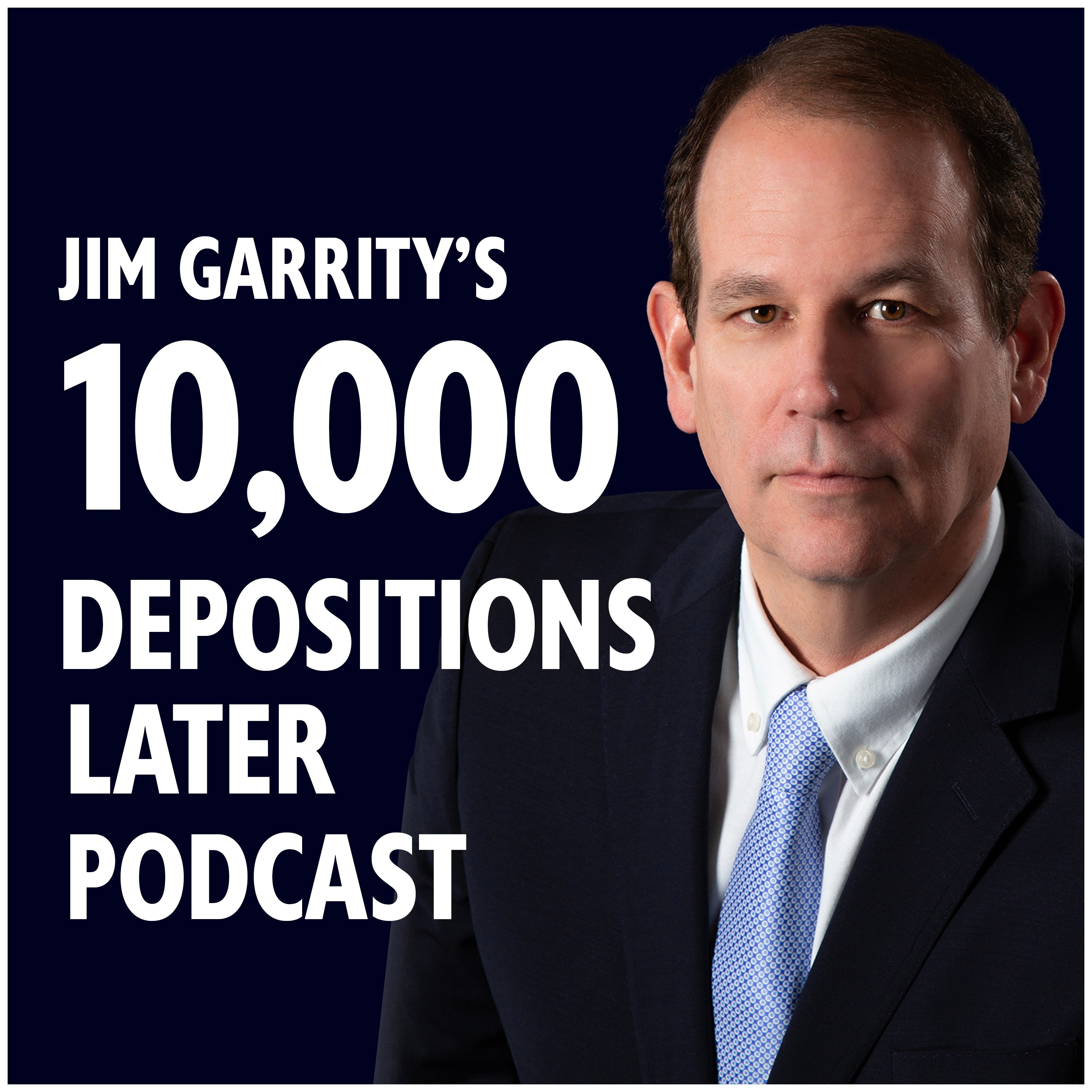
10,000 Depositions Later PodcastEpisode 81 - How (and Why) to Ask Deponents About Prior Sworn TestimonyIn this episode, Jim Garrity stresses the importance of systematically asking deponents to catalogue their prior testimonial experience in any form or forum. A witness' prior testimony can be an intelligence goldmine. No company Garrity knows of maintains (or at least admits to maintaining) a readily-available record of where, when and on what its current and former employees have testified. So the best source - unfiltered by opposing lawyers - are witnesses in their depositions. Garrity shares the question he asks witnesses for this purpose, for creating a record under oath of the existence of relevant transcripts or affidavits...
2022-02-1115 min
10,000 Depositions Later PodcastEpisode 80 - Taking Depositions Before and After A LawsuitIn this episode, Jim Garrity does a deep dive into Fed. R. Civ. P. 27 (and its state equivalents, because virtually all U.S. states and territories have a similar rule). Rule 27 allows you to take depositions before a lawsuit has been filed - and also when a judgment has been entered and the case is on appeal - in order to perpetuate/preserve testimony. But the rule actually allows so much more. In fact, Garrity says its name, "Depositions To Perpetuate Testimony," would be more accurate if it were renamed "Discovery to Perpetuate Evidence." Listen in for a great...
2022-02-0531 min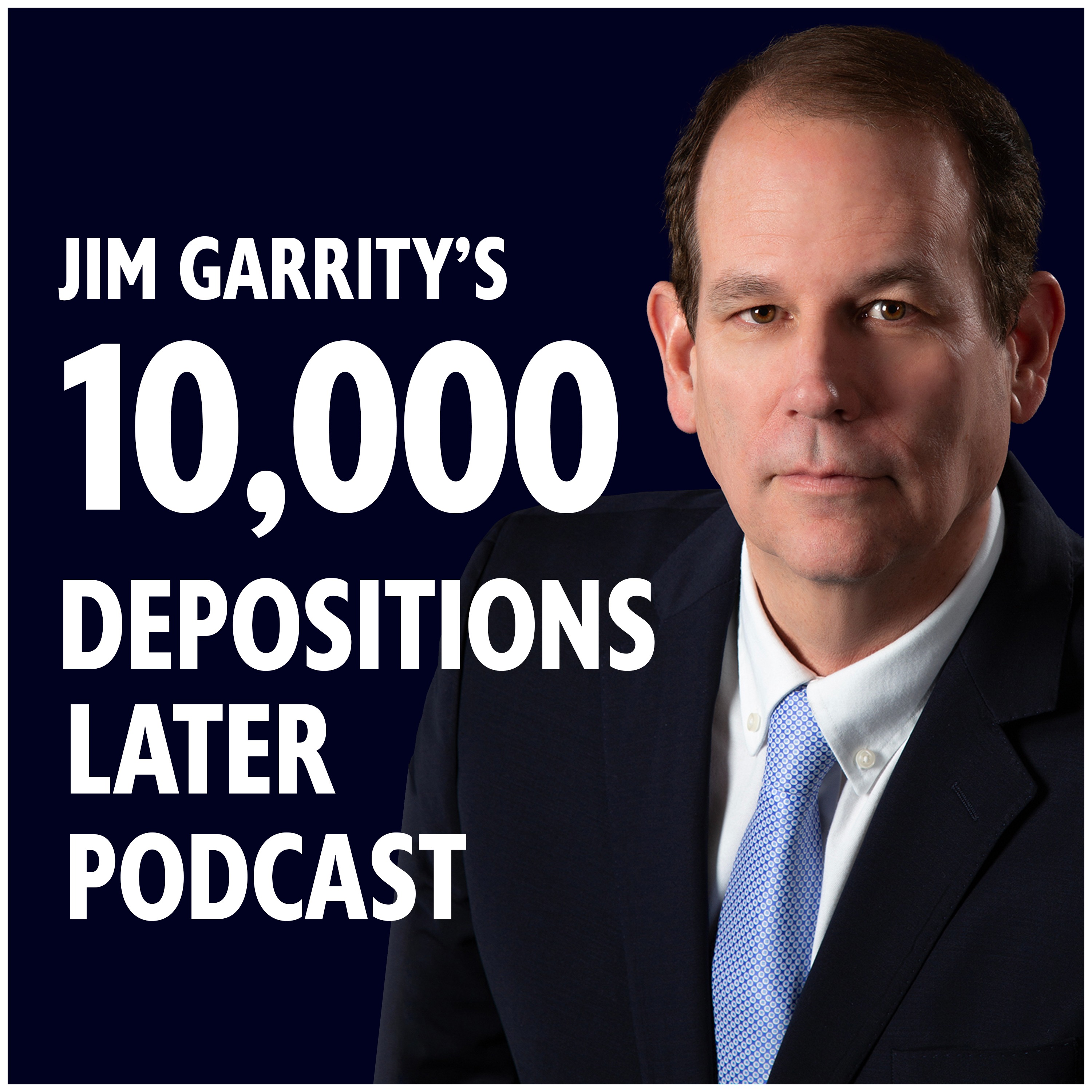
10,000 Depositions Later PodcastEpisode 79: An Email Is Not a Notice of Taking Deposition (But It Could Be)In this episode, Jim Garrity discusses an October 21, 2021 ruling granting a protective order blocking plaintiffs' depositions set on short notice. In the case Garrity discusses, the plaintiffs' lawyer sent emails - one 49 days before the close of discovery, and another 42 days before the deadline - seeking deposition dates for specific named witnesses. But the actual Notice of Taking Depositions wasn't served until October 14, just a few days before the October 18, 19, and 20 depositions, and with a discovery deadline of October 21. So while the depositions had been discussed informally by email well in advance, the actual notice violated both a local...
2022-01-1912 min
10,000 Depositions Later PodcastEpisode 78: Lessons from the Front Lines: Why Google Couldn't Prevent the Apex Deposition of CEO Sundar PichaiIn this Lessons from the Front Lines episode, Jim Garrity analyzes Google's opposition to the deposition in a class action of its highest-level official, Sundar Pichai. The fight, which ended in a December 27, 2021 ruling allowing the deposition, implicates the judicially-created "apex witness" doctrine. That doctrine holds that depositions of top corporate, elected, and other government officials - those at the apex of their organization - should be discouraged or even prohibited unless the movant can satisfy the elements of the apex deposition test. As always, relevant case cites are in the show notes. And if you'd like the free...
2022-01-0119 min
10,000 Depositions Later PodcastEpisode 77 - Listener Questions About Depositions by Written QuestionsIn this episode, Jim Garrity answers some listener questions about depositions by written questions, and shares additional thoughts about the technique, which we covered in Episode 76. This will be our last episode of the year, and we wish all of our listeners a safe and happy holiday season and New Year. We're thrilled to report that we added thousands and thousands of new listeners in 2020, our first full year of the podcast, and we're grateful for the rave reviews about the way we structured the podcast: a single topic in each episode, actionable advice, tips and tactics for lawyers...
2021-12-2107 min
10,000 Depositions Later PodcastEpisode 76 - Demystifying Depositions by Written QuestionsIn this episode, Jim Garrity explains how depositions by written questions work, and when to use them. Many lawyers have never deposed a witness this way. Garrity argues that this tool has value, and that you should experiment with them to gain both a working understanding of this option and to further expand your deposition skill set. There's a bonus PDF with this episode as well, available free upon request, as explained in the audio. And as always, the show notes contain full case citations to every case mentioned and more. Thanks for listening!SHOW NOTES
2021-12-1520 min
10,000 Depositions Later PodcastEpisode 75 - Lessons From The Front Lines: Never Let Opponents Control the Timing & Sequence of Your DepositionsIn this episode, Jim Garrity talks about the sequence and timing of your depositions. Who is allowed to go first? What if the opposing lawyers insist on deposing your client first, and won't agree to dates for your depositions unless you consent? What if your opponents won't agree to any depositions until your responses to their interrogatories are complete? And what if they're the first to notice a deposition of a witness you also need to depose, but they set it six months from now? Can you go ahead and notice the same witness for a deposition before then...
2021-12-1131 min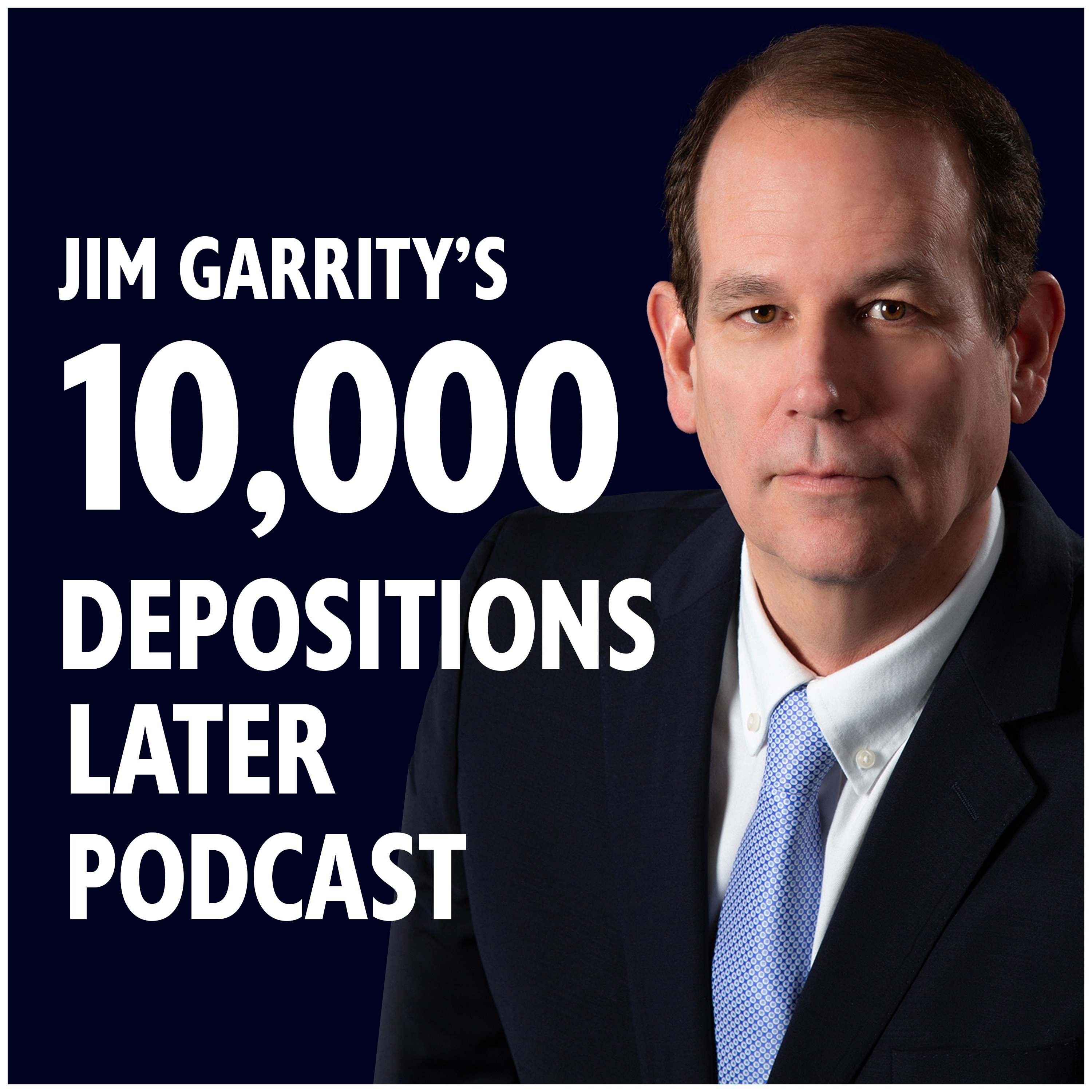
10,000 Depositions Later PodcastEpisode 74 - Can You Read the Entirety of an Adverse Party’s Depositions at Trial, Even When the Deponents Are Available to Testify Live?In this episode, Jim Garrity looks at a tactic expressly allowed by the rules, but almost always prohibited by judges, specifically the reading of the entire deposition of an adverse party's witnesses to the jury. The practice seems authorized by Fed. R. Civ. P. 30(a)(3) and similar language in many state court rules, which say the deposition of an adverse party can be used “for any purpose” at trial. Yet while many lawyers have tried, few have succeeded, if those deponents are available to testify live. Hear what the cases say, and learn about the one exception where courts have...
2021-11-3012 min
10,000 Depositions Later PodcastEpisode 72 - Set Your Depositions Unilaterally After Asking for Dates…How Many Times?In this episode, Jim Garrity tackles a sometimes-sticky question: How many times do you have to ask an opponent or witness for deposition dates before you can just set them unilaterally? Garrity tells you (a) exactly how many times you should ask for dates before you set them without agreement, and (b) exactly what to say.Do you have an extra 60 seconds today? Our show production staff would greatly appreciate it if you would use those 60 seconds to go to wherever you get your podcasts and leave us a five-star review. It's the best thing you can...
2021-11-1912 min
10,000 Depositions Later PodcastEpisode 71 - Lessons from the Front Lines: A Plaintiff Escapes Sanctions for Using Public Records Requests to Gather Information During a Discovery StayIn this episode - one in a recurring series where we share brand new deposition-related court rulings from around the country - Jim Garrity tells you about a ruling just three days ago, where a judge pondered the question whether a plaintiff's lawyer had violated a discovery stay by using a public-records act request to gather information while the stay was in effect. It's similar to a line of cases where courts have said that gathering witness statements in "deposition-like" settings while a stay is in place may be sanctionable. Cases mentioned in this episode are listed in the...
2021-11-0720 min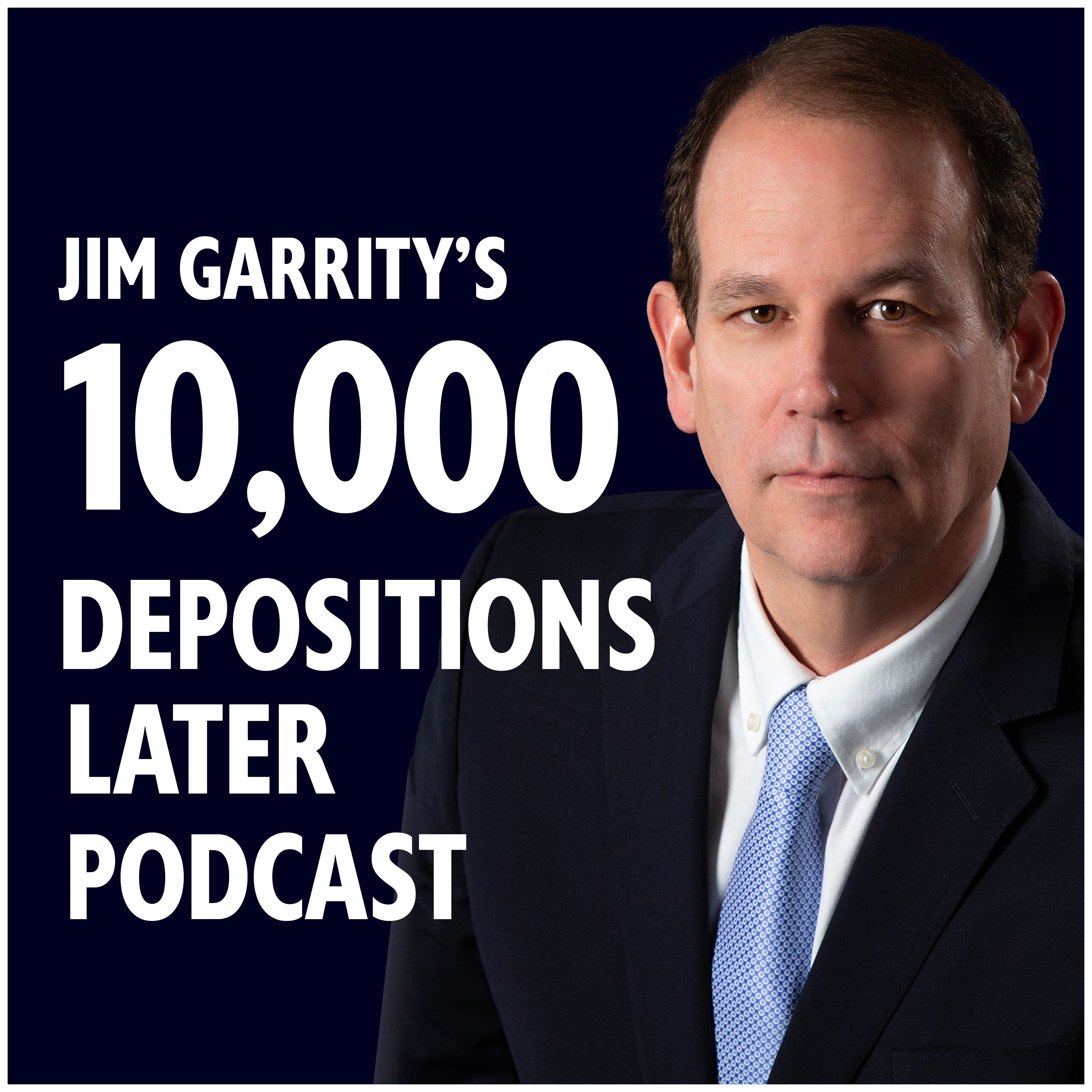
10,000 Depositions Later PodcastEpisode 70 -Can Non-Record Lawyers Participate in the Depositions of their Non-Party Clients?In this episode, Jim Garrity brings clarity to a quandary experienced by many litigators: Can the non-record lawyers of non-party deponents show up at the deposition and actively participate? By objecting, by asking questions, by giving directions to the court reporter, or engaging in colloquy with record counsel? As always, the cases upon which this episode is based are listed in the show notes below. If it looks like our show notes are cut off wherever you get your podcast, click through to our podcast homepage, or to the page where this episode is hosted, to see the complete...
2021-10-2917 min
10,000 Depositions Later PodcastEpisode 69 - So, What About Standing (a/k/a Continuing or Running) Objections?In this episode, Jim Garrity discusses so-called standing objections, where - in theory - the parties agree that defending lawyers need not make continual objections to a specific line of questioning in order to preserve their rights. What factors should you take into account in offering, or agreeing to, a standing objection? Garrity offers a wide range of practical tips to consider.Cases upon which this episode are based appear in the show notes below. Cases that begin with a double asterisk were added by our research staff after the episode was first aired.SHOW...
2021-10-2121 min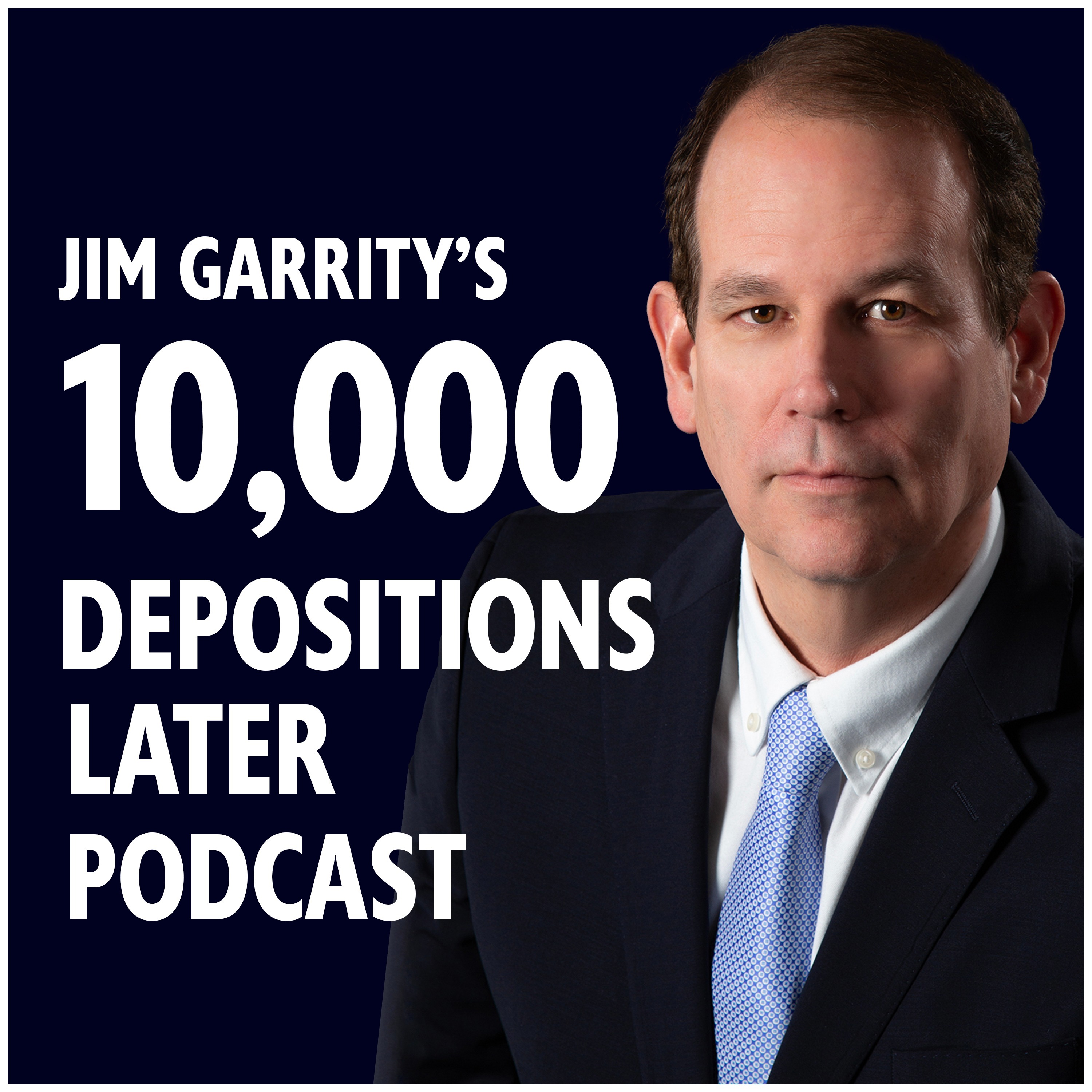
10,000 Depositions Later PodcastEpisode 68 -Objecting to the Use of Partial or Incomplete Documents in DepositionsWhy do litigators feel comfortable dismembering emails, and showing deponents only fragments of the actual conversation? More importantly, why do they think it's okay? In this episode, Jim Garrity discusses "rule of completeness" objections, and why you need to make them. As always, be sure to check out the show notes, which contain the authorities on which each episode is based. The show notes below for this episode contain nine references to authorities. If you can't see them all wherever you download your podcasts, be sure to click through to our episode and podcast homepage, where the complete list...
2021-10-1508 min
10,000 Depositions Later PodcastEpisode 67 - Do Deposition Subpoenas Expire?In this episode, Jim Garrity addresses the question whether your deposition subpoena, which contains a specific date and time for appearance, in fact expires (requiring the witness to be re-subpoenaed) if the deposition is postponed to a future date. As always, he ends the episode with incredibly insightful practice tips, including sample language to include in your subpoenas to avoid this expiration-date argument. Check the show notes for the cases upon which this episode is based. And if you'd like to see the sample subpoena Jim Garrity uses that contains the language he recommends you add, email us at...
2021-10-0608 min
10,000 Depositions Later PodcastEpisode 65 -Who's Zoomin' Who? Identifying Your Remote Deponents' Off-Screen Cheat SheetsWhat exactly have your remote video deponents placed in front of them - on their screen, on the floor, on sticky notes, on a second monitor and elsewhere - to help them testify and spew the official line? Do you systematically inquire at the start of your remote depositions? In this episode, Jim Garrity recommends that you always ask about devices and information - within the deponent's reach or eyesight - at the start of all remote video depositions. Want the Deponent-Accessible Device and Information Verification checklist Garrity mentions in the podcast? Email us at depositionpodcast@jimgarritylaw.com and...
2021-09-2908 min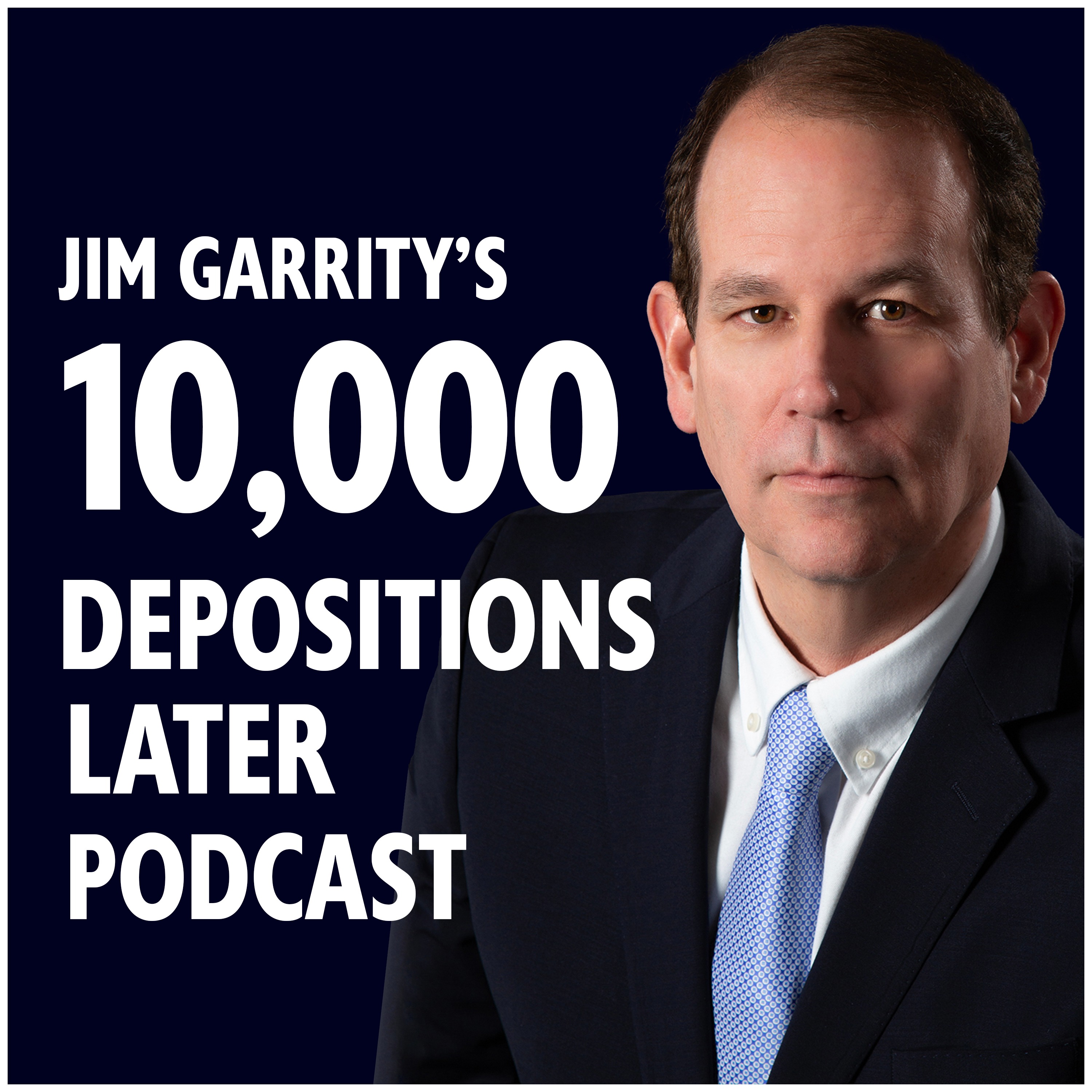
10,000 Depositions Later PodcastEpisode 63 -About That Pesky Notice Language (For Use in Discovery "And/Or At Trial")In this episode, Jim Garrity explores the effect of language added by many litigators in their notices that the deposition may be used (apart from discovery purposes) at trial, in lieu of live testimony by the deponent. But does simply declaring this make it so? Does this eliminate the need to prove unavailability before the deposition can be read? Garrity discusses what courts have to say about the ramifications of adding this language, and offers practice pointers both for lawyers who want to maximize their odds of using depositions in lieu of, and for those who want to oppose...
2021-09-1720 min
10,000 Depositions Later PodcastEpisode 62 -A Tool for Motivating Deponents to Reveal What They Know, Without Fearing RetaliationIn this episode, Jim Garrity shares a valuable tool for protecting the identities of nonparty deponents and, in the process, protecting their careers, reputations, and families. A deponent who sees that you've taken steps to protect them is a deponent likely to tell you everything they know. Be sure to check out the show notes, as always, for citations supporting the observations in this episode. Please note that not all sites where our podcasts are available will show you the entire list of authorities. If the list you see looks like it's incomplete, click through to our homepage, where...
2021-09-1117 min
10,000 Depositions Later PodcastEpisode 61 - Lessons from the Front Lines: A Judge’s All-In-One Guide to the Right (and Wrong) Way to Make Deposition ObjectionsIn this Lessons from the Front Lines episode - where we review brand-new deposition-related cases from around the country - Jim Garrity discusses a new ruling that belongs in your research files (and in your briefcase at depositions) on the right and wrong way to make depositions. The opinion, written by a relatively new federal magistrate who took great pains to catalog cases on this topic, contains more than fifty citations to authority from around the country. So it's an excellent opinion to pull out when opposing counsel starts to make obviously-improper objections during your examinations.SHOW...
2021-09-0814 min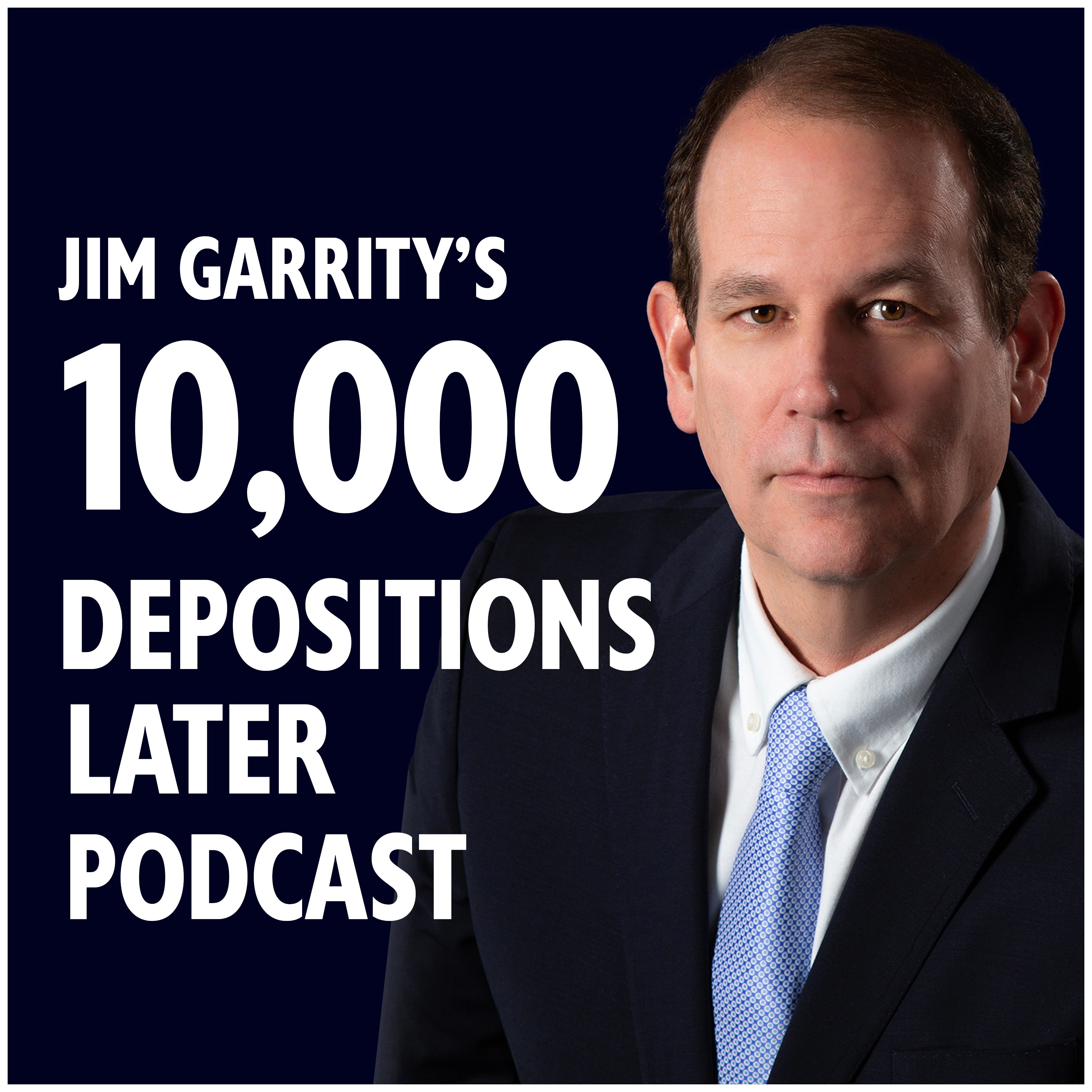
10,000 Depositions Later PodcastEpisode 60 - Core Essentials: Preparing Your Clients for Deposition, Part 7In this episode, Jim Garrity concludes the Core Essential Series on preparing your clients for depositions by discussing additional topics to cover with your clients, including the possibility of questions about dishonest or illegal acts, the likelihood of a wide range of personal background questions, inquiries about information your client has obtained and whether anyone associated with the adversary has been providing information behind the scenes, and the critical importance of eating and taking regular breaks during the deposition.Did you know? You can now follow and listen to this podcast on all the major platforms...
2021-09-0316 min
10,000 Depositions Later PodcastEpisode 59 - Core Essentials: Preparing Your Clients for Deposition, Part 6In this episode, Jim Garrity continues the series on preparing your clients for depositions. He’ll wrap up this series in the next segment. Today's episode includes pointers to share with your clients about the importance of giving complete answers to lawyers who constantly interrupt, the importance of listening to the entire question, the need to read all documents with great caution, the significance of appreciating that adversaries sometimes do alter documents (and that it may not be obvious), that your clients should not accept the authenticity of documents at face value, that some questions asked may be very per...
2021-08-3117 min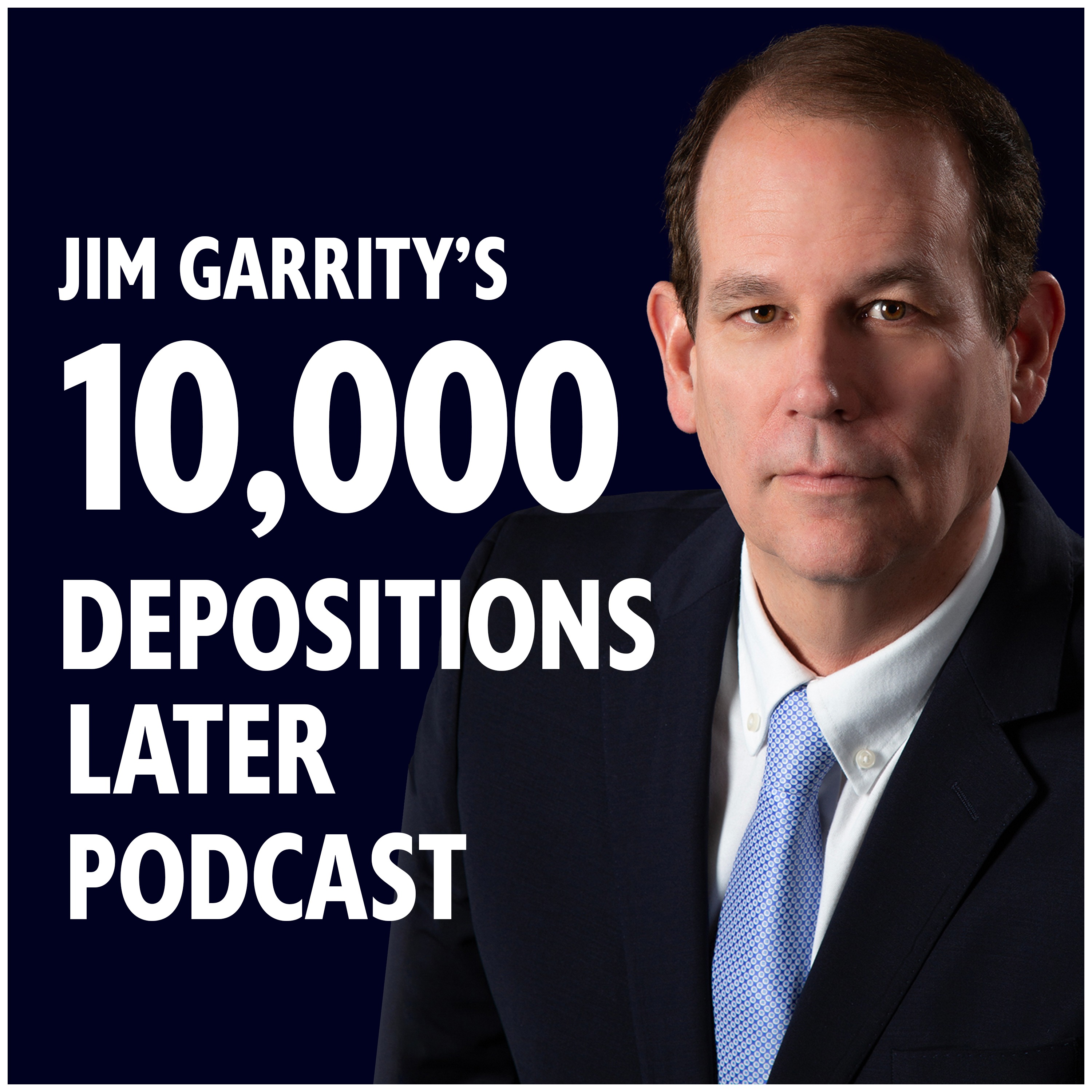
10,000 Depositions Later PodcastEpisode 58 - Core Essentials: Preparing Your Clients for Deposition, Part 5In this episode, Jim Garrity shares additional critical insights for preparing your clients for deposition. Today's episode includes pointers to share with your clients about how judges, opposing lawyers, and juries use transcripts; appreciating and understanding the difference between answering questions in a social conversation and in a deposition; the importance of saying "I don't know" and "I don't remember" when your clients don't know or don't remember; the importance of sticking to their guns when a lawyer pressures them to change their answer; and the importance of asking for clarification when a question is unclear. Two more episodes...
2021-08-2624 min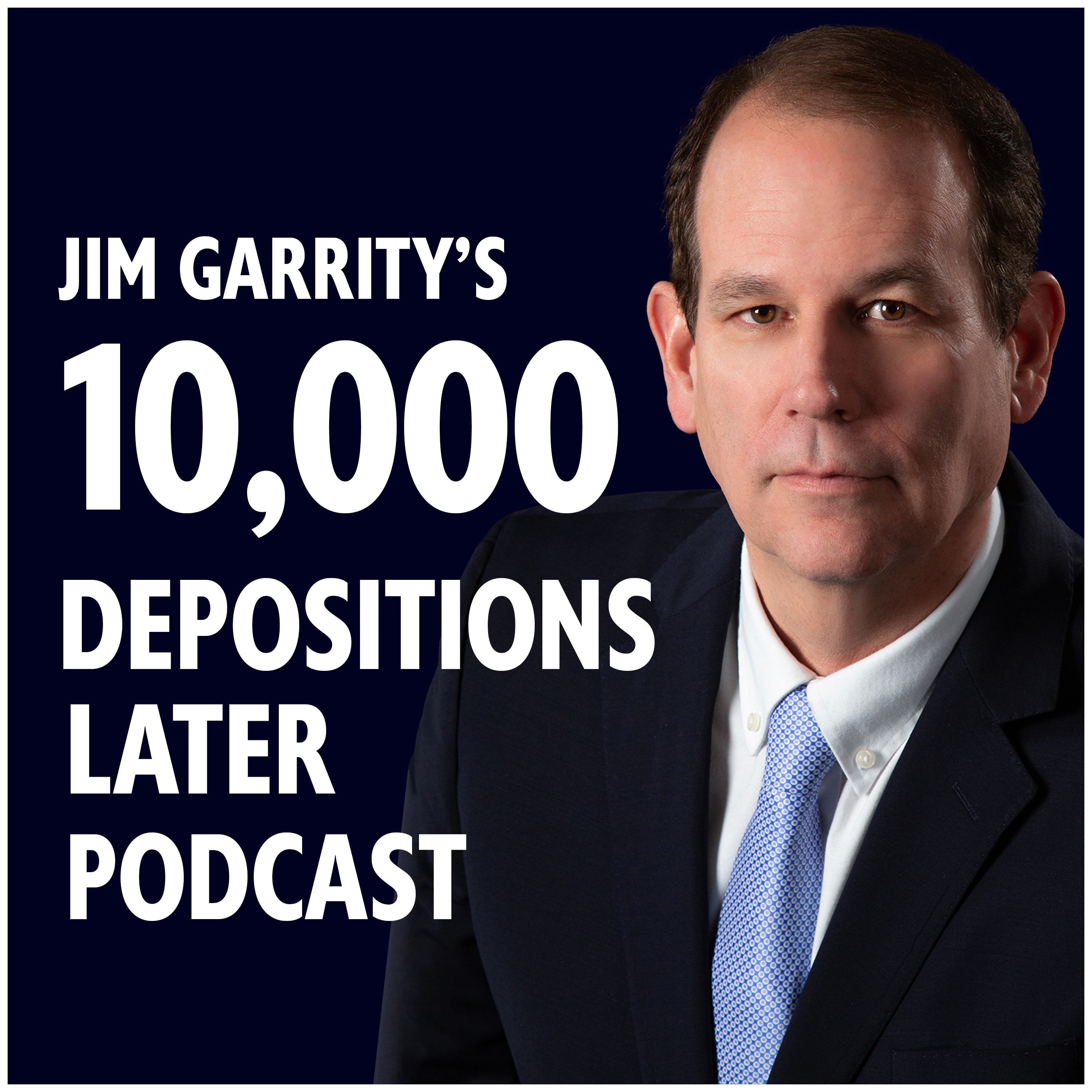
10,000 Depositions Later PodcastEpisode 57 - Core Essentials: Preparing Your Clients for Deposition, Part 4In this fourth installment of Preparing Your Clients for Deposition, Jim Garrity begins sharing critical insights you need to tell your clients about the deposition process: the layout of the room where the deposition will take place, who will be present and where they will be seated, the importance of taking regular breaks to prevent mental exhaustion, and the differences between depositions as seen on TV and depositions in real life. That includes the general obligation to answer every question asked, examination styles (push questions versus pull questions), the reality about the opposing lawyer's role and goal, and the...
2021-08-2427 min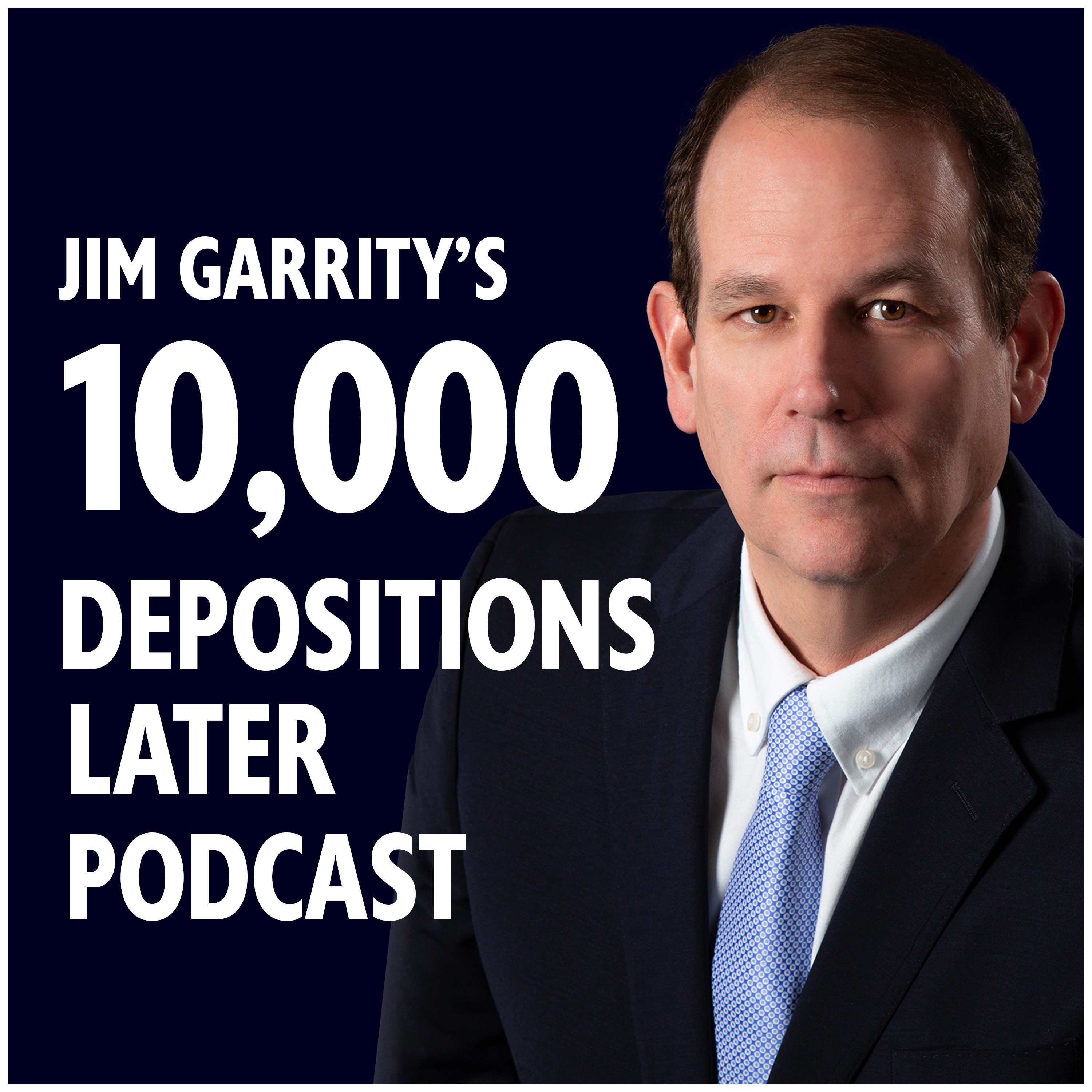
10,000 Depositions Later PodcastEpisode 56 - Core Essentials: Preparing Your Clients for Deposition, Part 3 ( The Three Building Blocks of Client Preparation)In this third installment of our Core Essential series on preparing your clients for deposition, Jim Garrity covers the three building blocks for effective client deposition prep: explaining the deposition process start to finish, explaining the tricks and traps used by opposing lawyers, and conducting mock depositions in the exact style of the examining lawyer. In other words, train as you fight. As always, thank you for listening. We appreciate your support, and would genuinely appreciate it if you would leave a five-star rating wherever you get your podcasts, as a way of saying thank you to our hard-working...
2021-08-1813 min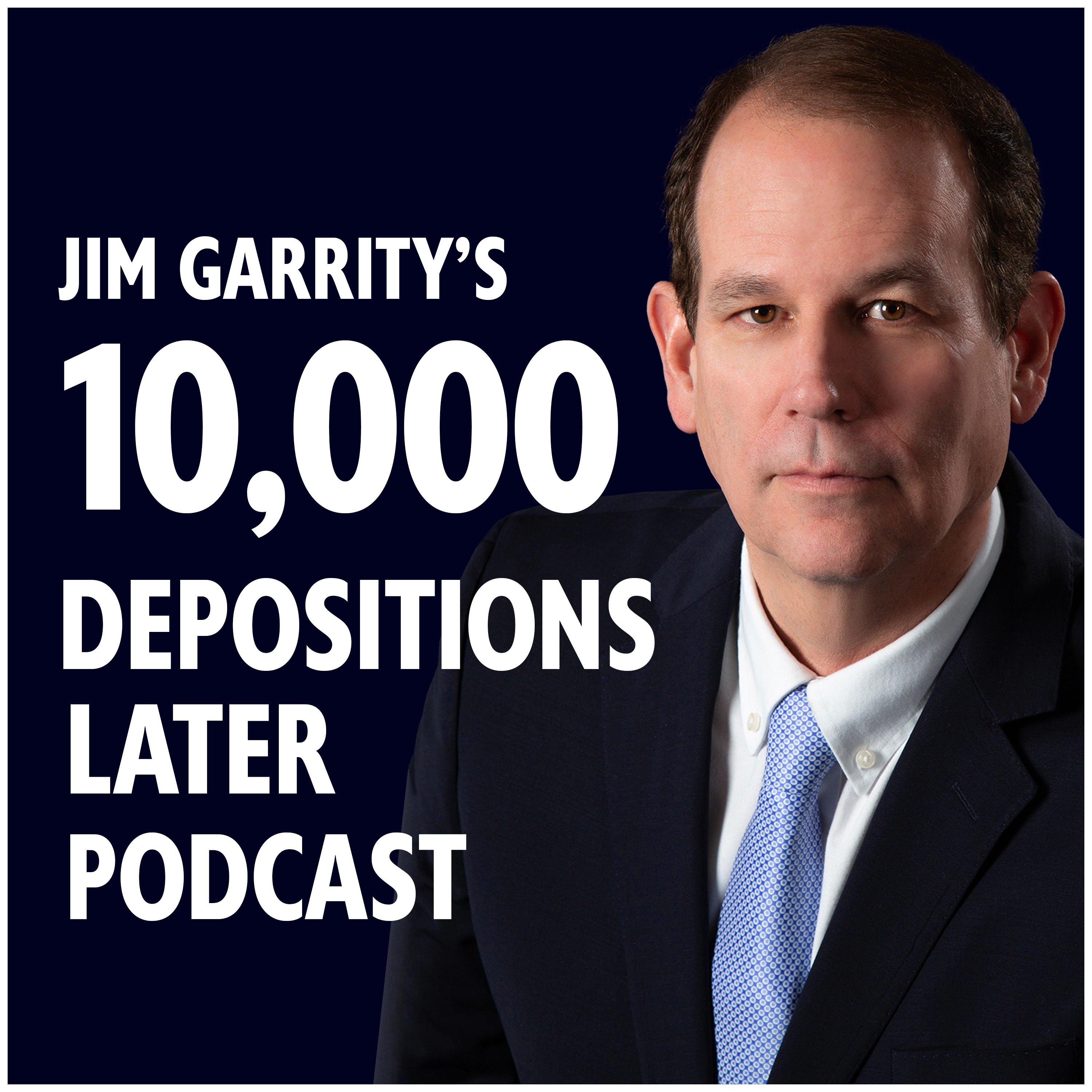
10,000 Depositions Later PodcastEpisode 55: Lessons from the Front Lines: What Not to Do When an Entity Designates Just One 30(b)(6) Witness on A Large Number of TopicsIn episode 47, Jim Garrity spoke about the problems you may encounter when entities produce a large number of 30(b)(6) designees on an equally large number of topics (e.g., 29 designees on 30 topics). Today, Garrity covers the difficulties you'll face when an entity produces just a single designee to cover a large number of topics (e.g., one designee on 33 topics). What complications will this cause for you, and how should you deal with it? As always, Garrity offers practical tips for dealing with it. Today's episode is based on Infernal Technology, LLC, et al. v. Epic Games, Inc., 2021 WL 3493495...
2021-08-1317 min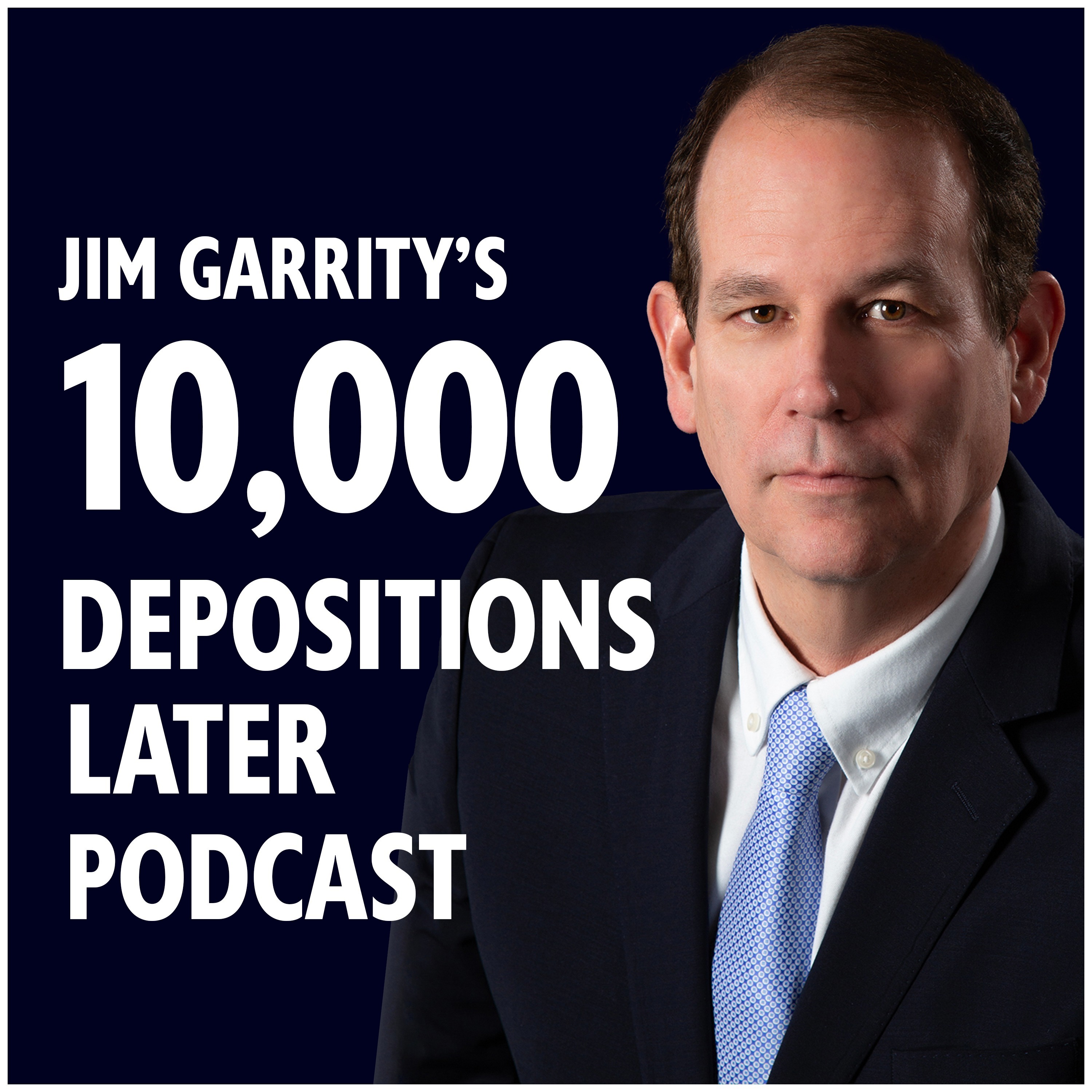
10,000 Depositions Later PodcastEpisode 54 - Remember the Errata!In this episode, Jim Garrity stresses the importance of always reserving the right to review the transcript of your client's deposition testimony, and provides a fresh example from one of his own cases about the errors that sometimes creep into the transcription of even the best reporters.CASE NOTES:CSC Holdings, Inc. v. Alberto, 379 F.Supp.2d 490, 493 n. 1 (S.D.N.Y.2005) (stating that “original deposition answers constitute the admissions of a party, and as such form part of the record evidence”) Dore v. Wormley, 690 F. Supp. 2d 176, 178 (S.D.N.Y. 2010) (“Plaintiff's objectio...
2021-08-0406 min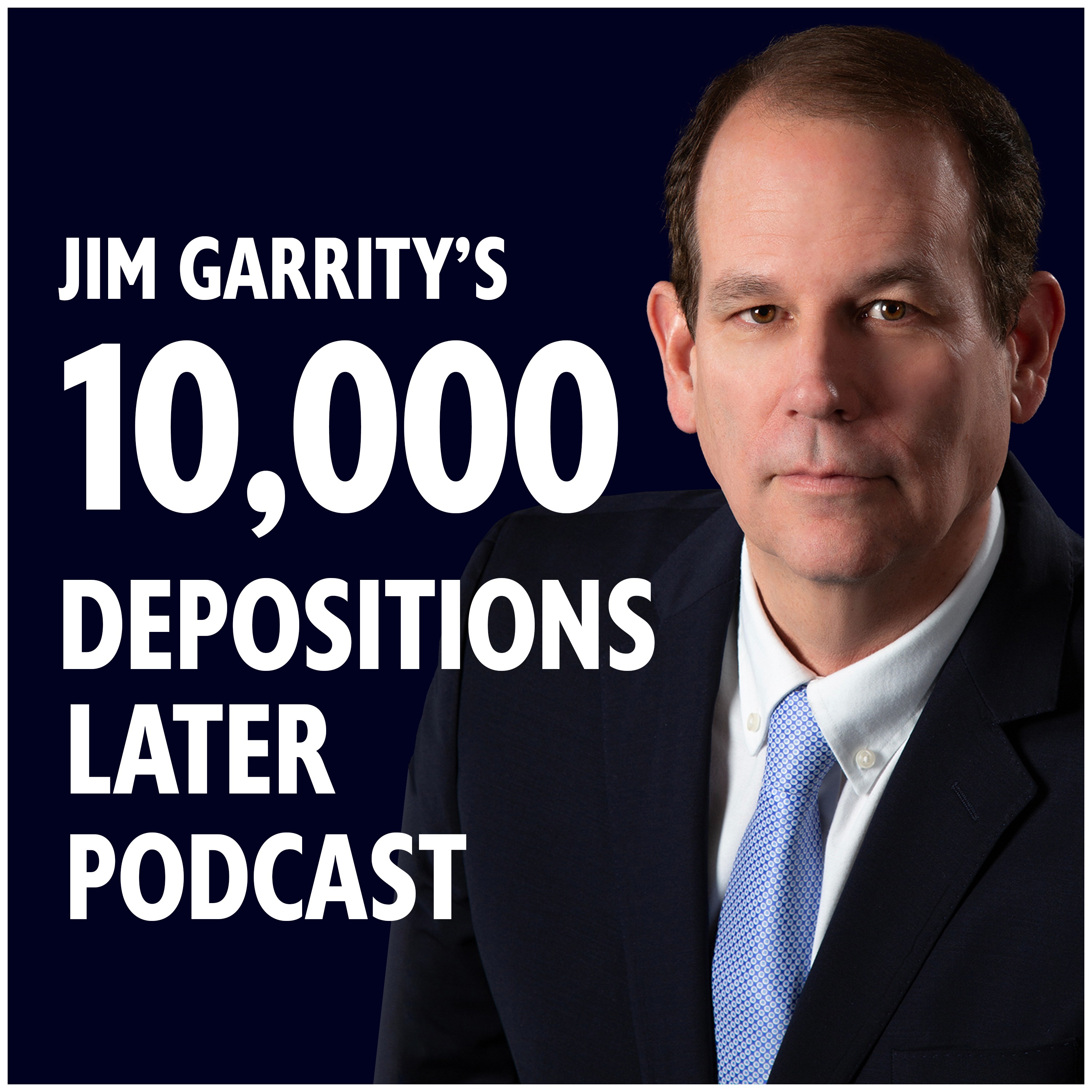
10,000 Depositions Later PodcastEpisode 53 - Core Essentials: Preparing Your Clients for Deposition, Part 2 (Helping Them Unlearn Misconceptions)In this episode, Jim Garrity stresses the importance of beginning your first deposition-specific meeting by understanding what your clients THINK about depositions. What do they think they're for? How long do they think it will take? What do they think the opposing lawyers will do with the transcript? Do they know how judges and juries use them? Your clients will always arrive with at least some beliefs - from films, from TV shows, and from friends and family. It's critical to assess their perceptions about depositions, so you know what to clear up on the way to building a...
2021-07-2907 min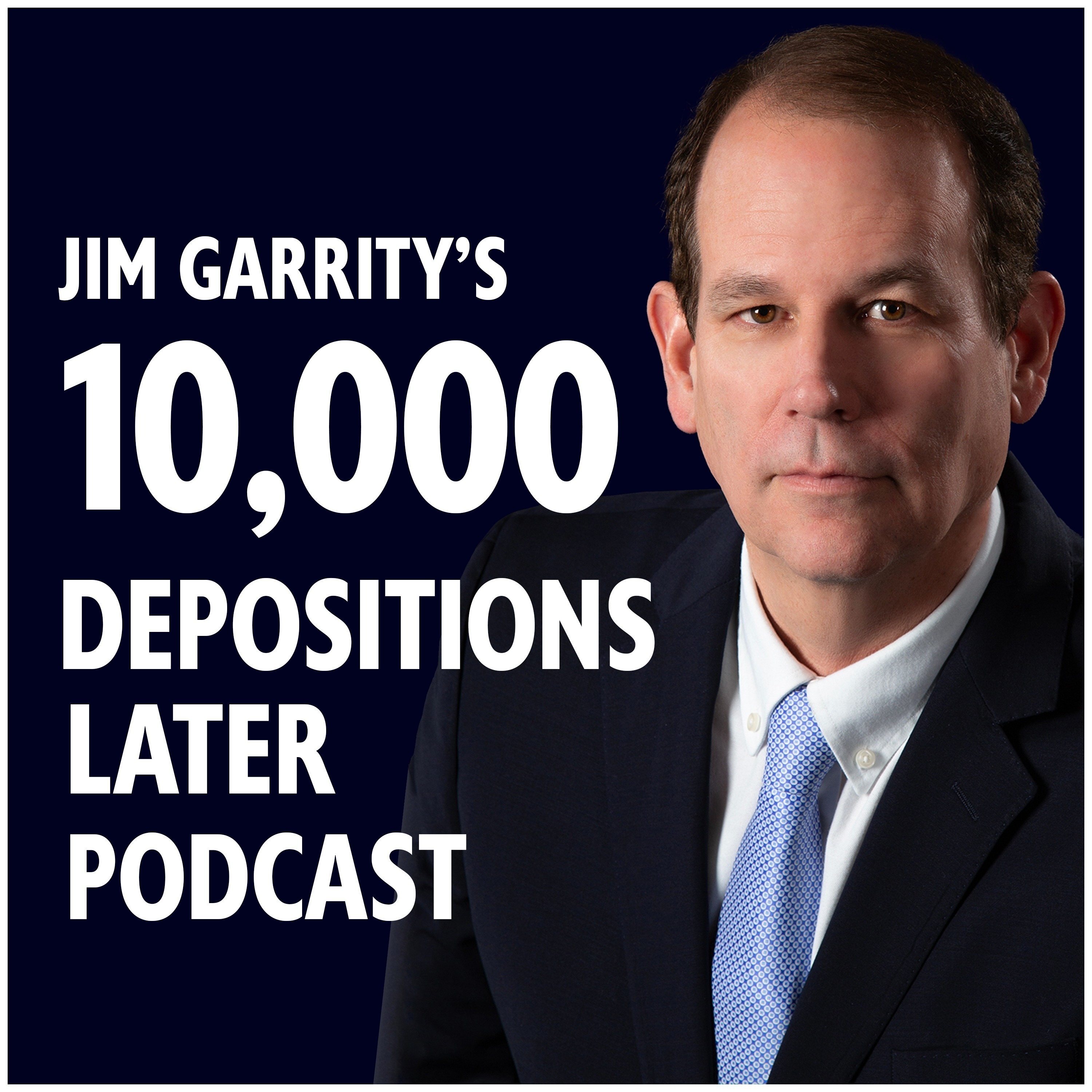
10,000 Depositions Later PodcastEpisode 52 - Core Essentials: Preparing Your Clients for Deposition, Part 1 (The In-Depth Interview)In this episode - the first in a new series on preparing your clients for deposition - Jim Garrity outlines the initial, essential steps for creating invincible deponents. That includes a deep dive into your client's background, so you're not caught off guard by side issues that could derail the case.
2021-07-1928 min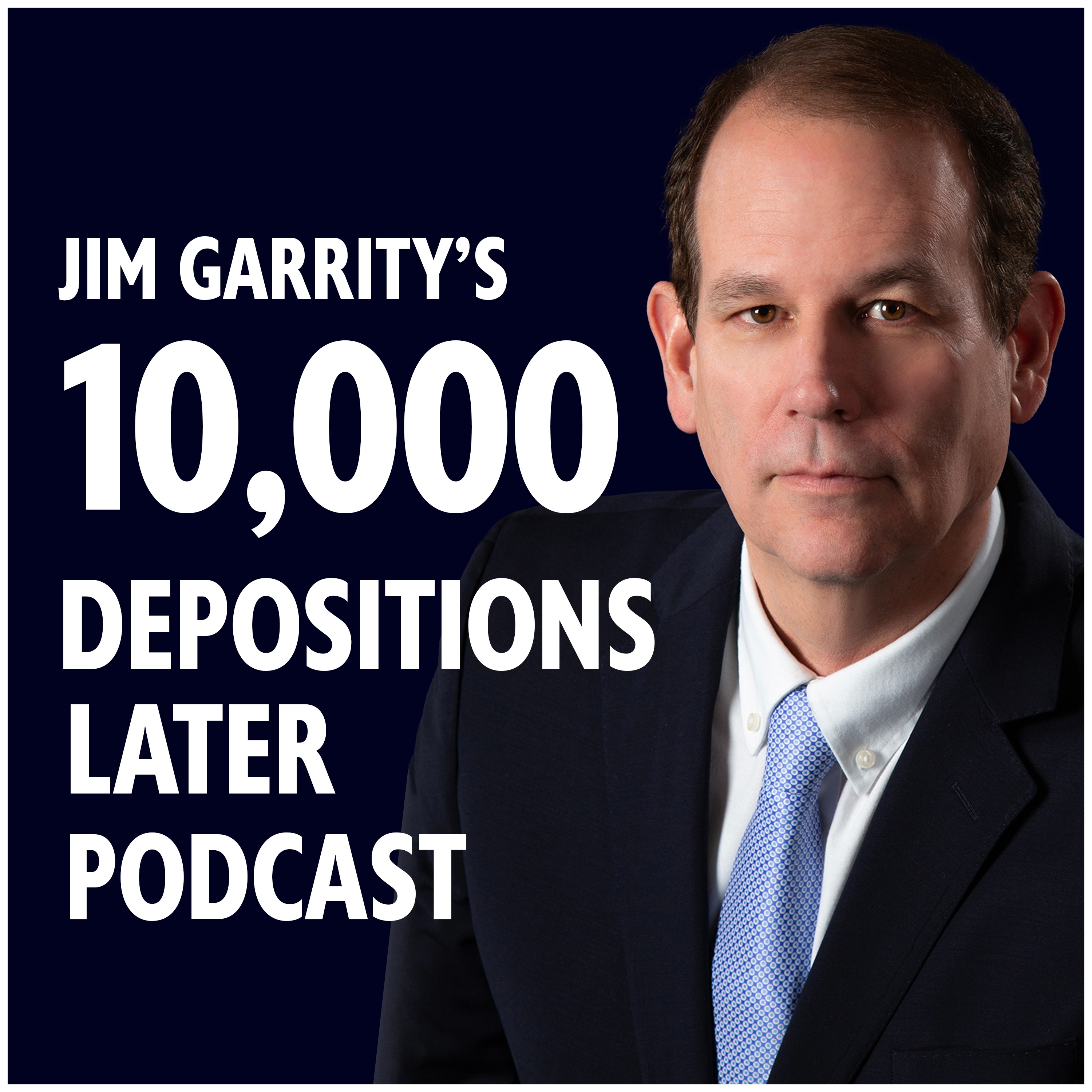
10,000 Depositions Later PodcastEpisode 50 - Do You Have A Predictable "Deposition Profile?"In this episode, Jim Garrity asks you to ponder the predictability of your approach to examining witnesses, such as the order in which you cover topics, and the similarity of your questions from deposition to deposition. Garrity refers to the cluster of tactics and styles you use as your "deposition profile," and urges you - through a series of rhetorical questions - to consider whether your predictability is allowing adversaries to more effectively prepare their deponents against you.
2021-07-0809 min
10,000 Depositions Later PodcastEpisode 49 - A Listener Asks: What if The Examining Lawyer Asks My Witness to Pull Out Her Cellphone and Disclose Texts, Phone Numbers, or Messages?A listener shared the following scenario with us, and wants to know what to do. Increasingly, and right in the middle of depositions, opposing lawyers ask, "Do you have her phone number?" or "Do you have texts/emails/pictures?" And, commonly, the answer is yes. Virtually all clients now walk into depositions with a cell-phone loaded with actual or potential evidence. Clients who testify by video from home have even more potential evidence at their fingertips. But is a lawyer who demands (in the middle of a deposition) to see a cell phone or other evidence your client has...
2021-07-0214 min
10,000 Depositions Later PodcastEpisode 48 - For Your Research Files: New Decision on Deposing Witnesses Even When the Adversary Swears They Know NothingIn this episode, Jim Garrity discusses a brand-new deposition-related decision from the U.S. Court of Appeals for the Eleventh Circuit, whose jurisdiction spans Florida, Georgia and Alabama. The appeals court held that a party should be able to depose witnesses if there is a reasonable basis to do so, even where the adversary claims the witnesses know nothing, and even if the witnesses themselves file affidavits swearing they know nothing. Witnesses who may have knowledge, the Court held, should be subject to cross-examination, and should not escape scrutiny through the use of an affidavit alone. Garrity ends the...
2021-06-2514 min
10,000 Depositions Later PodcastEpisode 47: A Listener Asks: Can An Entity Designate 29 Separate 30(b)(6) Witnesses for 30 Topics?In this episode, Jim Garrity takes a question from one of our listeners. The listener served up a 30(b)(6) topic list covering 30 specific topics. in turn, the entity said, it would produce 29 separate designees. Our listener asks: Can they do this? Is this abusive? Listen in to hear Garrity's response and practice tips. As always, the full citations for cases mentioned in each episode are listed below in the show notes for your quick reference. And if you have questions you would like covered in a future episode, send them in! You can email our production staff at Jim...
2021-06-2216 min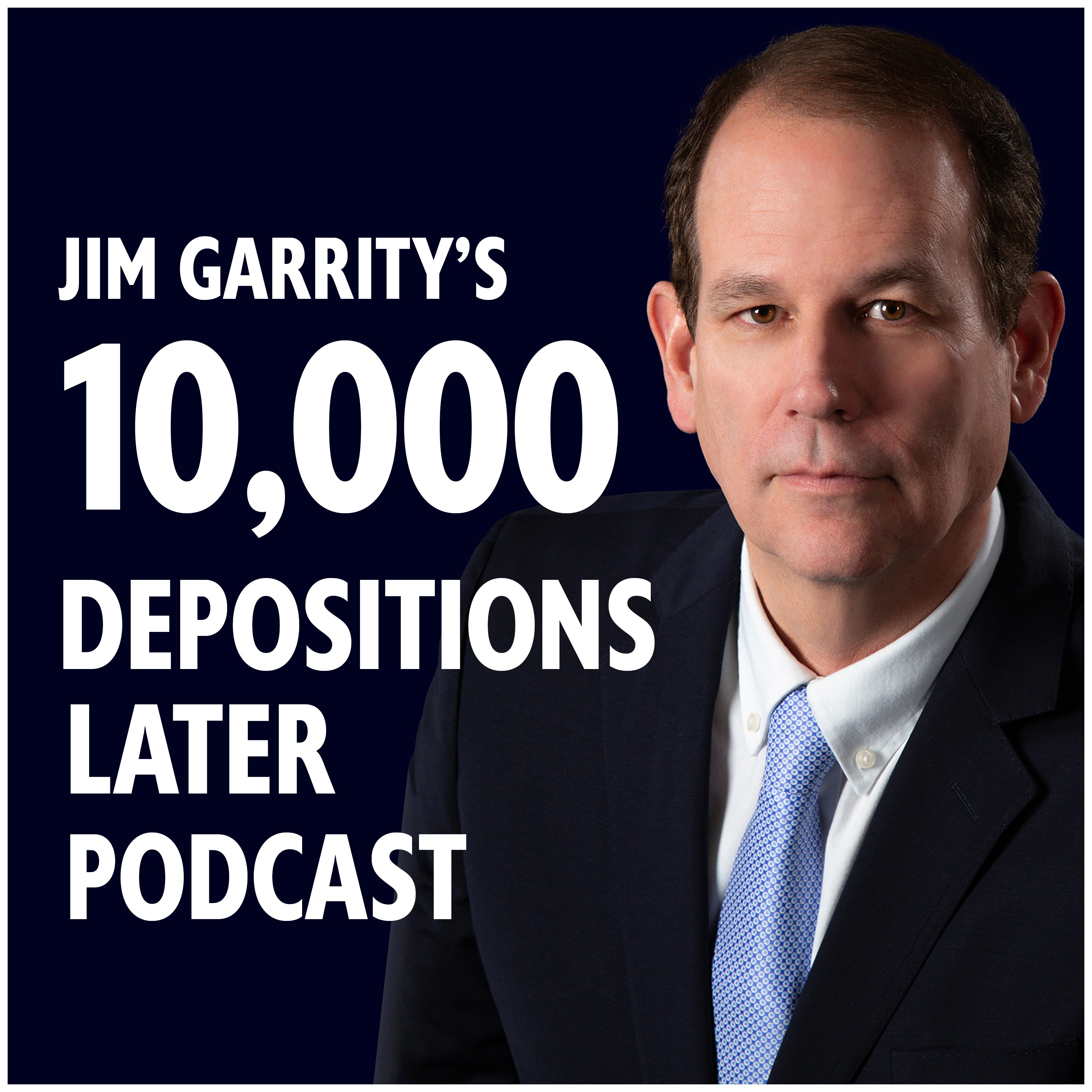
10,000 Depositions Later PodcastEpisode 46 - Lessons from the Front Lines: What to Do When Your Opponent Notices Their Experts for Deposition Before You DoYour opponent just served its expert disclosures and reports. You then get a deposition notice - they're going to immediately depose their own experts! And since these depositions may be used at trial - experts often meet the test of unavailability - you might be forced to conduct your trial cross-examination prematurely, before you've had a chance to conduct discovery depositions of them. What now? In this episode, Jim Garrity spotlights a June 15, 2021 court ruling in which a federal judge confronted this very situation. The defendant complained the tactic was unfair and thwarted the principles of discovery. The plaintiff...
2021-06-1723 min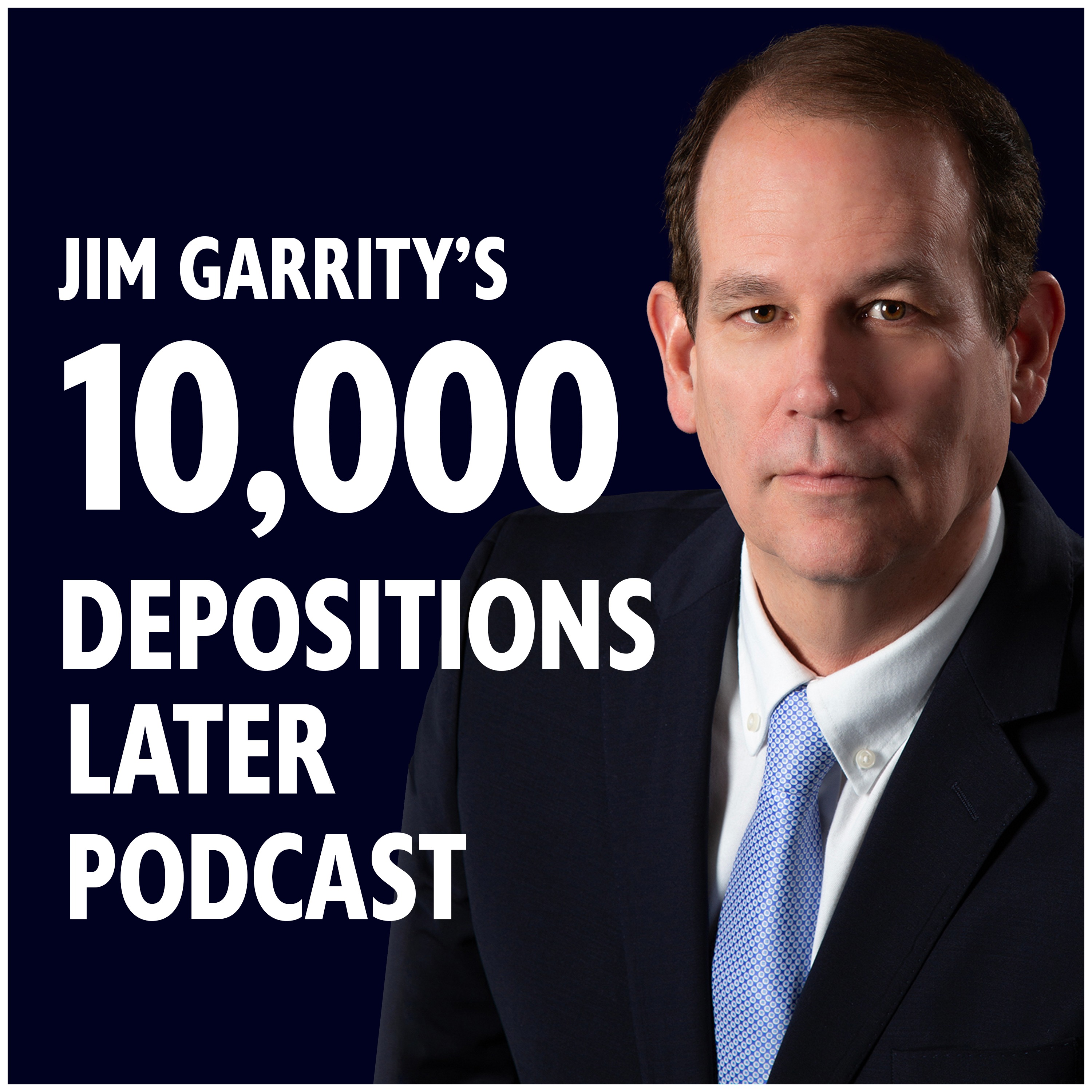
10,000 Depositions Later PodcastEpisode 45 - Objectionable Objections: When Defending Lawyers Claim THEY Don't Understand the QuestionThere are probably few things more irritating, when examining a deponent, than having the defending lawyers repeatedly interrupt and claim they don't understand your questions. It's bad enough when witnesses feign ignorance of the obvious. But the opposing lawyers, too? In this episode, Jim Garrity tackles the subject of lawyers who engage in obstruction-by-colloquy, and how to deal with it. Helpful case citations in the show notes, below. Thanks for listening.SHOW NOTESMusto, et al. v. Transport Workers Union of America, AFL – CIO, et al., 2009 WL 116960 (E. D. Ne...
2021-06-1017 min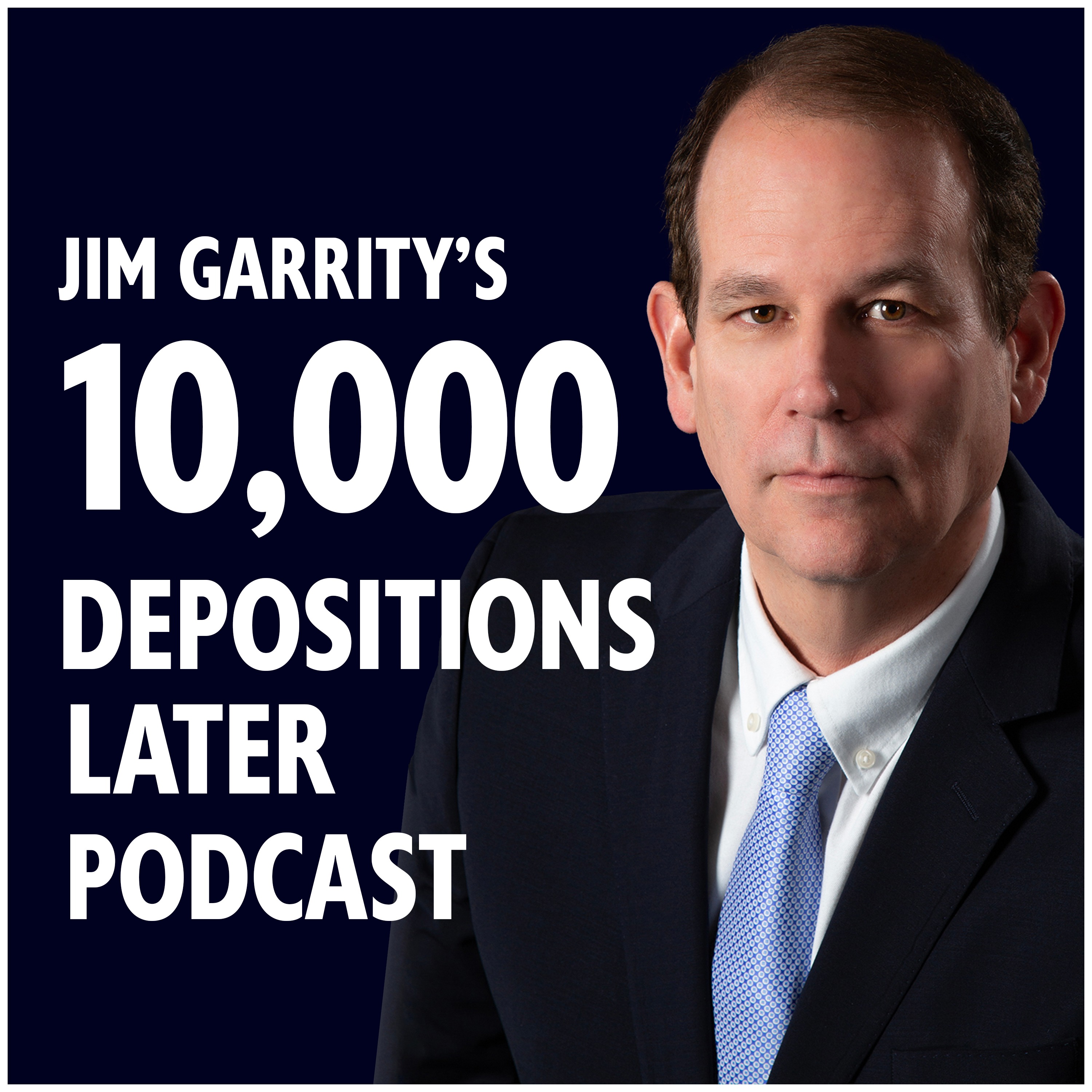
10,000 Depositions Later PodcastEpisode 43 - What to Do When Subpoenaed Non-Party Witnesses Fail to Appear for DepositionYou properly subpoenaed the non-party witnesses. You issued the subpoena from the correct court, and you even included a check for mileage. You did everything right. (Yay you!) But they still failed to show up. Now what? Do you ask the court to compel the non-party witnesses to appear for deposition? And/or hold them in contempt? Or should you do nothing more now, but later seek to bar them from testifying at trial because of their failure to cooperate? One of those two options is a best-practices approach. The other is a potential disaster. Jim Garrity tells you...
2021-05-2616 min
10,000 Depositions Later PodcastEpisode 42 - Lessons from the Front Lines - Carefully Choose the Documents You Use to Prepare DeponentsIn this Lessons from the Front Lines episode, where we review brand-new deposition-related cases from around the country, Jim Garrity discusses two decisions that highlight the importance of - and risks associated with - choosing the documents you used to prepare deponents, especially unrepresented non-party witnesses. Garrity shares key insights, and offers practical tips at the end of the episode. The cases upon which this episode is based are cited in the show notes.SHOW NOTES:Rodolfo Tecocoatzi-Ortiz, et al. v. Just Salad LLC, 2021 WL 2011913, Case No.: 18-CV-7342-JGK-BCM (S.D.N...
2021-05-2214 min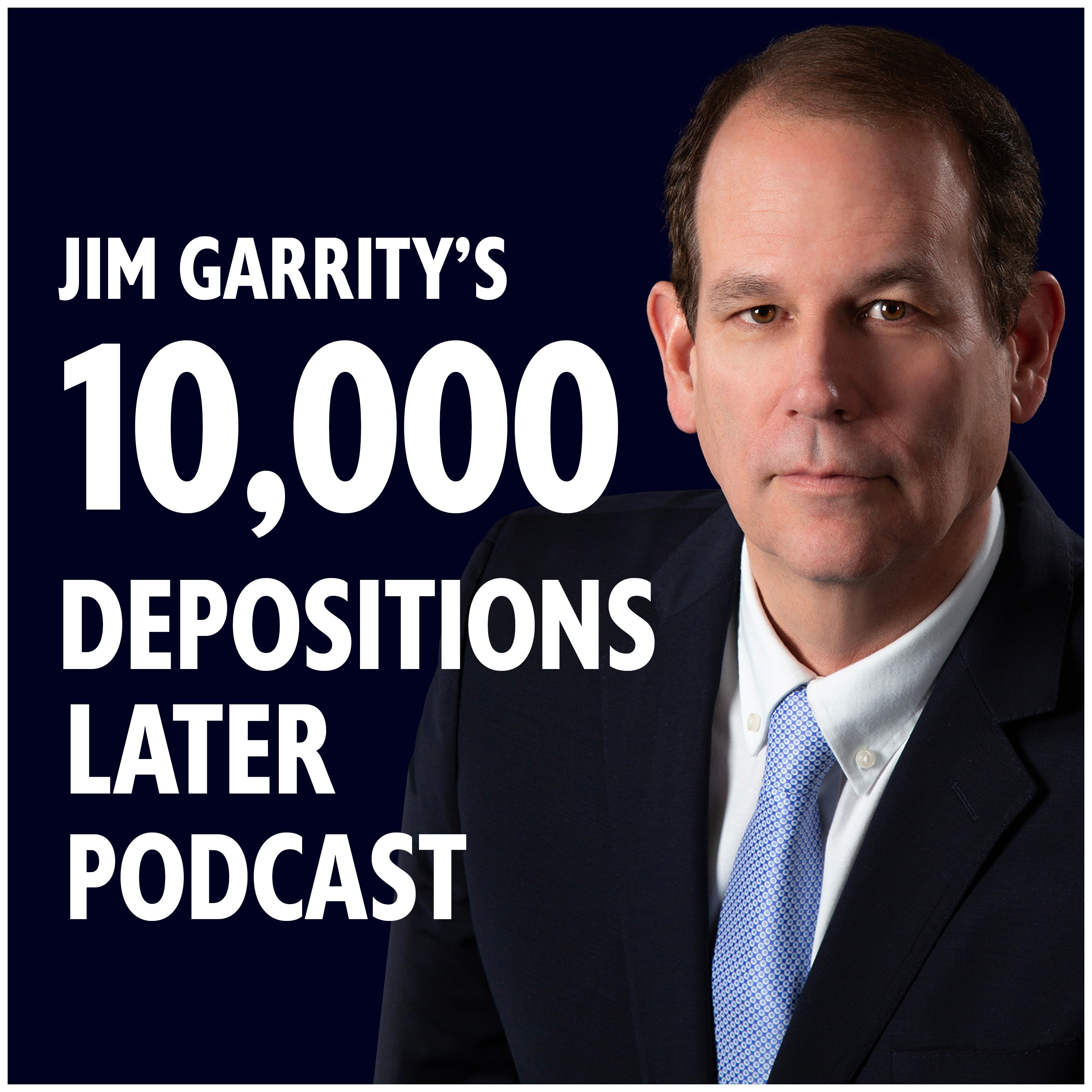
10,000 Depositions Later PodcastEpisode 41 -Developing Deposition Testimony of Adverse Witnesses So You Can Lead Them During Your Case-In-ChiefIn this episode, Jim Garrity offers practical tips for developing deposition testimony that will allow you to use leading questions when examining adverse witnesses you'll call during your case-in-chief at trial. Being able to lead so-called "611(c)(2) witnesses" before the jury is a tremendous advantage, but you've got to first build the foundation. Garrity explains the requirements of Fed. R.Evid. 611(c)(2), and offers numerous lines of deposition inquiries to meet your burden.SHOW NOTESMcleod v. Llano, No. 17CV6062ARRRLM, 2021 WL 1669732, at *8 (E.D.N.Y. Apr. 28, 2021) Here, Officer Prinston is...
2021-05-1219 min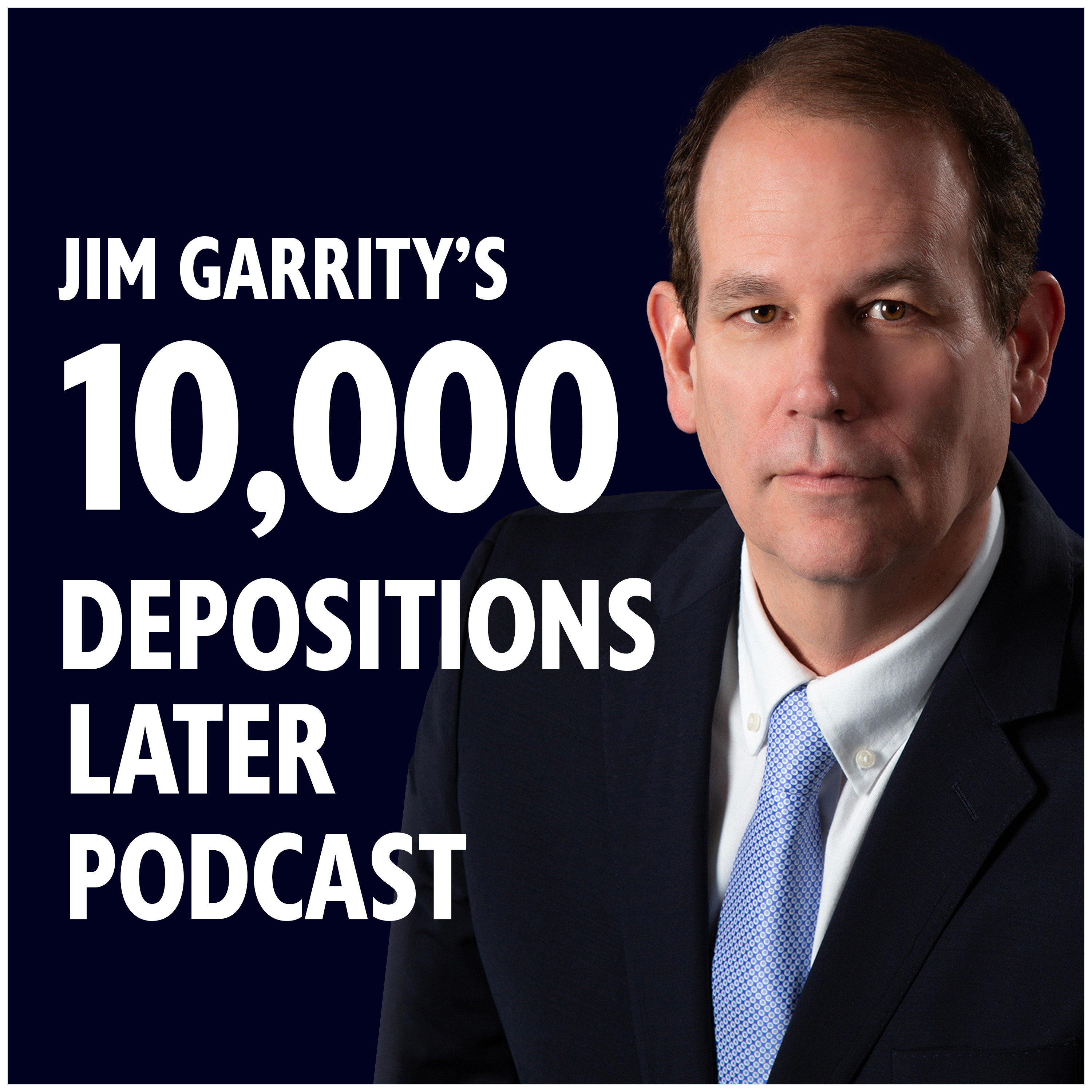
10,000 Depositions Later PodcastEpisode 40 - Lessons from the Front Lines: I Bet He Didn't Think His Speaking Objections Would be Played for THAT Audience.In this Lessons from the Front Lines installment - our special episodes where Jim Garrity shines the spotlight on a brand-new court decision of interest to litigators - a judge on April 25, 2021 dealt with a lawyer's alleged coaching during a deposition in a novel, embarrassing and potentially damaging way. The full case citation appears in the show notes below.As always, thank you so much for listening. We greatly appreciate it. And please do take a moment to leave us a five star rating wherever you get your podcast. It's a great way to say thank you...
2021-05-0407 min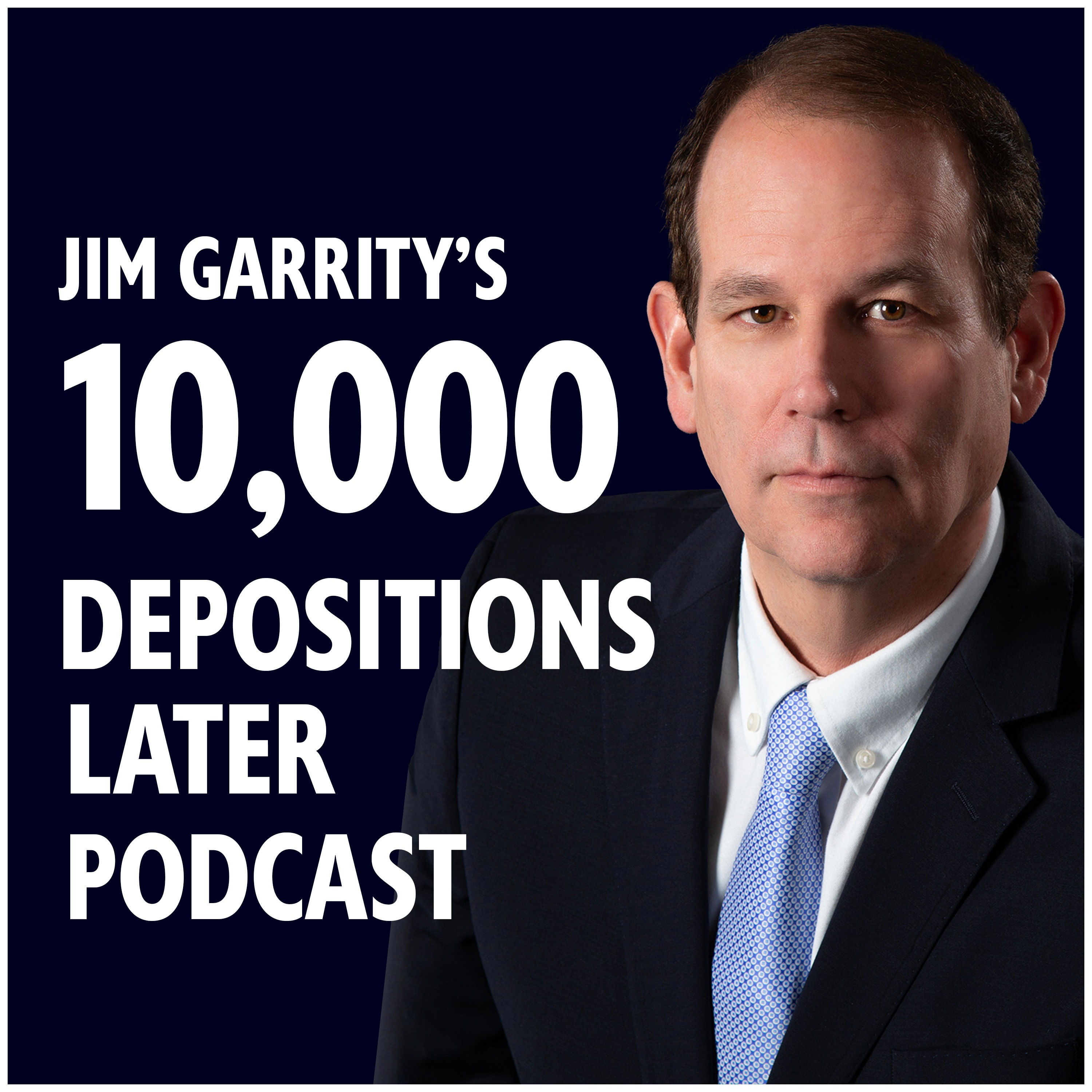
10,000 Depositions Later PodcastEpisode 39 -Do You Need 75, 100, or 150 Interrogatories? FRCP 30(b)(6) to the Rescue!In this episode, Jim Garrity encourages you to think of Fed.R.Civ.P. 30(b)(6) depositions as an ingenious, unlimited source for additional interrogatories, if you need more than is allowed by rule. Rule 30(b)(6) depositions (and their topic lists) are close cousins of the interrogatory, because both result in responses that are the voice of, and bind, the responding entity. This is the kind of thinking that Garrity urges - the use of deposition rules and procedures as tools that can be used in conjunction with, and to build on, other discovery devices....
2021-04-2906 min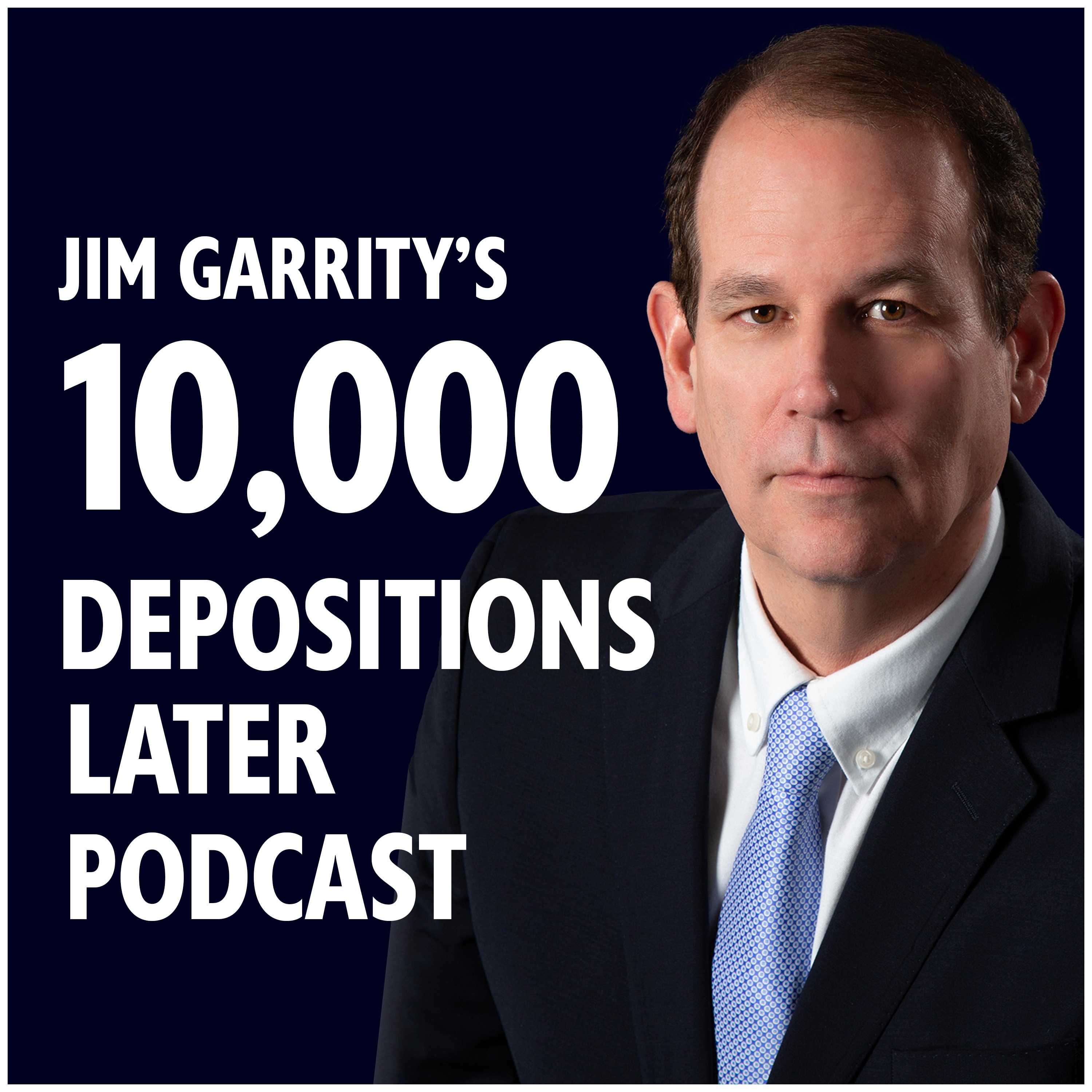
10,000 Depositions Later PodcastEpisode 38 - Can More than One Lawyer for A Party Question the Deponent? in a conversation with other lawyers recently, Jim Garrity was asked whether more than one lawyer for a party can question the witness in a deposition. This episode addresses that topic, explains how courts view it, and offers practical suggestions, as always, if you face or wish to use this strategy. The show notes contain eight reported decisions that will help get you started if you need to conduct research for one of your cases.Please take a moment and leave us a five-star review wherever you get your podcast. These episodes take considerable time and resources...
2021-04-2207 min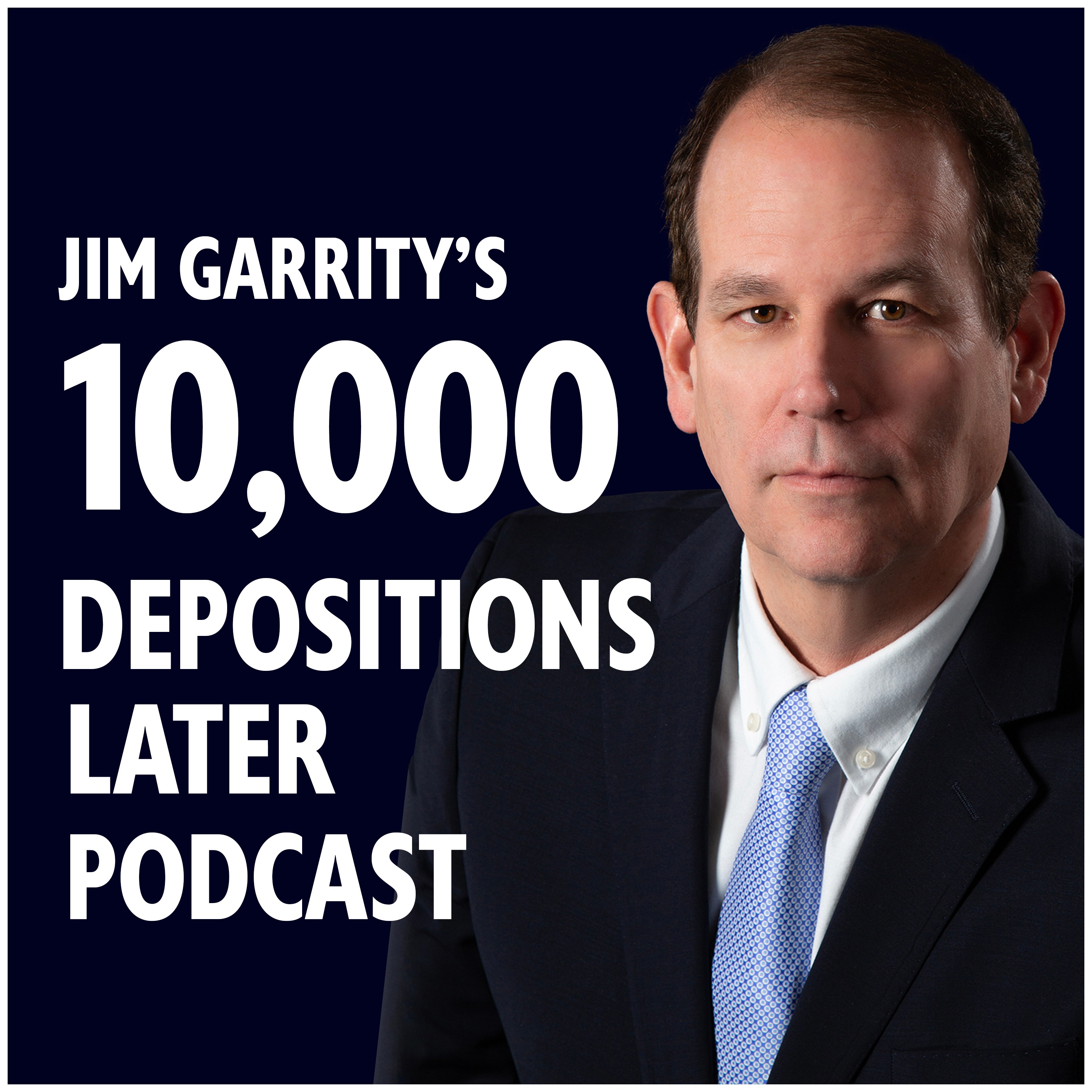
10,000 Depositions Later PodcastEpisode 37 - Witnesses for Whom Your Examination Might Best Be Left for TrialIn this episode, Jim Garrity, fresh from a five-day jury trial - his first since March 2020, when COVID-19 began shutting down courtrooms everywhere - shares thoughts about passing on depositions of important but limited-knowledge witnesses, and instead hitting them with your cross for the first time in front of the jury. His decision in that case not to depose the top official of a statewide agency, and another senior official within the same agency, paid off. Both were called to the stand and performed poorly, because they'd had no prior exposure to the lines of examination. Garrity explains his...
2021-04-2011 min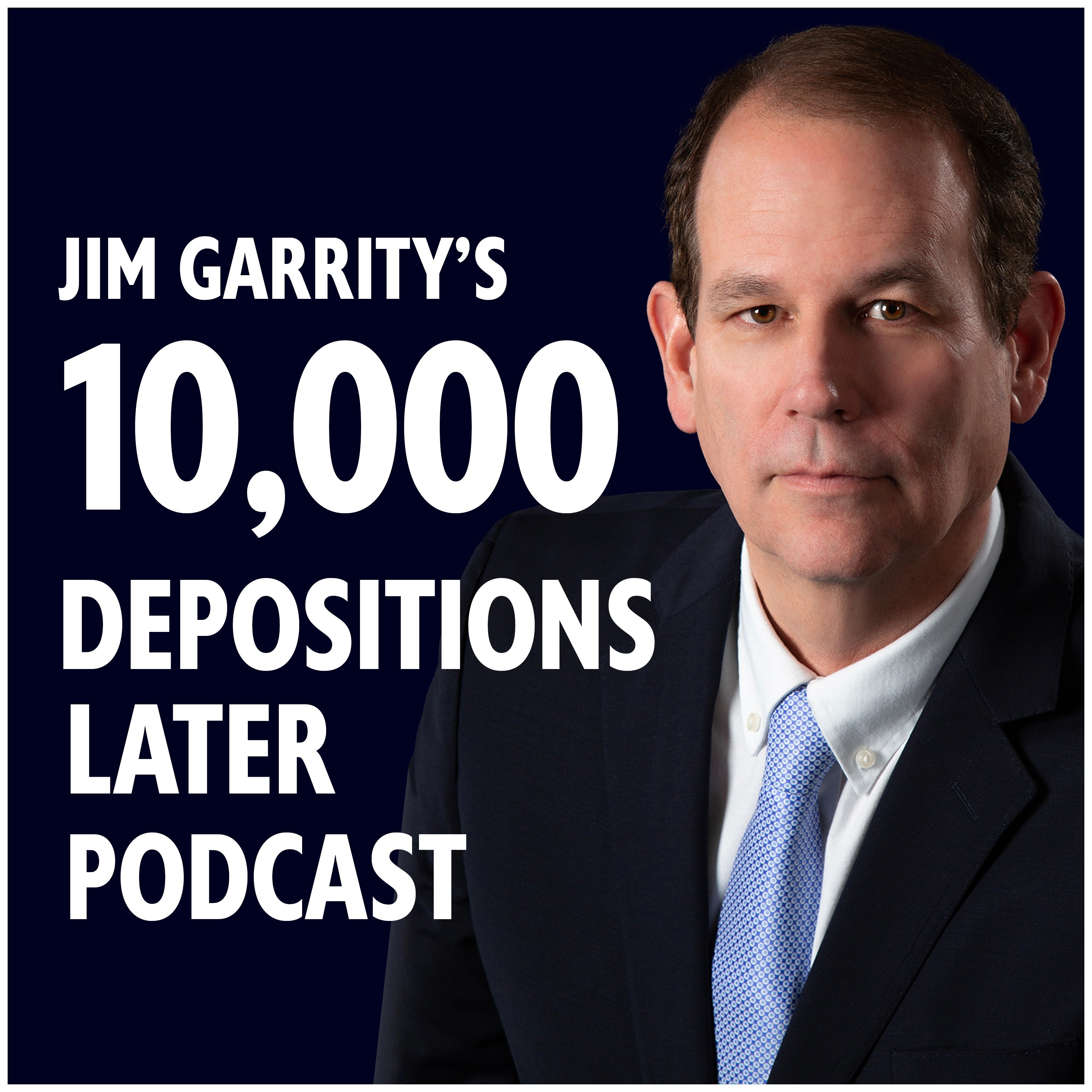
10,000 Depositions Later PodcastEpisode 36 - Can an Entity Later Use Affidavits to Contradict the Testimony of Its 30(b)(6) Designee?We've all heard the mantra that the testimony of a corporate or organizational representative under Fed. R. Civ. P. 30(b)(6) or its state analogues is "binding on the entity." But is it? Does an entity have fewer rights to later serve affidavits that contain contradictions of varying magnitudes than an individual deponent does? In this episode, Jim Garrity answers the question, offers practical tips, and provides supporting case citations in the show notes.Please do us a small favor. Sure to rate us five stars on whatever site you get your podcasts. Higher ratings...
2021-04-0509 min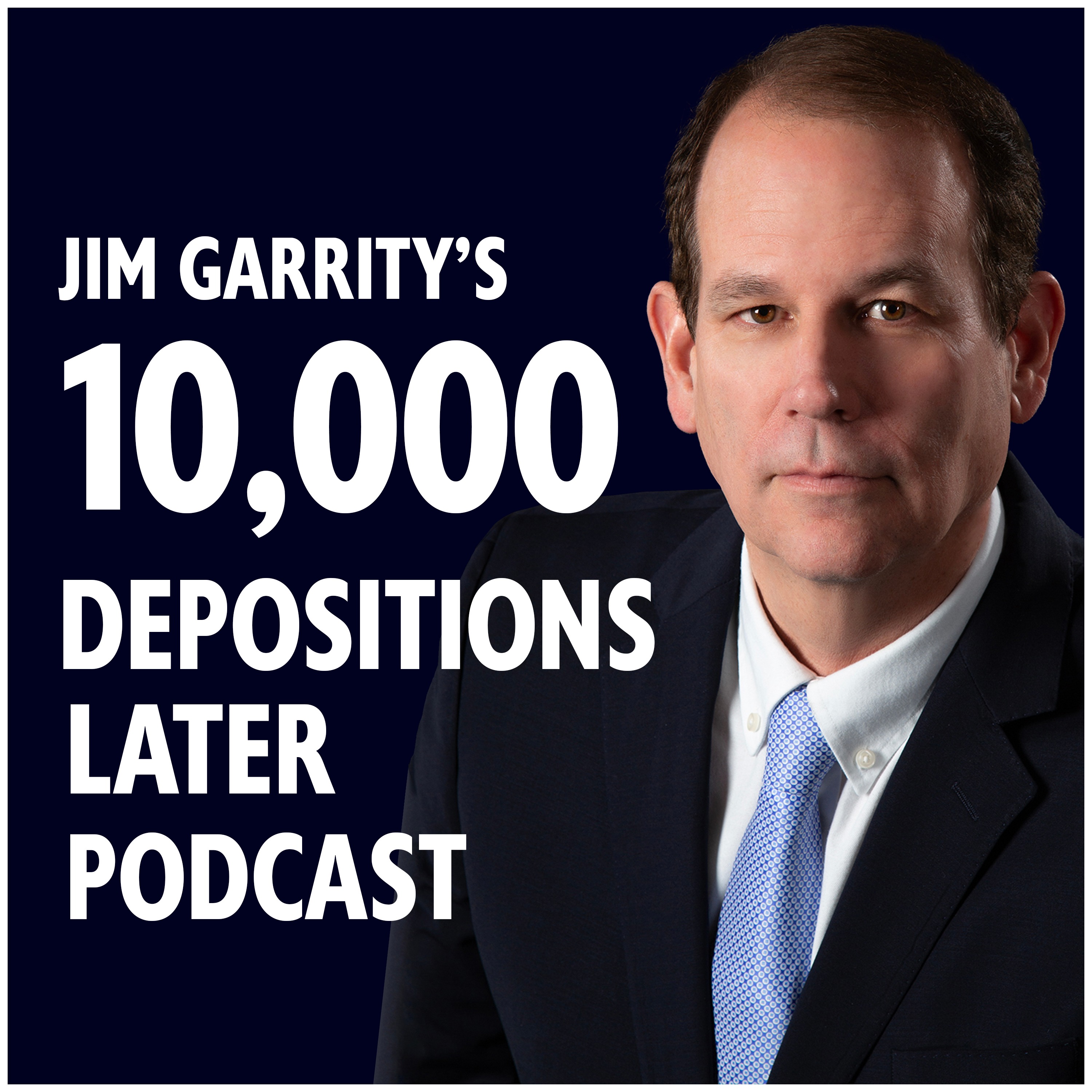
10,000 Depositions Later PodcastEpisode 35 - Lessons from the Front Lines: Excellent Remote Deposition Protocols for Your DepositionsMany lawyers are still struggling to find just the right guidelines or protocols for taking or defending remote depositions. The opportunities for deposition misconduct are many in the absence of binding agreements about who's going to be where doing what. In this episode, Jim Garrity spotlights two decisions, one just five days old, in which the courts approved excellent, detailed protocols for conducting depositions remotely. The two cases are cited in the show notes. If for some reason you can't access them, email our staff at jim@jimgarritylaw.com, and we'll gladly send you copies of both decisions at...
2021-04-0202 min
10,000 Depositions Later PodcastEpisode 31 - Clearing Out the Testimonial Cobwebs at the Start of Your DepositionsWhat's the best way to prevent evasive witnesses, as you wrap up their depositions, from claiming they didn't understand many of your questions, and/or that they were operating under some impairment, and so their answers shouldn't count? Jim Garrity shares a story about a deposition last week in which an adverse witness did exactly that. She claimed she hadn't understood many of his questions, and wanted him to repeat most of them. Jim tells us it was clear the witness had given many false answers, and was looking for a way out. In this episode, he shares his ins...
2021-03-0410 min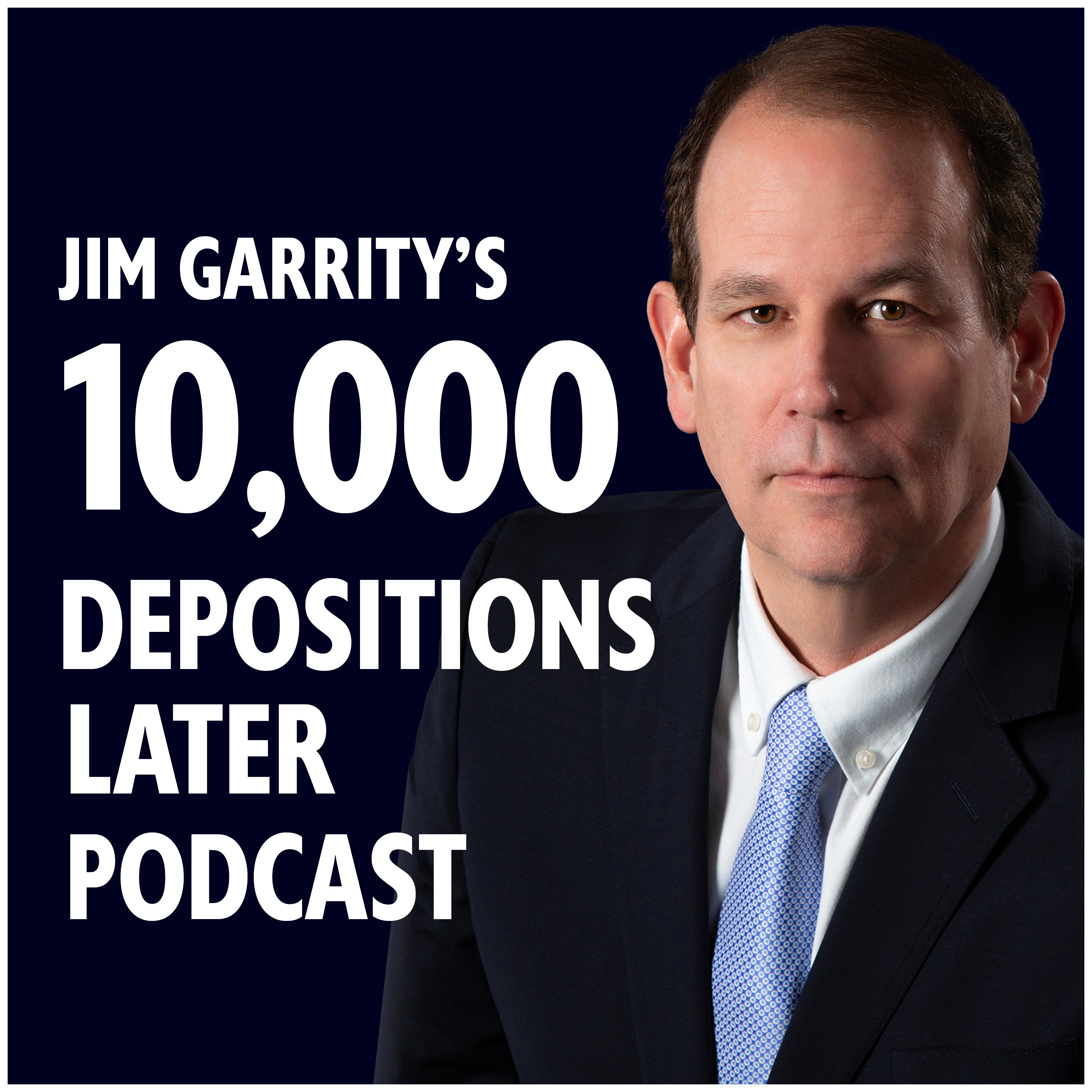
10,000 Depositions Later PodcastEpisode 30 - How to Sharply Reduce the Cost of Deposition TranscriptsIf you're like Jim Garrity, court reporting and transcript costs have become a major factor in your firm's or organization's operations. Smaller firms are having trouble surviving, because they can't afford to carry tens of thousands of dollars in transcript costs. Larger firms are having to adjust as well. What to do? In this episode, Jim identifies some excellent alternatives to traditional stenographic reporting services. Depending on the size of your practice, these alternatives can save you tens of thousands of dollars in every case. As always, you'll find links in the show notes for anything Jim mentions. Note...
2021-03-0218 min
10,000 Depositions Later PodcastEpisode 29 - Lessons from the Front Lines: Are You Entitled to Depose a Witness Previously Deposed by Another Party?In this Lessons from the Front Lines episode, based on a February 1, 2021 federal court ruling, Jim Garrity takes Episode 28 a step further. Previously, we addressed the question whether you can, as a matter of right, take multiple depositions of the same witness.In this episode, we ask the next question: What if another party first notices and takes the deposition of a witness under Fed. R. Civ. P. 30? Will that prevent you from separately noticing and deposing the same deponent later? Under this scenario, you didn't notice the first deposition, didn't cross-notice it, and fo...
2021-02-1511 min
10,000 Depositions Later PodcastEpisode 28 - Preventing (Or Obtaining) A Second Deposition of A Party or WitnessYour opponent sends you an email saying he just needs an "update deposition" of your client. What say you? In this episode, Jim Garrity notes that an "update" deposition is just a second deposition in sheep's clothing. And you'd better think twice about allowing it. Garrity tells you how to oppose it, and provides a dozen specific arguments to make. In the interests of balance, he also offers a dozen arguments to make in favor of a second deposition, if you're seeking one. The show notes below contain the full citations to 23 cases on the issue, and on which this...
2021-02-0422 min
10,000 Depositions Later PodcastEpisode 27 - Is It Okay to Confer with Clients About Their Testimony During Deposition Breaks?Have you ever had a lawyer challenge you about conferring with your client during breaks in depositions, or suggest that you're violating some rule or ethical norm by doing so? Or, even instruct your clients before a break not to discuss their testimony with anyone - you included? The pesky notion that it's wrong to talk to clients about their testimony during deposition breaks appears to have its genesis in Hall v. Clifton Precision, a 1993 federal court ruling. But does Hall accurately represent the law, and governing rules? Jim Garrity confronts this issue, discusses the subsequent treatment of Hall...
2021-01-2614 min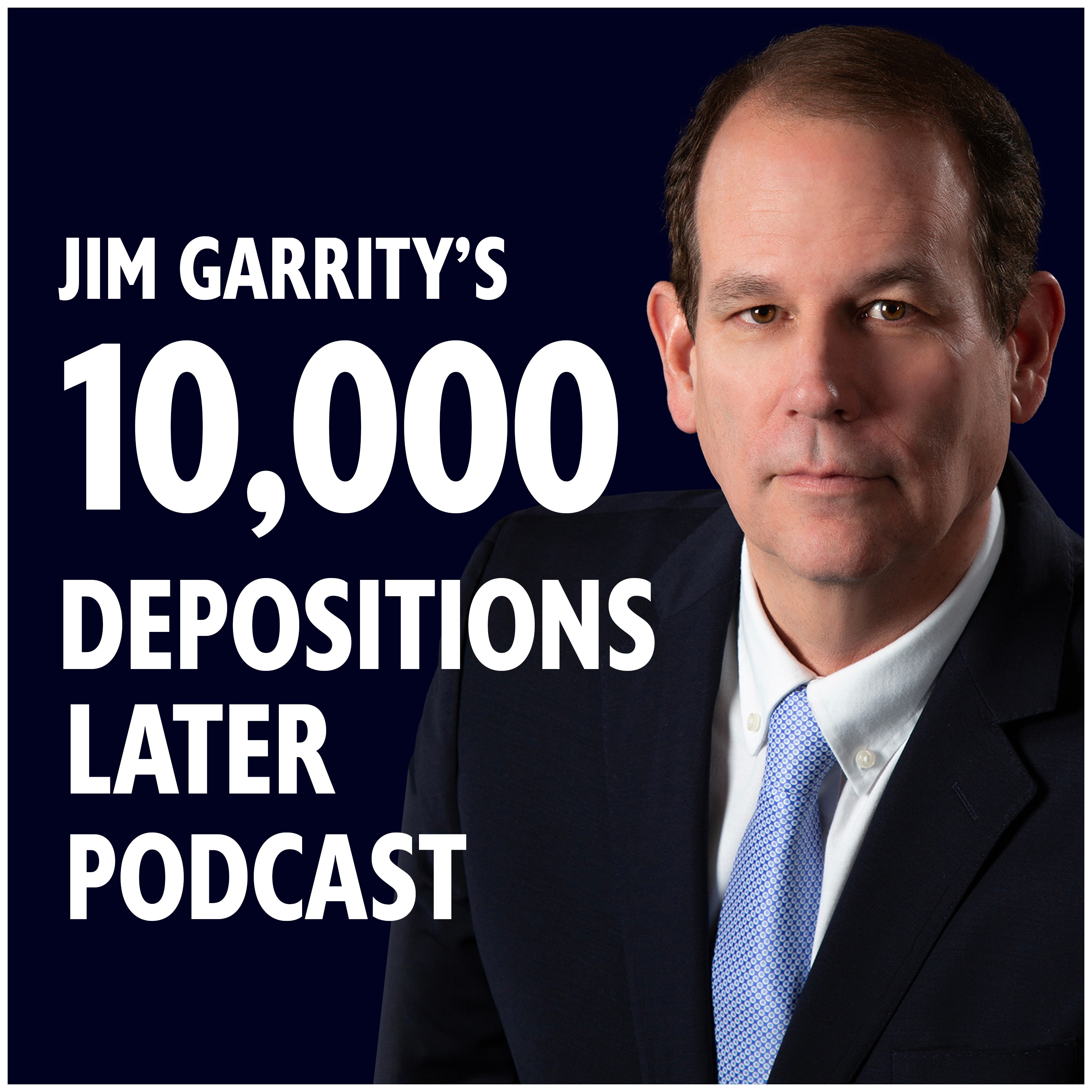
10,000 Depositions Later PodcastEpisode 26 - Lessons from the Front Lines: Regret Terminating a Deposition? UN-terminate It Immediately.In today's Lessons from the Front Lines - special episodes where we spotlight new deposition-related rulings in active lawsuits around the U.S. - Jim Garrity takes a look at a California case where a deponent and his counsel terminated a deposition, but then smartly took steps to immediately resume it - within just nine minutes - and effectively avoided sanctions. It was a great tactic. Jim discusses the details and offers practical tips about how to undo the harm when you've made a similar decision. Case details are in the show notes below....
2021-01-1813 min
10,000 Depositions Later PodcastEpisode 25 - Can You Be Sued for Questions You Ask in Depositions?In this episode, Jim Garrity talks about the risk litigators face of being sued for asking deposition questions that deponents perceive as defamatory or malicious. Jim reviews the "litigation privilege," both in its absolute and qualified form, and offers practical tips based on nearly a dozen real-life cases, where deposition questions or conduct led to lawsuits against the lawyers, their clients, or both. Case cites for your use appear below in the show notes.SHOW NOTES:(Note: We add new cases on an episode topic as they are published. This episode contains one or more...
2021-01-1526 min
10,000 Depositions Later PodcastEpisode 24 - The Stunning Consequences of Setting "Short-Notice" DepositionsJoin Jim Garrity in a deep dive into the law of short-notice depositions, which can trigger astonishingly severe consequences. The federal rules define "short notice" as a deposition set with less than 14 days' notice. In this episode, Jim outlines the rule, the cases, and more than a dozen tactical tips and pointers. And be sure to check out the show notes, below, which cite to a few dozen decisions on point, all with full case citations and parentheticals, to help you get started when the issue pops up for you.CASES:Lee...
2021-01-0445 min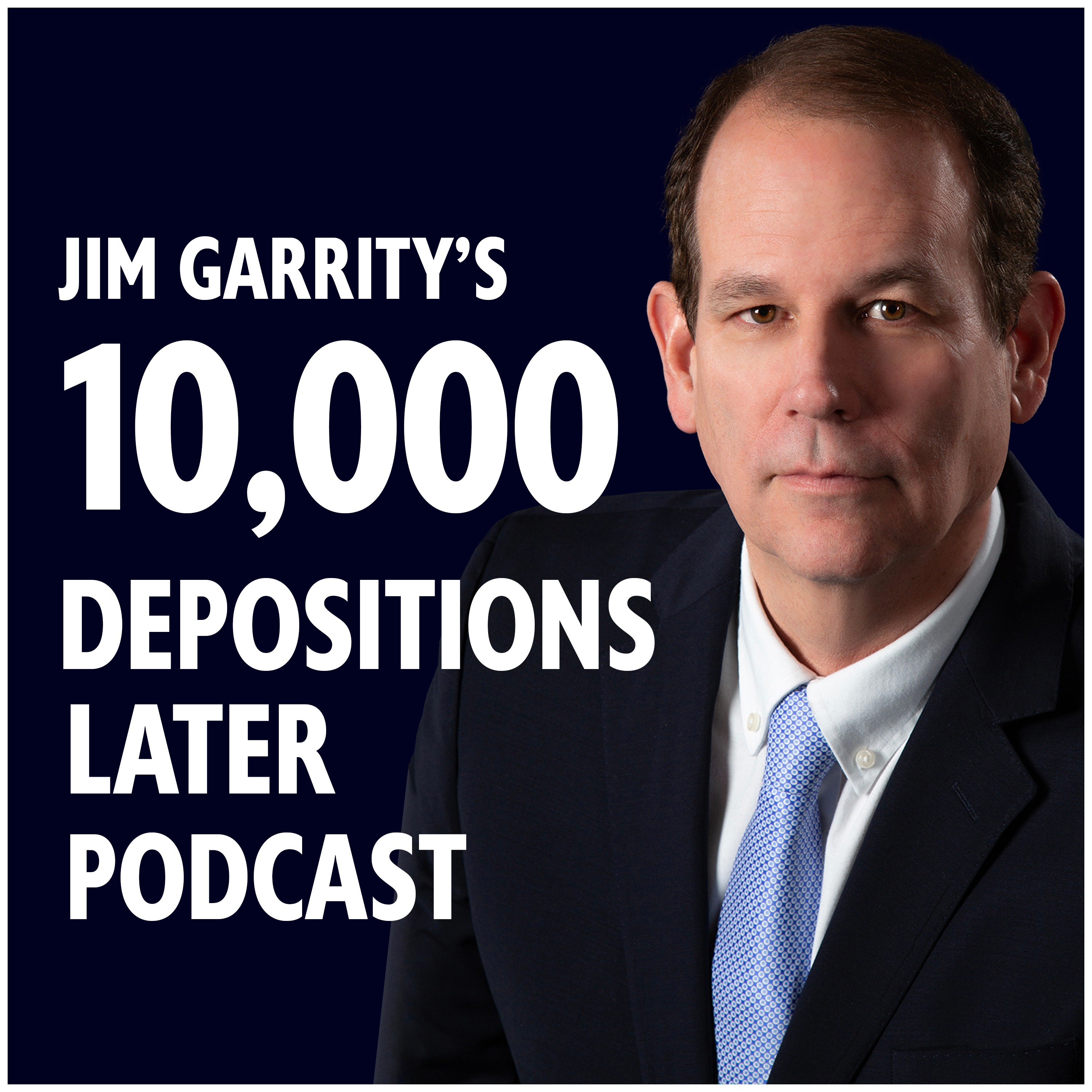
10,000 Depositions Later PodcastEpisode 23 - Cross-Notice Jiu Jitsu: Using An Opponent's Cross-Notice Against ItIt's not unusual for adversaries to cross-notice your key depositions, either of their own witnesses or of non-party deponents. That allows them unfettered ability to conduct a wide-open, more focused followup examination (after listening to yours). In this episode, Jim Garrity shares a tactic for flipping the script on your opponents, forcing them to go first, and allowing you to sit back and learn what the lawyer and deponent really know before it's your turn.
2021-01-0407 min
10,000 Depositions Later PodcastEpisode 22 - FRCP 29(a) Stipulations: A Way to Save Time, Money & HeadachesIn this episode, Jim Garrity talks about one of the greatest time and money-saving tools you've never heard of. Fed. R. Civ. P. 29(a) stipulations allow you to eliminate both expected and unexpected hassles in your depositions, and even to eliminate court reporters, for tremendous cost savings. Jim outlines the rule, offers nearly a dozen great practice tips, and includes (in these show notes, below) nearly twenty case citations, complete with detailed parentheticals. Your homework's been done for you.Cases Mentioned in, Or Relevant to, This Episode:Kraese v. Jialiano Qi, etc. 2020 WL 4016250 (S.D...
2020-12-2630 min
10,000 Depositions Later PodcastEpisode 21 - Wizards and Codes: How to Precisely Track The Elapsed Examination Time During A DepositionDid you know your court reporter's machine keeps track of the total elapsed time of the examination while the deposition is in progress? Right down to the second? And that the reporter can easily share that elapsed time with you as the deposition progresses? Did you also know that you can ask the reporter to add - on the transcript itself - the exact time (also down to the second) of each question you asked, and of each answer given by the deponent? These two functions, called the "timekeeping wizard" and "time code," are worth their weight in gold...
2020-12-1604 min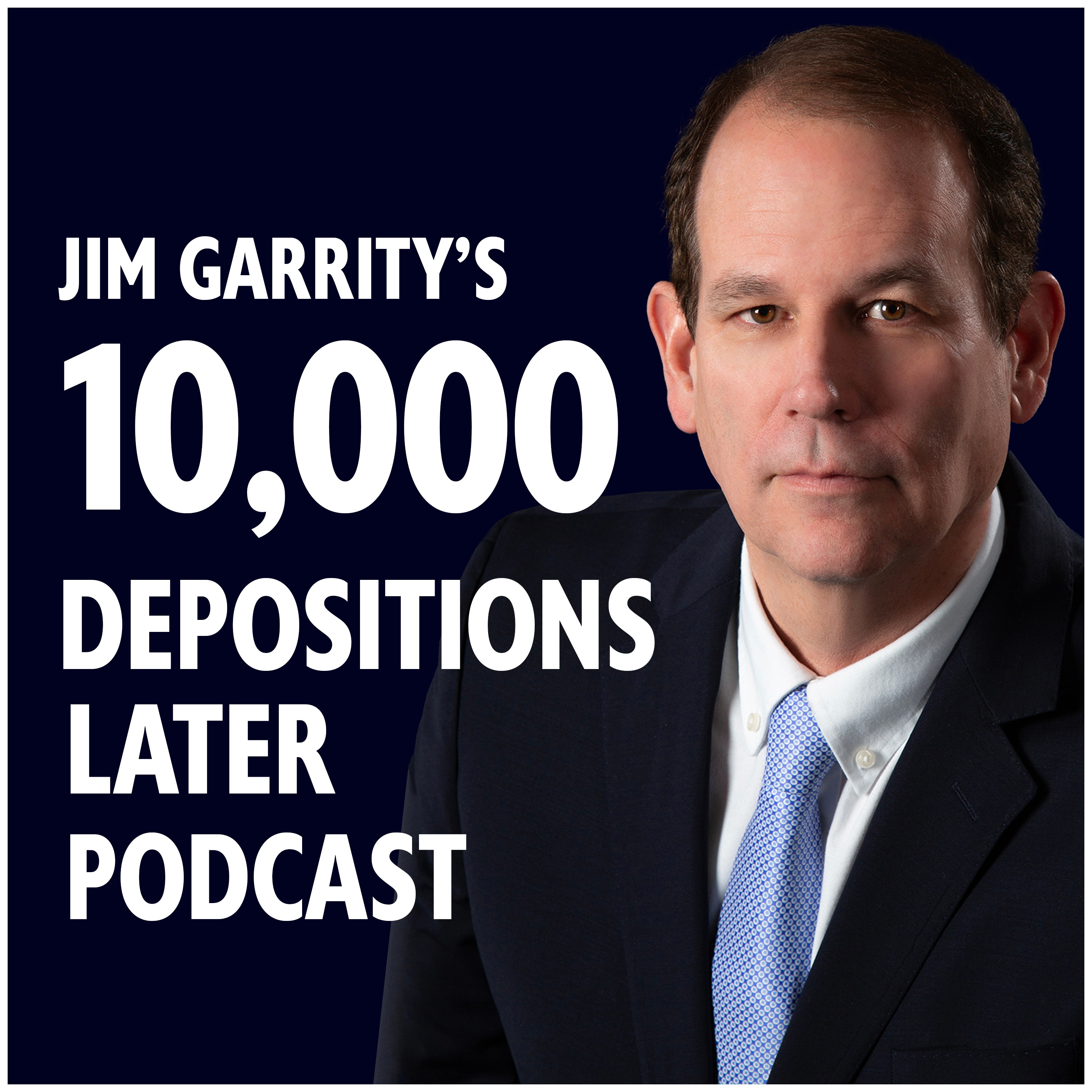
10,000 Depositions Later PodcastEpisode 20 - Apex DepositionsYou need to depose a high-ranking government or corporate official, but their lawyer refuses, saying the official is protected by the Morgan Doctrine, sometimes called the Apex Doctrine. This principle stands for the proposition that high-level officials may be able to avoid being deposed by showing either that they lack meaningful personal knowledge or that others of lower rank can provide the same information. In this episode, Jim Garrity explains the doctrine, and offers practical insights into the factors courts take into account in allowing, or in blocking, these depositions. As always, Jim has provided helpful case cites below...
2020-12-1312 min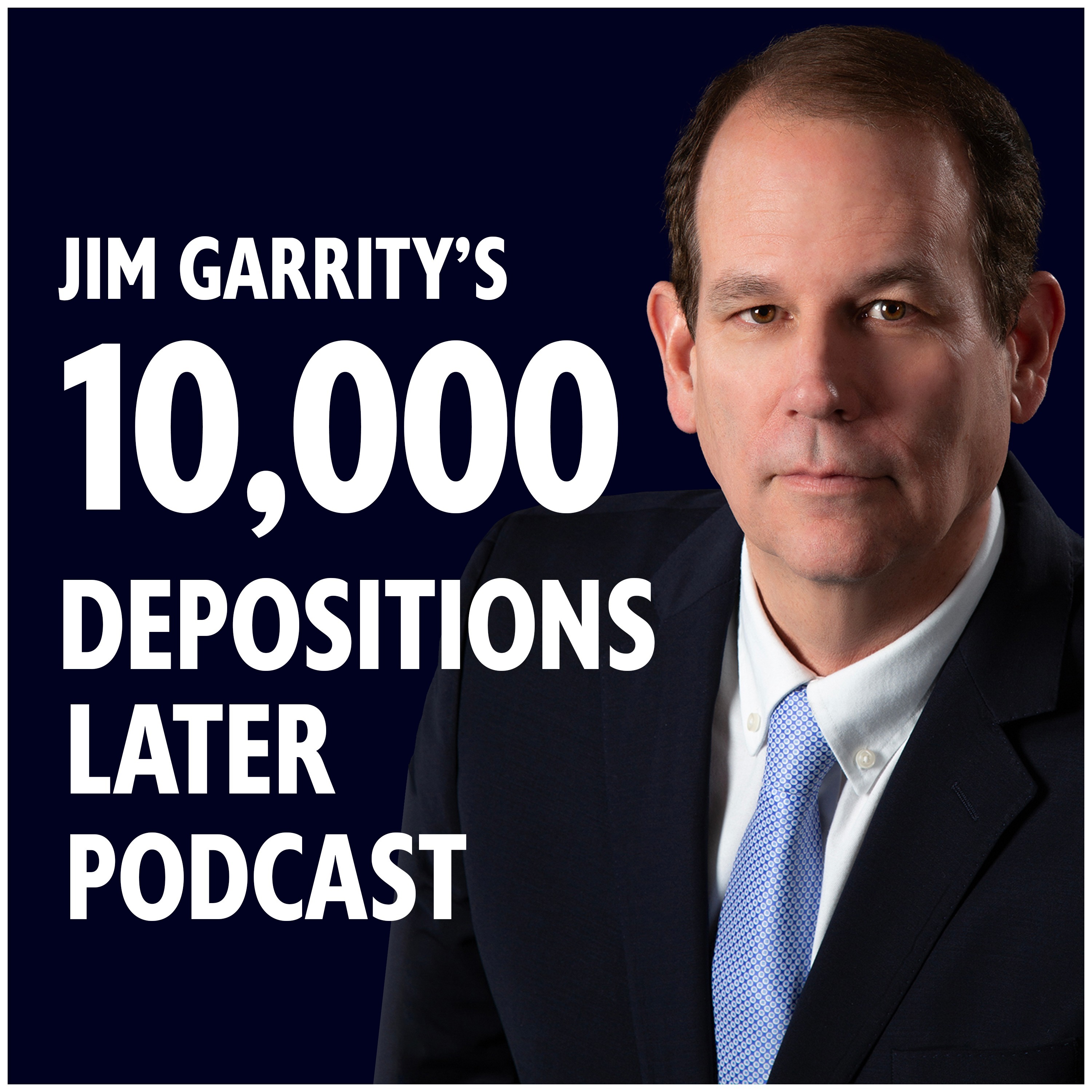
10,000 Depositions Later PodcastEpisode 19 - Lessons from the Front Lines: 922 Deposition Objections. (Then Sanctions Happened.)In a November 30, 2020 Memorandum Order, a federal judge imposed sanctions against a lawyer for alleged excessive and improper objections during depositions. According to the Order, the defense attorney was accused of making 565 objections in one deposition, 187 in another, and 170 in a third, for a total of 922 in just those three. In this episode, Jim Garrity discusses the case and shares his thoughts about how many speaking or coaching objections you should tolerate before taking steps to talk it. (Hint: He says less than five.)This episode is based on the Memorandum Order in Animal...
2020-12-0312 min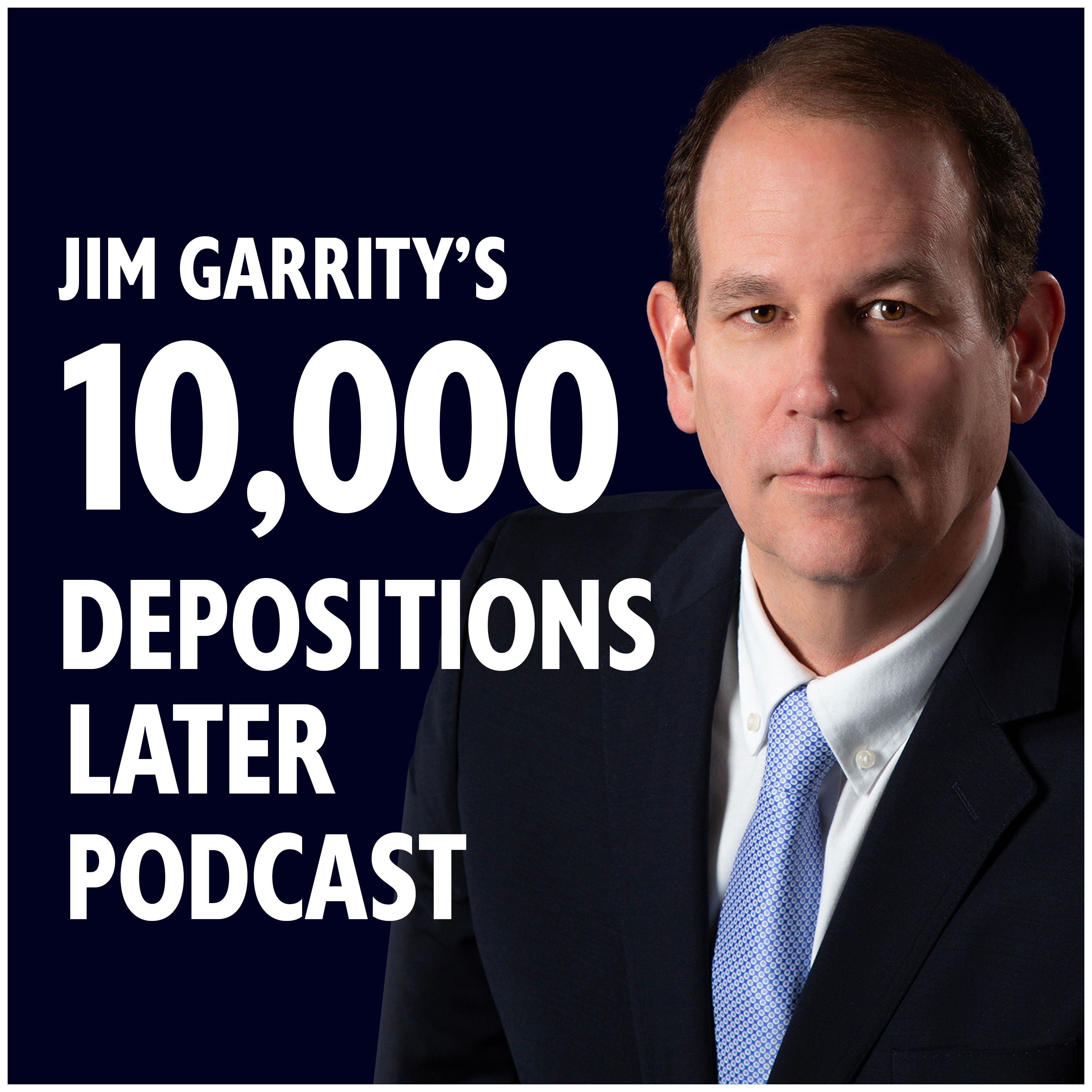
10,000 Depositions Later PodcastEpisode 18 - The New Change to FRCP 30(b)(6), Effective December 1, 2020Federal Rule of Civil Procedure 30(b)(6) - the subsection that allows you to compel an organization to produce a representative who can testify knowledgeably about topics you selected - has just been amended. Effective today, December 1, 2020, litigators are now required to confer about the matters for examination, and must do so either (a) before the deposition is noticed (or subpoena served), or (b) promptly after issuance of the notice or subpoena. Jim Garrity explains the change to the rule, and offers several excellent tips for conducting the conferral.
2020-12-0210 min
10,000 Depositions Later PodcastEpisode 17 - Can You Ask the Same Questions In Depositions That You Just Asked (And Got Answers To) In Interrogatories?Courts have been ruling on the question for years: Is it proper to ask the same questions in depositions that you just asked (and received answers to) in interrogatories? In this episode Jim Garrity definitively answers the query, and provides practical guidance for you.This podcast is based on the best-selling 450-page field guide, 10,000 Depositions Later: The Premier Litigation Guide for Superior Deposition Practice, now in its 3d edition. Buy it on Amazon, or just about anywhere else you buy your practice materials.Cases cited in this episode:
2020-11-3015 min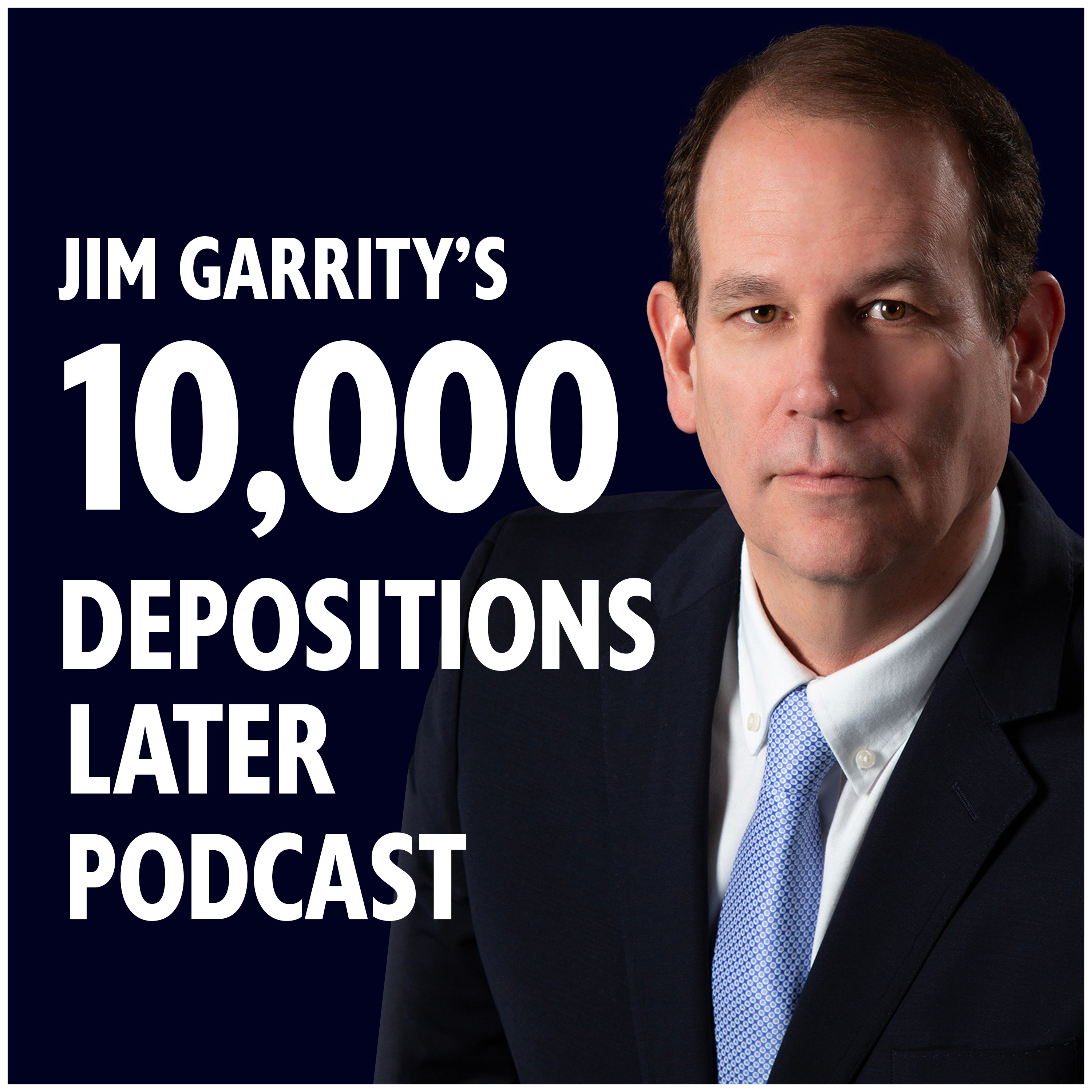
10,000 Depositions Later PodcastEpisode 16 - Contesting Excessive Expert Deposition FeesWhat to do when you reach out to schedule an opponent's expert witnesses for deposition, and are told that you've got to pay the experts an outrageous hourly-rate or flat-rate fee (in advance) before they'll appear? In this episode, Jim Garrity reviews an excellent November 18, 2020 court ruling on the issue, and offers tips for combating this discovery obstacle.
2020-11-2317 min
10,000 Depositions Later PodcastEpisode 15 - Remote Deposition Protocols for COVID and BeyondTired of fighting over protocols for your remote depositions? We've got the solution. In this episode, Jim Garrity discusses a fourteen-page list of protocols negotiated between some of the best lawyers in the world, and then adopted by a highly-respected federal judge. It's a great model to use in developing remote deposition procedures in your own cases. We'll also tell how to find and download the order.
2020-11-1804 min
10,000 Depositions Later PodcastEpisode 14 - Lessons from the Front Lines: Asked and Answered ObjectionsA November 10, 2020 Discovery Order from a California federal judge says "asked and answered" objections are improper speaking objections. Jim Garrity says the ruling is clearly wrong, because "asked and answered" is a proper form objection with origins in at least two federal rules of evidence (403 and 611). Listen to Garrity's analysis of the ruling and the rules.
2020-11-1310 min
10,000 Depositions Later PodcastEpisode 13 - The Real Reason to Cross-Notice A DepositionShould you cross-notice depositions set by another lawyer? How does cross-noticing benefit you? What's the chief reason you ought to cross-notice a deposition? We give you the scoop on this technical move, and tell you when it really serves its purpose. Don't miss the expert insights from national deposition expert Jim Garrity.
2020-11-1123 min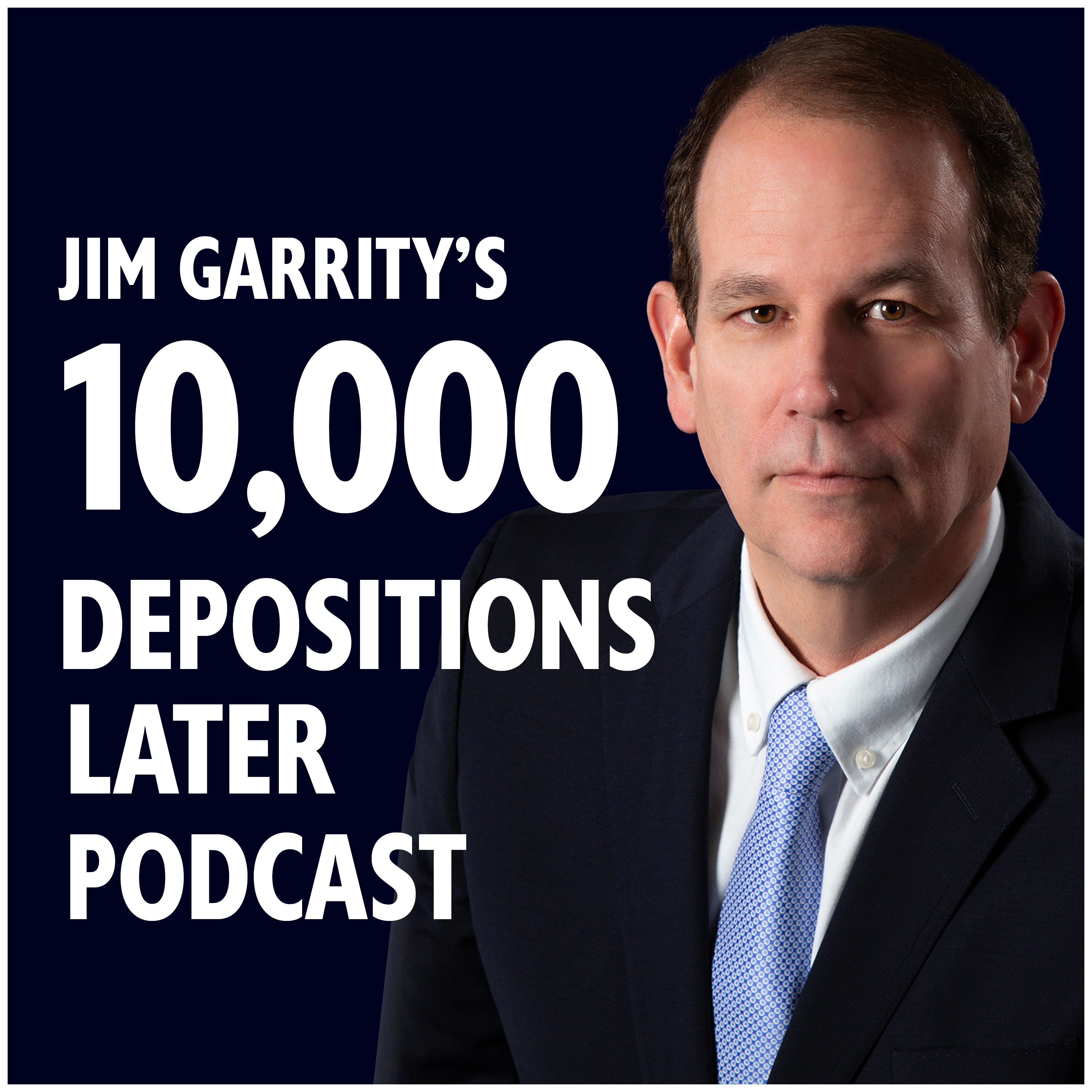
10,000 Depositions Later PodcastEpisode 12 - What's the Right Way to Make Form Objections?You're defending a deposition, and the form of the examining lawyer's questions are improper. What's the correct way to make your form objection? Is it just saying the word "Form"? Or, must you also state the legal basis for your form objection, such as "Form, leading?" Many courts have said that if your objection isn't properly asserted, you've waived it. So, which is it? In this episode, Jim Garrity tells you what courts have said, and he offers practical tips for making sure your objections stick. It's a critical lesson for litigators.SHOW NOTES:This...
2020-11-0723 min
10,000 Depositions Later PodcastEpisode 7 - Audiotaping your DepositionsAre you independently audiotaping all your depositions? (We know you're not.) But why aren't you? Listen as Jim Garrity explains why you should routinely audiotape depositions, apart from stenographic or other means, and provides case authority and specific federal rule citations. Garrity argues that having an independent audiotape of deposition testimony is an incredibly powerful tool, widely overlooked by almost all litigators. A must-listen.
2020-10-2915 min